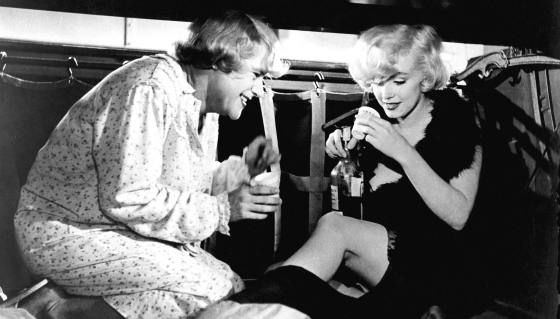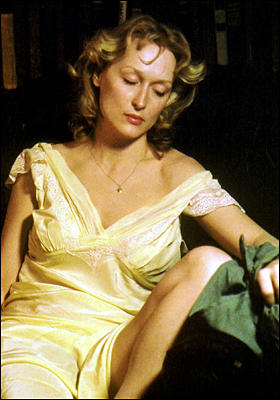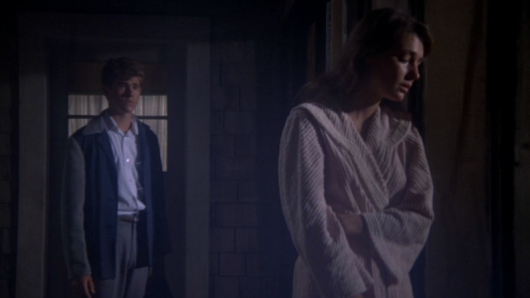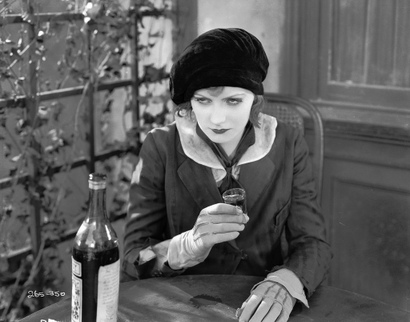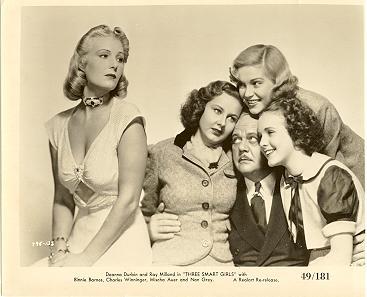The Saint Series...starring George Sanders
The Saint Strikes Back***1/2 1939
http://en.wikipedia.org/wiki/The_Saint_Strikes_Back
http://veehd.com/video/4720004_The-Saint-Strikes-Back--1939
The Saint in London**** 1939
http://en.wikipedia.org/wiki/The_Saint_in_London
http://www.youtube.com/watch?v=lD4F4KU04N4
The Saint's Double Trouble***1/2 1940
http://en.wikipedia.org/wiki/The_Saint's_Double_Trouble
http://www.bbc.co.uk/programmes/b01lb30g
The Saint Takes Over**** 1940
http://en.wikipedia.org/wiki/The_Saint's_Double_Trouble
http://veehd.com/video/4720765_The-Saint-Takes-Over--1940
The Saint in Palm Springs***1/2 1941
http://en.wikipedia.org/wiki/The_Saint_in_Palm_Springs
http://archive.org/details/TheSaintInPalmSprings1941
The Saint (film series) refers to eight B movies made by RKO Pictures between 1938 and 1941, based on some of the books in British author Leslie
Charteris' long-running series about the fictional character Simon Templar, better known as The Saint.
A few years after creating the character in 1928, Charteris was successful in getting RKO Radio Pictures interested in a film based on one of his
books. The first, The Saint in New York, came in 1938 and was based on the 1935 novel of the same name. It starred Louis Hayward as Simon
Templar and Jonathan Hale as Inspector Henry Farnack, the American counterpart to the British character, Chief inspector Claud Eustace Teal.
The film was a success and seven more films followed rapidly. They were sometimes based upon outlines by Charteris, while others were based
loosely on his novels or novellas. George Sanders took over from Hayward as The Saint in the second film, and starred in a further four between 1939
and 1941, before being enticed by RKO to play the lead in their forthcoming series about The Falcon, which they made into a blatant copy of The
Saint.
In 1941, Hugh Sinclair took over the role as Templar for two more films; The Saint's Vacation and The Saint Meets the Tiger. However, by the time
shooting finished of The Saint Meets the Tiger in June 1941, a major dispute ensued between Charteris and RKO over the upcoming first film in The
Falcon series, The Gay Falcon, which was due for release in October 1941. Charteris argued that it was a case of copyright infringement, as RKO's
version of The Falcon was an obvious copy of his own character, and the fact that the actor who personified The Saint after having played him in five
of the seven films released up to that point, made this even more obvious.[1]
The legal disputed forced RKO to put the film on hold. The conflict wasn't settled until 1943, with RKO selling the US distribution rights to Republic
Pictures, while RKO's British arm handled the UK distribution as originally planned. The film was released in both countries in 1943.[1]
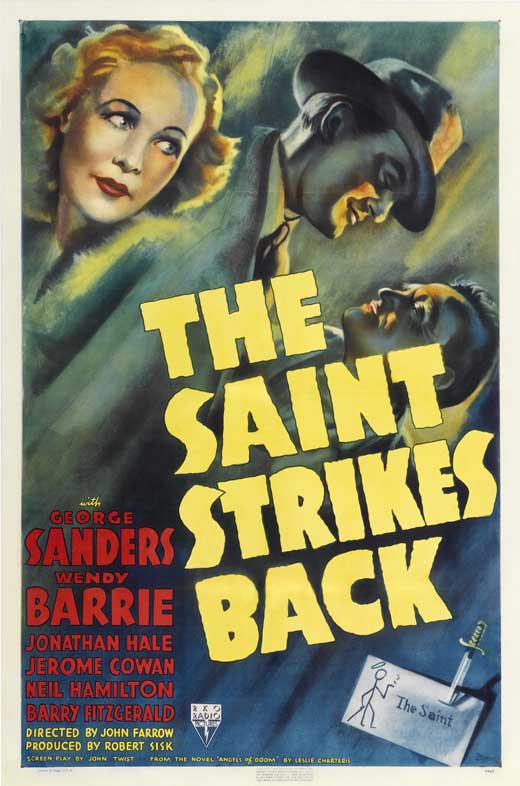
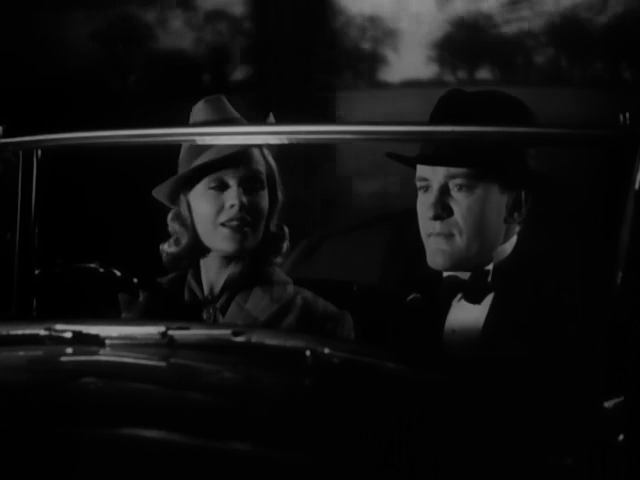
Above: The Saint in London, with Sally Grey

Above: The Saint's Double Trouble
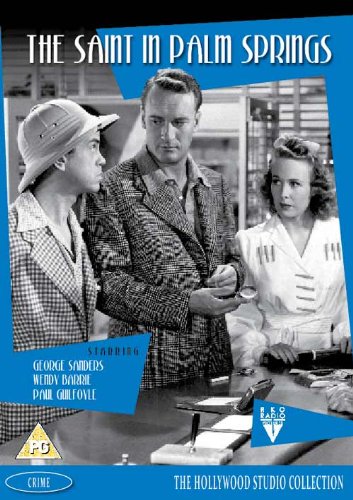
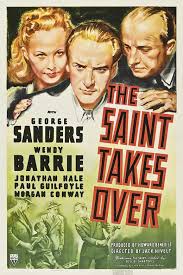
Sandpiper, The***1/2 1965
http://en.wikipedia.org/wiki/The_Sandpiper
This film was very much neglected on my part. Many times it appeared on the TV schedule but I chose not to view it. Recently I felt
impelled to view it and I was glad I did. I have been viewing Elizabeth Taylor films with a renewed vigour as I have done her injustice
in the past. This might be a result of her performance in Cleopatra, which was almost laughable. Taylor as Laura Reynolds, was a
free-spirit, rather simplistic, but very poignant in representing that spirit. She was a loveable heroine, played with ease a total lack
of self-consciousness. It was Taylor's extremely low-key performance that set the film aglow,and demonstrated her natural performing
ability. The simple plot, and possibly even tire plot; the husband, who in "finding himself" has an affair which he cannot resist, and his
life is unexpectedly re-inspired. Laura's Bohemian lifestyle is illustrated somewhat comically, and it is in accordance with this portrayal
that the rather sophisticated Dr. (Reverend) Hewitt breaks in on these festivities to visit his new found love. The response of the main
characters to the complications are depicted with a soft realism, the Doctors wife (played by the impeccable Eva Marie Saint) being initially
angered, and then uncertain. The Doctor realizes that he has lost both his loves, one out of impracticability and the other demanding his
patience. Laura is left with her art and son, which is what she feels is her fate as she has made the choices in life to be on the perimeter,
although she is over-shadowed in doubt because of her love for Dr. Hewitt.
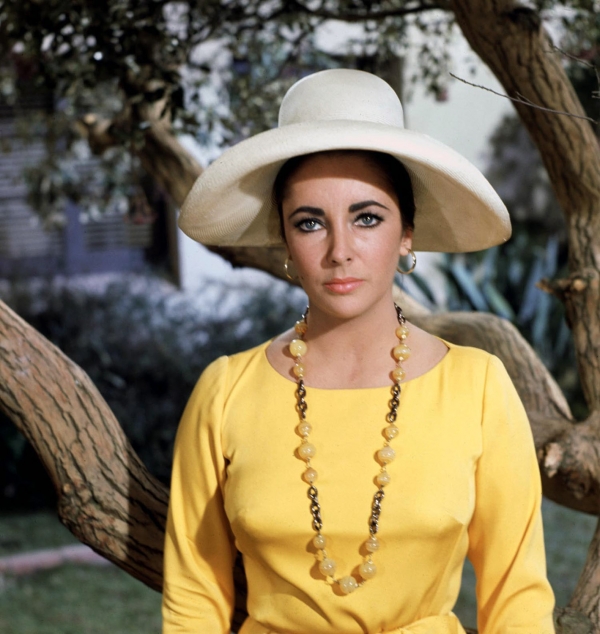
Twenty-something Laura Reynolds is a free spirit who questions social conventions, laws and regulations. A struggling artist, she lives in a
secluded beach-side cabin in Big Sur with her nine year old illegitimate son, Danny, on who she has instilled her values. Because of this questioning
of convention, Laura has decided to home school Danny. Also because of this questioning of the law, Danny runs into some legal problems,
and as such is court ordered to be sent to San Simeon, a Christian school in Monterrey. This order is against Laura's wishes. The school's
headmaster is Dr. Rev. Edward Hewitt, who tries to convince Laura that San Simeon is not the prison she probably believes it to be. Married
for twenty-one years to his faithful wife Claire, Edward has become more a fund-raiser at all cost (for a new chapel) rather than an educator or
priest. Despite their differences, Laura and Edward begin to fall for each other. Both but especially Edward have to reconcile their feelings for
each other to their beliefs, which they learn are closer to each other than what may appear on the surface. Their feelings also bring to the forefront
what each really wants in life beyond their current lot. Written by Huggo
Sante Fe Trail***1/2 1940
http://www.lewrockwell.com/jarvis/jarvis80.html
VIDEO
http://www.tcm.com/mediaroom/video/31141/Santa-Fe-Trail-Original-Trailer-.html
http://archive.org/details/Santa_Fe_Trail_movie
The film purports to follow the life of J.E.B. Stuart (Errol Flynn) before the outbreak of theAmerican Civil War. Among its sub-plots
are a romance with the fictional Kit Carson Holliday (Olivia de Havilland), friendship with George Armstrong Custer (Ronald Reagan),
and battles against abolitionist John Brown (Raymond Massey).
The movie significantly differs from the actual details of Stuart's life. For instance, Stuart is depicted as having been classmates at
West Point Academy with Custer and others, who on graduation were appointed to Fort Leavenworth, Kansas. In reality, Custer
was admitted to West Point in 1858, four years after Stuart graduated in 1854. Custer graduated in 1861 after the Civil War had
begun. A later scene in Kansas, where an Indian woman predicts the future, suggests that these West Point officers, once friends,
would be divided against each other in a conflagration unimaginable. They laugh uncomfortably at such a prospect. The
conflagration foretold, of course, is the impending Civil War, yet to begin.
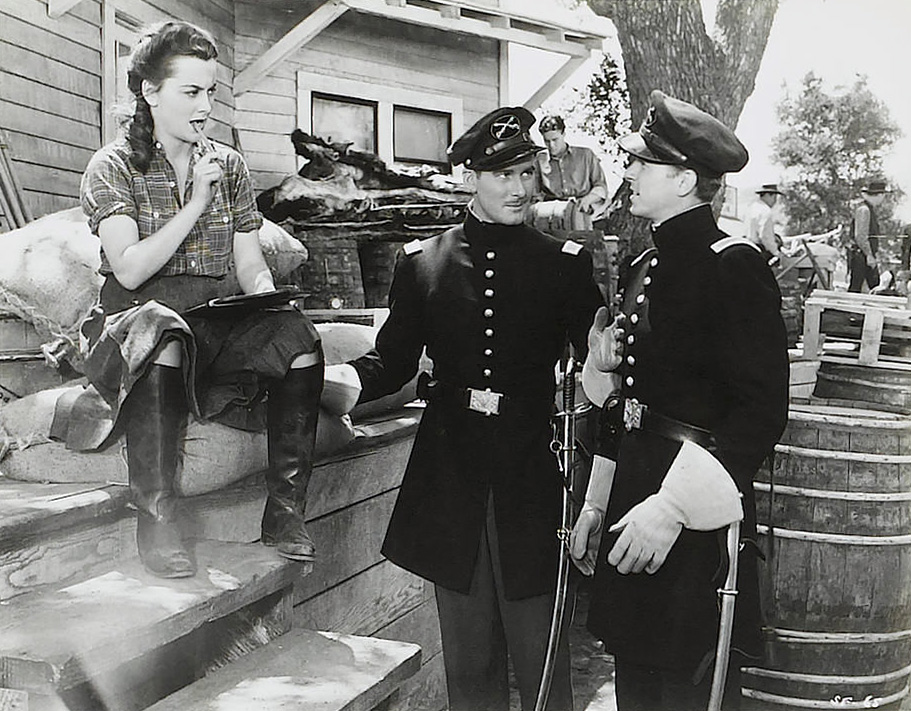
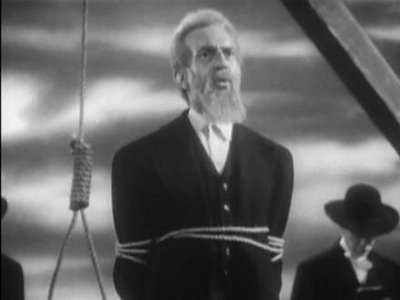
Saturday Night and Sunday Morning**** 1960
VIDEO
http://www.youtube.com/watch?v=P9Ms04cAkws
http://en.wikipedia.org/wiki/Saturday_Night_and_Sunday_Morning_(film)
Arthur Seaton is a 22-year-old factory worker in Nottingham, a sprawling industrial city in the British Midlands. All week long he
works hard at his lathe, asking and expecting nothing more than his weekly pay; but on Saturday evenings he asserts his
independence by drinking, brawling, and playing practical jokes at the local pub. Saturday nights he spends with Brenda, the wife of
a fellow worker. He is also involved with Doreen, a girl with rigid ideas on sex and marriage. Brenda becomes pregnant, and Arthur
takes her to his Aunt Ada in hopes of procuring an abortion, but without success. Arthur dutifully offers to marry Brenda, but she
senses that their affair is over and decides to have the baby and accept the consequences. Eventually, her husband, Jack, learns of
the affair; and his soldier brother and a friend waylay Arthur at a fair and beat him into senselessness. But this punishment Arthur
accepts as part of life, and a week later he returns to his job. His attitude toward marriage has changed, however, and he agrees to
marry Doreen and move into a new housing development. He warns her, nevertheless, that he has not yet lost his independence.
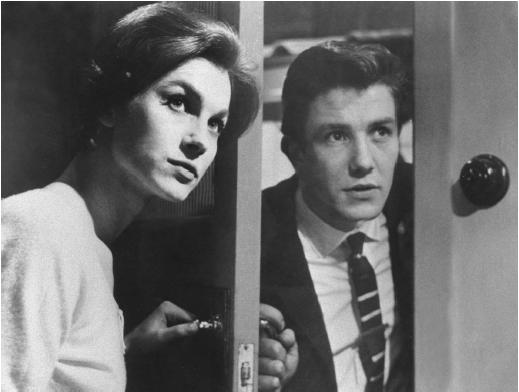
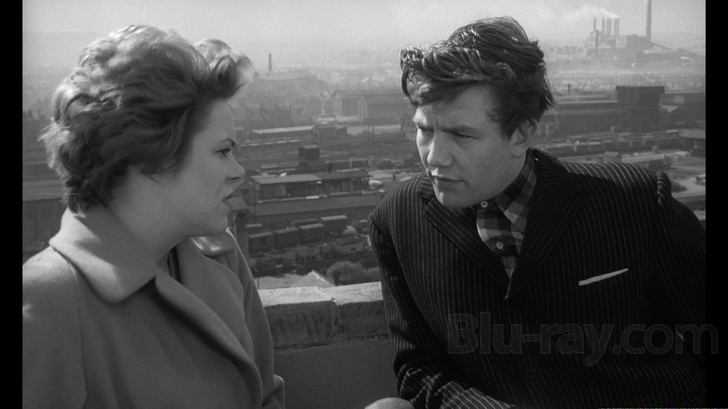
Scaramouche**** 1923
A meticulous film, very sordid in mood and atmosphere. Lewis Stone is perfectly sullen and vicious as the
Marquis and Ramon Navarro is swashbuckling as Moreau. Their is a taste of Romeo and Juliet with the
star-crossed theme and the array of ludicrous characters.
http://www.moviediva.com/MD_root/reviewpages/MDScaramouche.htm
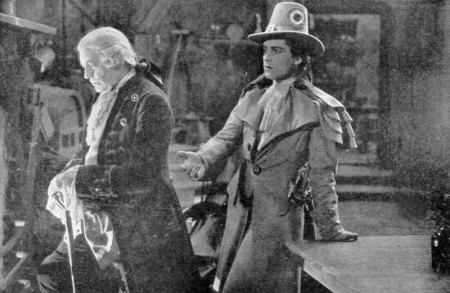
Scarlet Empress, The**** 1934
http://www.imagesjournal.com/issue10/reviews/scarletempress/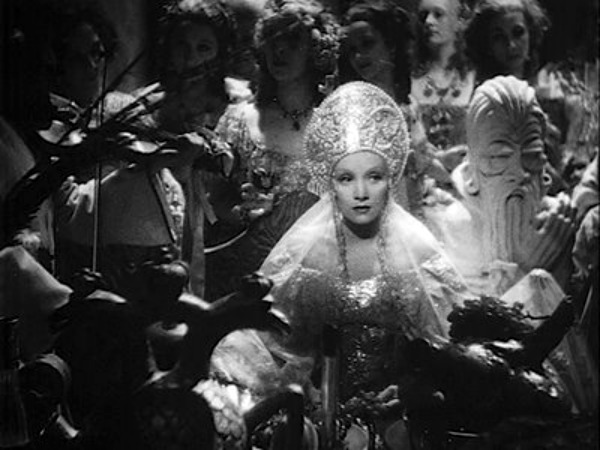
The young German princess Sophia Frederica is chosen by Queen Elizabeth of Russia to marry her nephew, the "royal halfwit"
Peter, in order to provide a sane male heir to the throne. Elizabeth changes Sophia's name to Catherine and, following the
wedding, Peter tells the queen he hates his wife. When the marriage remains unconsummated, Catherine is blamed. Meanwhile,
the debonair Count Alexei pursues Catherine and gives her a locket that contains his picture. The queen discovers their
rendezvous, however, and demands that Catherine not leave her sight. That night, Catherine discovers Alexei is the queen's
lover and throws his locket out her window, but in remorse goes out into the snowy night to find it. There she meets Lieutenant
Dmitri, a guard, who does not recognize her. In an act of vengeance, Catherine makes love with him and becomes pregnant.
When she gives birth to a boy, Catherine satisfies the queen, but Peter knows the child is not his and his hatred for Catherine
grows. When the queen dies, Peter becomes czar and begins a reign of terror, torturing and murdering thousands of Russians.
By befriending much of the royal army through her feminine wiles, Catherine builds her defense against the increasingly insane
Peter. When Peter has Catherine arrested in order to bring his mistress to the throne, Catherine escapes and, with the help of
General Orloff, storms the palace, after which Orloff murders Peter.
Scarlet Pimpernel***** 1934
http://en.wikipedia.org/wiki/The_Scarlet_Pimpernel_(1934_film)
VIDEO
http://www.tcm.com/mediaroom/video/253786/Scarlet-Pimpernel-The-Movie-Clip-Lady-Blakeney.html
Full movie: http://www.youtube.com/watch?v=ku_voNMo9Z0
Leslie Howard's performance in the title role is not only up to the Howard standard, but so fine that an extraordinary production job was required to prevent this from being a monolog film.
As the Scarlet Pimpernel, an English nobleman who seeks to rescue the aristocrats of France from Robespierre's guillotine, Howard essays what amounts to a dual role. At home a foppish, affected clotheshorse; abroad, a gallant adventurer playing a dangerous game.
With the story in his favor, Howard has the acting edge all the way, so it was only by their own efforts that the supporting players could stand out. As Chauvelin, the villain of the piece, Raymond Massey turns in a gem of a performance.
Co-starred with Howard is Merle Oberon, the slant-eyed knockout. Portraying Lady Blakeley, a tragic young woman who nearly betrays her husband, Oberon is confined by script limitations to sad moments only.
Enough of Baroness Orczy's novel is retained to make the picture plot recognizable to the book readers.
Contact Variety Staff at news@variety.com
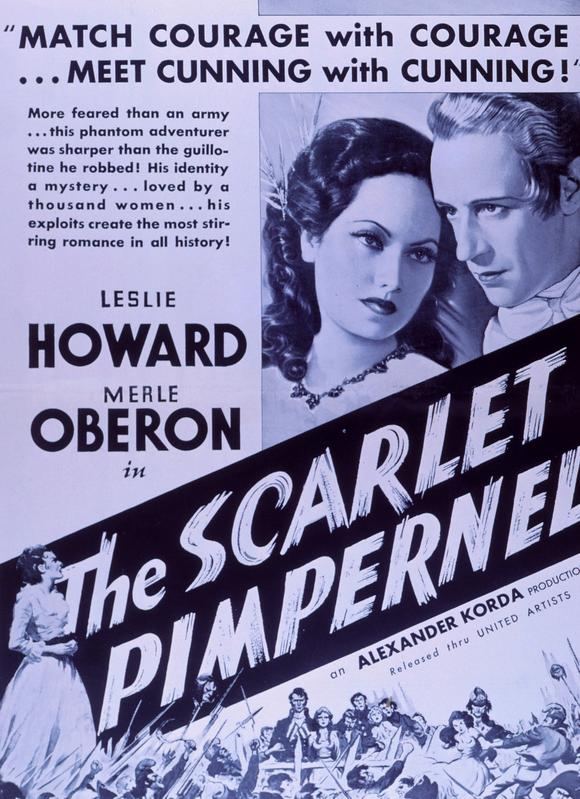
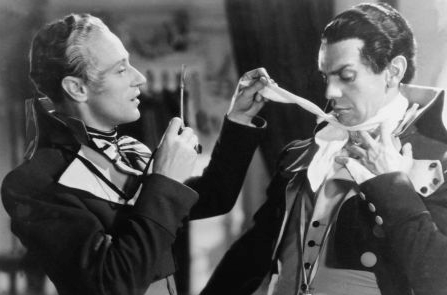
Schindler's List****1/2 1993
http://www.auschwitz.dk/schindlerslist.htm
http://www.historyinfilm.com/schnlist/
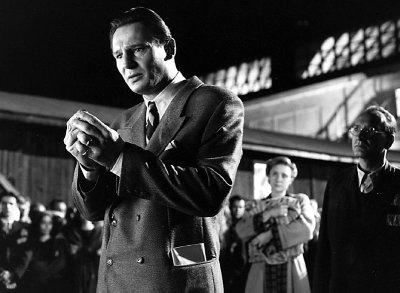
Amon Göth (Ralph Fiennes) arrives in Krakow to initiate construction of a labor camp nearby, Paszów. The SS soon clears the
"Schindler's List" comprises these "skilled" inmates, and for many of those in Paszów camp, being included means the difference
As a German Nazi and self-described "profiteer of slave labor," Schindler must flee the oncoming Soviet Red Army. After
Secret Garden, The***1/2 1949
http://en.wikipedia.org/wiki/The_Secret_Garden_%281949_film%29

The oft-filmed Frances Hodgson Burnett novel The Secret Garden was given the usual plush MGM treatment in 1949.
Tempestuous orphan girl Mary Lennox (Margaret O'Brien) is sent to live with her reclusive, long-widowed uncle Archibald Craven
(Herbert Marshall). The embittered Craven has an invalid son named Colin (Dean Stockwell), with whom the troublesome Mary
constantly clashes. Her only real friend is neighbor-boy Dickon (Brian Roper). Things soon change after Mary discovers the key
to the Craven household's garden, which has been locked up and neglected since the death of Craven's wife. Through the
influence of the Secret Garden, Mary learns to think of others rather than herself, Craven drops his curmudgeonly veneer, and
Colin's health slowly but steadily improves. In the tradition of The Wizard of Oz, the sequences taking place in the Secret Garden
are lensed in Technicolor. ~ Hal Erickson, Rovi
Secrets & Lie**** 1996
http://en.wikipedia.org/wiki/Secrets_%26_Lies_(film)
VIDEO
http://www.youtube.com/watch?v=zO3nowjNT7g
A family is forced to confront the personal issues they've been avoiding for years in this powerful, realistic drama. Cynthia (Brenda Blethyn)
is a working-class British woman whose life has been a long series of painful disappointments. She's single with no romantic prospects
and a dead-end job at a box factory. Her daughter Roxanne (Claire Rushbrook) works as a street sweeper and is chronically bitter. Cynthia
helped raise her brother, Maurice (Timothy Spall), who is doing well as a photographer, but she rarely sees him and usually blames his
wife, Monica (Phyllis Logan). One day, Cynthia receives a phone call from a woman named Hortense (Marianne Jean-Baptiste), who claims
to be the daughter Cynthia put up for adoption years ago. Cynthia initially reacts with panic, but she agrees to meet Hortense and is
surprised to discover that she's a successful and soft-spoken eye doctor -- and that she's black. Cynthia is soon convinced that Hortense
is just who she claims to be, and they quickly form a friendship that gives Cynthia a new source of emotional strength. However, when
Cynthia decides to introduce the family to her new "friend," it forces them to confront the lies and evasions that have kept them apart all
these years. Largely improvised by director Mike Leigh and his cast, Secrets & Lies features standout work by Brenda Blethyn (who earned
an Academy Award nomination as Best Actress), Marianne Jean-Baptiste (who was nominated as Best Supporting Actress), and Timothy
Spall. ~ Mark Deming, Rovi
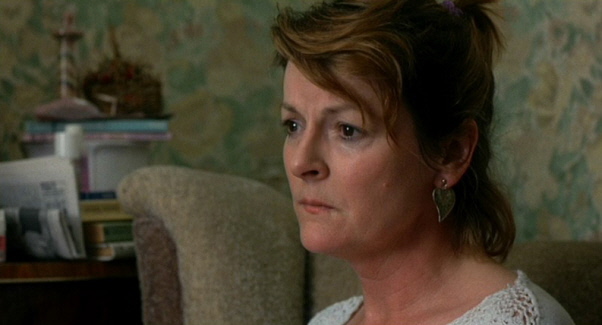
Selena**** 1997
http://en.wikipedia.org/wiki/Selena_(film)
http://www.youtube.com/watch?v=KP6NiAxPVZc
Selena Quintanilla was a major figure in Tejano music, a Grammy-winning recording artist, a beloved star in the American Southwest
and Mexico, and seemed poised to cross over into mainstream popularity on the U.S. pop charts when she was murdered on March 31, 1995
by the president of her fan club. Written and directed by Gregory Nava, this biopic concentrates on Selena's relationship with her family and
her rise to fame, dealing only briefly with her tragic death. Abraham Quintanilla (Edward James Olmos) is a veteran musician who leads a
family-based singing group, The Dinos. At a young age, he notices that his daughter Selena (played as a child by Becky Lee Meza) has a
strong singing voice, and he works her into the act (her big number is a version of Over the Rainbow). However, as she grows older, Selena
(played as an adult by Jennifer Lopez) wants to establish her own musical identity; while her heritage is Mexican-American, her primary
language is English, and her favorite artists are American pop acts like Donna Summer. While Selena and Abraham sometimes argue
about the musical direction of the group, he always respects and supports her talent, and her blend of Tejano roots music and danceable
pop rhythms soon sparks a revolution in Latin music. Selena later earns the wrath of her father when she becomes romantically involved
with Chris Perez (Jon Seda), a rebellious and long-haired guitarist hired to play with the group, but when they elope and Selena convinces
Abraham that their love is sincere, Chris is welcomed into the family. After a long string of successes on the Latin charts and playing to a
sellout crowd at the Houston Astrodome and a crowd of 100,000 at a stadium in Monterey, Mexico, Selena begins recording her first album
in English, which is expected to make her a mainstream star on the level of Whitney Houston or Gloria Estefan. However, the fates decreed
it was an album she would never complete. Selena was produced with the participation of the Quintanilla Family (Abraham was executive
producer), and Selena's own recordings were used on the soundtrack. ~ Mark Deming, Rovi



Sense and Sensibility**** 1995
http://bostonreview.net/BR21.1/stone.html
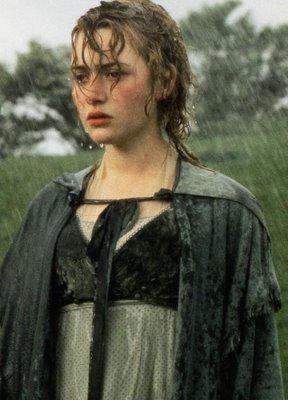
When Mr. Dashwood dies, his wife and three daughters – Elinor, Marianne and Margaret – are dismayed to learn that their
inheritance consists of only £500 a year, with the bulk of the estate of Norland Park left to his son John from a previous
marriage. John's scheming, greedy, snobbish wife Fanny immediately installs herself and her spouse in the palatial home and
invites her brother Edward Ferrars to stay with them. She frets about the budding friendship between Edward and Elinor and
does everything she can to prevent it from developing.
Sir John Middleton, a cousin of the widowed Mrs. Dashwood, offers her a small cottage house on his estate, Barton Park in
Devonshire. She and her daughters move in. It is here that Marianne meets the older Colonel Brandon, who falls in love with her
at first sight. Competing with him for her affections is the dashing but deceitful John Willoughby, who steals Marianne’s heart.
Unbeknownst to the Dashwood family, Brandon’s ward is found to be pregnant with Willoughby’s child, and Willoughby’s aunt
Lady Allen disinherits him. He moves to London, leaving Marianne heartbroken.
Sir John’s mother-in-law, Mrs. Jennings, invites her daughter and son-in-law, Mr. and Mrs. Palmer, to visit. They bring with
them the impoverished Lucy Steele. Lucy confides in Elinor that she and Edward have been engaged secretly for five years, thus
dashing Elinor’s hopes of romance with him. Mrs. Jennings takes Lucy, Elinor, and Marianne to London, where they meet
Willoughby at a ball. They learn that he is engaged to the extremely wealthy Miss Grey; and the clandestine engagement of
Edward and Lucy comes to light. Edward’s mother demands that he break off the engagement. When he refuses, his fortune is
taken from him and given to his younger brother Robert.
On their way home to Devonshire, Elinor and Marianne stop for the night at the country estate of the Palmers, who live near
Willoughby. Marianne cannot resist going to see his estate and walks five miles in a torrential rain to do so. As a result, she
becomes seriously ill and is nursed back to health by Elinor after being rescued by Colonel Brandon.
After Marianne recovers, the sisters return home. They learn that Miss Steele has become Mrs. Ferrars and assume that she is
married to Edward. However, he arrives to explain that Miss Steele has unexpectedly wed Robert Ferrars and is thus released
from his engagement. Edward proposes to Elinor and becomes a vicar, while Marianne falls in love with and marries Colonel
Brandon.
Seven Days In May****1/2 1964
http://en.wikipedia.org/wiki/Seven_Days_in_May
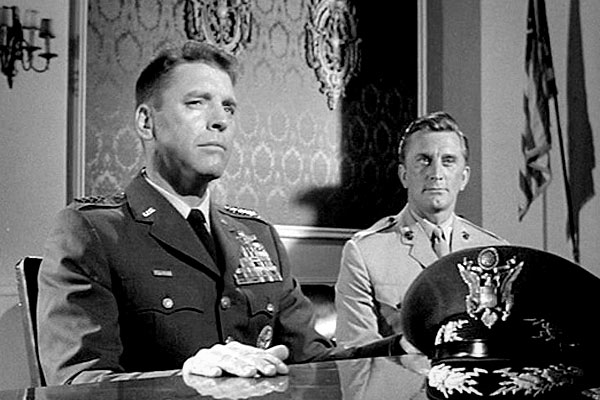
At the height of the cold war, a weakened President and a popular four-star general face off in a battle for control of the US
government. President Jordan Lyman has successfully negotiated an arms reduction treaty with the Soviet Union, but his
measure is unpopular and does not sit well with General James Mattoon Scott, the Chairman of the Joint Chiefs of Staff who
has been quite vocal in his opposition. Marine Corps Col. Jiggs Casey, who works for Scott, comes to the conclusion that senior
military officers are plotting a coup to overthrow the government. Working with a small circle of reliable and loyal officials,
President Lyman tries to get the evidence of Scott's treachery and stop him. Written by garykmcd
Seven Year Itch, The****1/2 1955
http://www.moviediva.com/MD_root/reviewpages/MDSevenYearItch.htm
http://www.phrases.org.uk/meanings/seven-year-itch.html
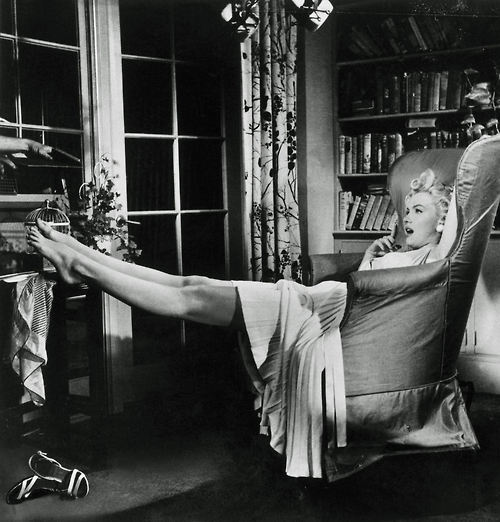
The Seven Year Itch (1955) is a delightful, sophisticated and witty farce, using to the fullest extent the mordant humor of
director Billy Wilder on the subject of sex. The 'seven year itch' refers to the urge to be unfaithful after seven years of
matrimony, with a desire to satisfy one's sexual urges ('itches').
It was adapted from a Broadway play of the same name by George Axelrod, with Tom Ewell reprising his Broadway role (although
on stage, Ewell had played opposite Vanessa Brown instead of the alluring MM). The film's entire story was an elaboration of the
first scene in Wilder's directorial debut film The Major and the Minor (1942). Although the play was about an actual
consummated affair, it was modified due to the Hays Code in force at the time, and many of the best lines from the play were
cut.
The entertaining film is best known for the definitive performance of the radiant Marilyn Monroe with a little girl's giggly voice
(her 23rd film) - basically portraying herself as a blonde bombshell, and known simply as The Girl. The film's promotional tease
photographs packaged her as the sexually-endowed girl next door - an ideal fantasy figure. In the film, one indeed wonders
whether Marilyn Monroe's character is an actual person or rather the living embodiment of the urban executive's wild
imagination - a fantasy.
Shadow of a Doubt****1/2 1943
http://www.filmsite.org/shad.html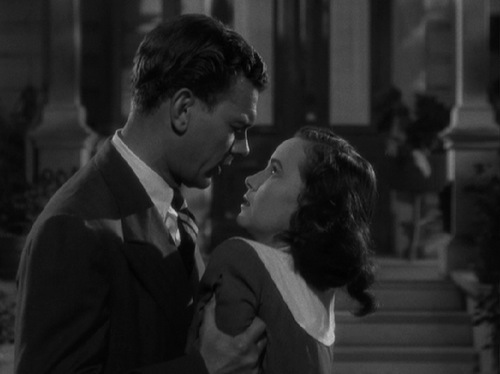
A bored teenager living in Santa Rosa, California, Charlotte "Charlie" Newton (Wright), is frustrated because nothing seems to
be happening in her life and that of her family. Then, she receives wonderful news: her uncle (for whom she was named),
Charlie Oakley (Cotten), her mother's brother, is arriving for a visit.
Two men show up pretending to be photographers and journalists working on a national survey of the average American family.
One of them speaks to Charlie privately, identifying himself as Detective Jack Graham (Macdonald Carey) and telling her that
her uncle is one of two men who are suspected of being a serial killer known as the "Merry Widow Murderer". This murderer has
a modus operandi of seducing, murdering and robbing wealthy widows.
Young Charlie at first refuses to even consider that her uncle could be a murderer, but she cannot help noticing him acting
strangely on several occasions. She confirms her suspicions after seeing the initials on the engraving on the ring Uncle Charlie
gave her match one of the recent victims of the killer. Particularly chilling is a family dinner conversation during which Uncle
Charlie reveals his hatred of rich widows, comparing them to fat animals deserving of slaughter.
Young Charlie's growing suspicion soon becomes apparent to her uncle. He confronts her and admits that he is indeed the man
the police are after. He begs her for help; she reluctantly agrees not to say anything, as long as he leaves soon, to avoid a
horrible scandal in the town that would destroy her family, especially her mother, who idolizes her younger brother.
Then news breaks that the second suspect was killed fleeing from the police in Portland, Maine, and is assumed to have been
the guilty one. The detective Graham leaves after telling Young Charlie that he loves her and would like to marry her someday.
Uncle Charlie is delighted at first, until he remembers that Young Charlie fully knows his secret. Soon, the young woman has a
couple of near fatal "accidents", falling down some very steep stairs at her home, and being trapped in a closed garage with a
car spewing exhaust fumes.
Uncle Charlie soon announces that he is leaving by train for San Francisco, following what is presumably his next victim. As he
departs, he contrives for young Charlie to stay on board, planning to kill her by pushing her off as soon as the train gets up to
speed. Instead, in the ensuing struggle between them, he falls into the path of an oncoming train. At his funeral Uncle Charlie
is highly honored by the townspeople of Santa Rosa, who know nothing of his crimes. Jack has come back to comfort Charlie;
she tells him she had withheld from him information about her uncle which would have confirmed him as the murderer, but
Jack already knows and accepts that, realizing her difficult situation. They become a couple, and resolve to keep Uncle Charlie's
crimes a secret.
Shakepeare In Love**** 1998
http://www.cinetropic.com/shakespeare/
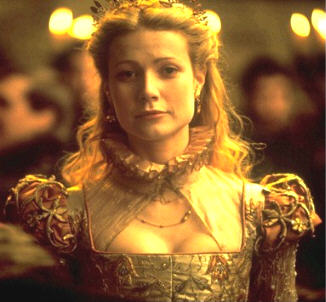
William Shakespeare (Joseph Fiennes) is a poor playwright for Philip Henslowe (Geoffrey Rush), owner of The Rose Theatre, in
1593 London. After learning that his love was cheating on him with his patron, Shakespeare burns his new comedy, Romeo and
Ethel, the Pirate's Daughter, rewriting it as the tragedy Romeo and Juliet. Suffering from writer's block, he is unable to
complete the play, but begins auditions for Romeo. A young man named Thomas Kent is cast in the role after impressing
Shakespeare with his performance and his love of Shakespeare's previous work. Kent is actually Viola de Lesseps (Gwyneth
Paltrow), the daughter of a wealthy merchant who desires to act, but women are banned from the stage and she must disguise
herself.
After Shakespeare discovers his star's true identity, he and de Lesseps begin a passionate secret affair. Inspired by her,
Shakespeare writes quickly, and benefits from the advice of playwright and friendly rival Christopher 'Kit' Marlowe (Rupert
Everett). Shakespeare and de Lesseps know, however, that their romance is doomed. He is married, albeit long separated from
his wife, while de Lesseps' parents have arranged her betrothal to Lord Wessex (Colin Firth), an aristocrat who needs money.
When de Lesseps is summoned to the court of Queen Elizabeth I (Judi Dench), Shakespeare dons a woman's disguise to
accompany her as her cousin. At court, he persuades Wessex to bet £50 that a play cannot capture the nature of true love.
If Romeo and Juliet is a success, Shakespeare as playwright will win the money. The Queen, who enjoys Shakespeare's plays,
agrees to witness the wager.
Edmund Tilney (Simon Callow), the Master of the Revels, the Queen's official in charge of the theatres, learns that there is a
woman in the theatre company at The Rose playhouse, and orders the theatre closed for violating morality and the law. Left
without a stage or lead actor, it seems that Romeo and Juliet must close before it even opens, until Richard Burbage (Martin
Clunes), the owner of a competing theatre, the Curtain, offers his stage to Shakespeare. Shakespeare assumes the lead role of
Romeo, with a boy actor playing Juliet. De Lesseps learns that the play will be performed on her wedding day, and after the
ceremony secretly travels to the theatre. Shortly before the play begins, the boy playing Juliet starts experiencing the voice
change of puberty. De Lesseps replace him and plays Juliet to Shakespeare's Romeo. Their passionate portrayal of two lovers
inspires the entire audience.
Tilney arrives at the theatre with Wessex, who has deduced his new bride's location. Tilney plans to arrest the audience and
cast for indecency, but the Queen is in attendance. Although she recognizes de Lesseps the Queen does not unmask her,
instead declaring that the role of Juliet is being performed by Thomas Kent. However, even a queen is powerless to end a lawful
marriage, so she orders "Kent" to fetch de Lesseps so that she may sail with Wessex to the Colony of Virginia. The Queen also
states that Romeo and Juliet has accurately portrayed true love so Wessex must pay Shakespeare £50, the exact amount
Shakespeare requires to buy a share in the Lord Chamberlain's Men. The Queen then directs "Kent" to tell Shakespeare to write
something "a little more cheerful next time, for Twelfth Night".
De Lesseps and Shakespeare part, resigned to their fates. The film closes as Shakespeare begins to write Twelfth Night, Or
What You Will imagining his love washed ashore in a strange land after a shipwreck and musing, "For she will be my heroine for
all time, and her name will be...Viola", a strong young woman castaway who disguises herself as a young man.
Shall We Dance**** 1937
http://en.wikipedia.org/wiki/Shall_We_Dance_(1937_film)
http://www.youtube.com/watch?v=IKaLGPzMJzI
Smitten with photographs of musical revue star Linda Keene, Pete P. Peters, an American ballet dancer living in Paris and performing under
the name Petrov, vows to his impresario, Jeffrey Baird, that he will meet and marry her. However, when Pete, who secretly prefers jazz dancing
to formal ballet, finally arrives at Linda's apartment, he overhears her eschewing her fawning male admirers and expressing to her nearly bankrupt
producer, Arthur Miller, her desire to quit show business. With his thickest Russian accent, Pete introduces himself as Petrov, the temperamental
ballet star, and pretends to be unimpressed by Linda. Then, to be near her as well as be away from Lady Tarrington, a former ballerina and dogged
admirer of his, Pete tricks Jeffrey into booking passage for him on the same New York-bound boat on which Linda is sailing the next day. Before
boarding the liner, Pete encounters Lady Tarrington and, in order to rid himself of her, confirms Jeffrey's story that he has been married in secret for
four years. While sailing to New York, Pete connives to join Linda as she takes her little dog on his daily walks and gradually wins favor with her.
However, after rumors generated through Lady Tarrington about Pete's "secret marriage" begin to spread around the boat, Linda's attentions to Pete
lead to speculation that she is Pete's wife and is pregnant. When an outraged Linda then hears from Jeffrey that Pete used her to avoid Lady Tarrington,
she grabs the next mail airplane to New York. After Linda assures her confused Park Avenue fiancé, Jim Montgomery, that she is still single, Arthur
throws a party for the couple on the hotel's roof. During the party, Arthur, who doesn't want Linda to marry Jim and leave show business, connives to
have her perform an impromptu dance with Pete, then conspires with a publicity man to have a sleeping Pete photographed with a mannequin of Linda.
The published photograph, which is offered as proof of Pete and Linda's marriage, forces the reluctant couple to flee from reporters, and eventually
leads them to marry secretly in New Jersey. Linda agrees to the marriage on condition that she can divorce Pete immediately, but soon realizes that
she truly loves the dancer. However, when she finds Pete with Lady Tarrington, she disappears from the hotel and initiates divorce proceedings.
Although the resulting scandal causes Pete to lose his engagement with the Metropolitan Ballet Company, Arthur, desperate over the absence of Linda,
offers to feature him in his upcoming musical revue. At the show's opening, Linda arrives to serve Pete his divorce papers, but when she sees the
number that he created, in which all of the dancers are wearing masks of her face, her anger dissolves. By placing herself in the dance, Linda reunites
on stage with a joyful Pete.
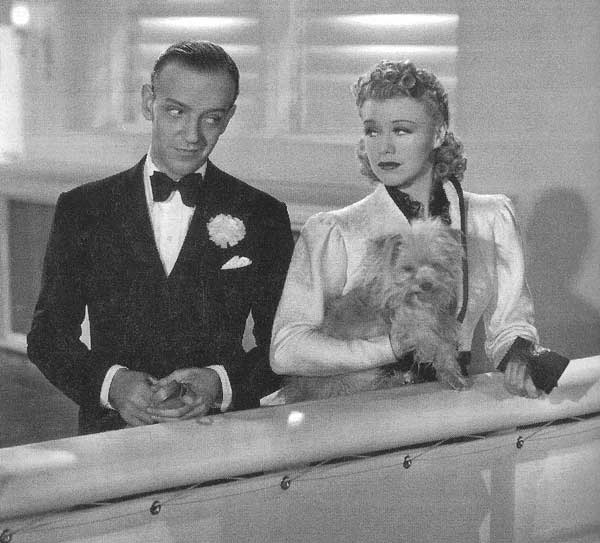
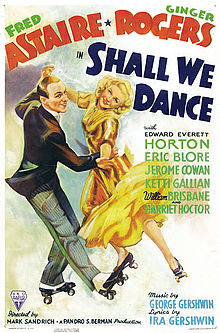
Shop Around the Corner, The**** 1940
http://www.tcm.com/tcmdb/title.jsp?stid=413
Set in and around a Budapest store, co-workers Klara Novak (Margaret Sullavan) and Alfred Kralik (James Stewart) hold an
intense dislike for each other, while maintaining a secret letter-writing relationship, neither realizing who their pen-pal is. They
fall in love via their correspondence, while being antipathic and peevish towards one another in real life. A major subplot
concerns the apparent infidelity of the store owner's wife, and its spillover effect upon the various working relationships in the
shop.[1] Comic relief is provided throughout by William Tracy's characterization of Pepi the delivery boy.
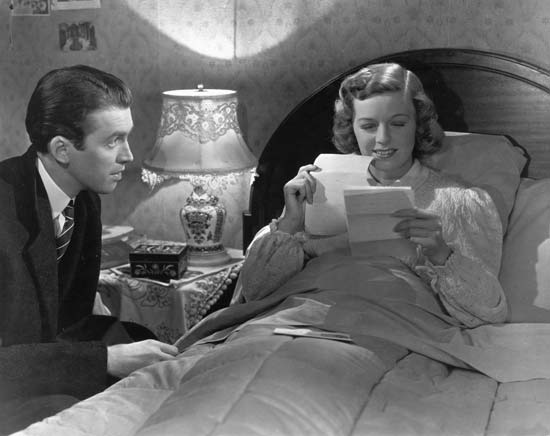
Shopgirl*** 2005
Clare Danes and Steve Martin seemed to fit as love interests, despite their large age difference.
Although bordering on grotesque, and not critically acclaimed I found that the film generated an
emotional response that kept me glued to the end.
http://en.wikipedia.org/wiki/Shopgirl
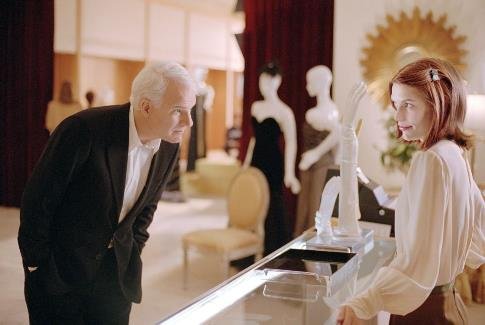
While washing clothes at a Laundromat, she meets Jeremy (Jason Schwartzman), a grungy, scruffy artist completely devoid of
Enter Mr. Suave, Ray Porter (Steve Martin) who comes into the store with his snazzy suits and perfectly slicked hair. Who cares
Everything is great, except that Ray informs her after they sleep together that he travels a lot and they should keep their
Shopgirl has promise, as a film about lonely people struggling to find purpose in L.A., but the execution is all over the place. It
The biggest issue with Shopgirl is that it seems clear that neither of the men are right for her, and they both just happen to be
around at different moments. Even for a film that revels in its anti-romantic stance, there is something too downbeat about
seeing people latch onto whoever is nearby, like proximity infatuation. It wasn’t the fact that she was dating such an older man
that seemed grotesque; it was that their story simply wasn’t worth telling. A lack of purpose and invigorating new ideas keep
the film at a distance. Shopgirl has the ingredients for greatness, but sadly, the final product winds up half-baked and stale.
Show He Never Gave, The****1/2
VIDEO
http://www.youtube.com/watch?v=q3NuaJTmiUc
http://en.wikipedia.org/wiki/Hank_Williams:_The_Show_He_Never_Gave
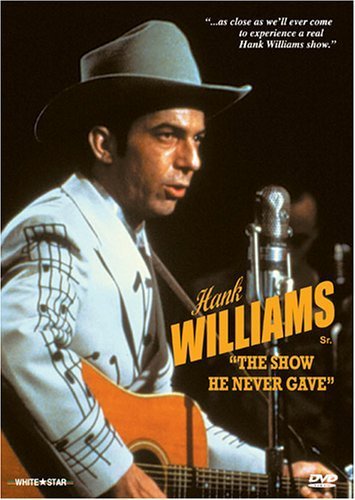
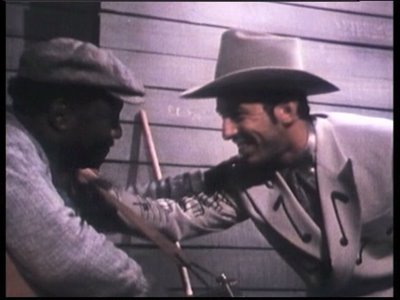
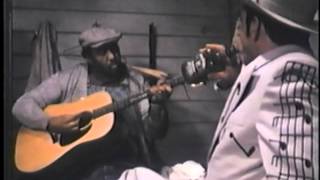
People who know Hank Williams know that he wasn't just the greatest star of country music who ever lived, he was the greatest who ever will live. With license on personal
loan from God himself, Hank reached into the hearts of many of us when we were in a dark corner of our lives and helped pull us back. This miraculous film originated in
London as a stage play and now comes to us as a video from Canada. The entire action takes place within a two hour time frame on the New Years Eve when Hank died. It
envisions his going into a smoky bar and playing a show for the folks. The story is told through his songs and remarks. Important to know is that the show's creator fully
understood Hank's legacy and thereby touches all the right buttons. This is the most emotional movie I've ever seen and I'm personally on a diet allowing no more than one
screening every two years for the emotional drain of watching it. On the other hand, I've seen people watch it and simply enjoy the ample good music, with no trace of the
buckets of tears that one might observe if they watched with me.
Country-music great Hank Williams died of heart failure in the backseat of a Cadillac carrying him to a stadium concert in Ohio on Jan. 31, 1952. Writer Maynard Collins and
director David Acomba took these facts and added a small fantasy: In this Canadian-made feature film, Williams asks his driver to stop at a little roadside honky-tonk, where
the star gives the small crowd a thrill with an impromptu concert. Williams is played by one Sneezy Waters, who isn't much of an actor and is even less of a singer — he
sounds like Hank with bad allergies. But Hank Williams: The Show He Never Gave still fascinates, because it taps into the deep, melancholy power of its subject.
Williams wrote masterpieces of country misery and was by all accounts a pretty miserable fellow himself. Show depicts him as an artist alienated by his own stardom,
hoping for some small pleasure by connecting with a few people in a bar. Waters' Hank sings a slew of songs, gets drunk, shoots drugs into his arm in a back room, and
then climbs back into his car to die. Dark, eerie, and atmospheric, this Show is a heartfelt work.
Sisters, The**** 1938
http://cinemaandchocolate.blogspot.com/2009/07/sisters-1938.html

At a ball held on the night of the 1904 presidential election, serious Louise, frivolous Helen, and stolid Grace, daughters of
Medicine Bow, Montana pharmacist Ned Elliott and his wife Rose, find themselves dealing with romantic prospects. Tom Knivel
is about to propose to Louise when Frank Medlin, a San Francisco sports reporter, asks her to dance. Infatuated with the young
woman, Frank extends his stay, and at Sunday dinner in the Elliott home he announces he and Louise plan to wed. Although her
parents disapprove of the union, Louise leaves for San Francisco with Frank that night. Grace eventually marries the jilted Tom
and Helen weds wealthy Sam Johnson, who promises her freedom and asks for nothing in return.
Although facing financial difficulty, Louise urges Frank to complete his novel. When she becomes pregnant, she decides to keep
her condition a secret, but finally reveals the truth when she accompanies Frank to a boxing match and the smoke and smells
make her ill. Returning home, Louise suffers a miscarriage while climbing the stairs to their apartment, and her distraught
husband begins to drink heavily.
Overwhelmed by increasing medical bills and a sense of worthlessness, Frank demands a raise but is rebuffed by his editor who,
telling him his writing is suffering as a result of his drinking, fires him. Louise tries to console him by announcing she has found
employment at a local department store, but Frank's hurt pride prompts him to forbid her to work. Louise ignores his demand,
and while her husband struggles to find a job, she thrives as secretary to store owner William Benson.
Fellow sportswriter Tim Hazelton suggests Frank leave San Francisco in order to get a fresh start, and he decides to accept
work on a ship bound for Singapore. When Louise arrives home, she finds a note from Frank and rushes to the docks, where a
policeman mistaking her for a prostitute arrests her. By the time she is released, Frank's ship has sailed.
A few hours later, much of the city, including Louise's apartment building, is destroyed by the 1906 earthquake. When Ned is
unable to contact his daughter, he travels to San Francisco to search for her, but she has sought refuge with her friend Flora
Gibbon in Flora's mother's bordello in Oakland. With William's help, Ned locates Louise and brings her back to San Francisco.
Two years pass, the city has been rebuilt, and Louise is an executive in the department store. When she learns Tom has been
unfaithful to Grace, she returns to Silver Bow and is reunited with both her sisters. Meanwhile, Frank returns to San Francisco,
and although he is ill, he travels to Silver Bow with Tim when he learns Louise is there. At the ball on the night of the 1908
presidential election, Frank and Louise are reunited and decide to give their marriage another chance.
Snowbound: The Jim and Jennifer Stolpa Story (TV)***1/2 1994
http://www.answers.com/topic/snowbound-the-jim-and-jennifer-stolpa-story
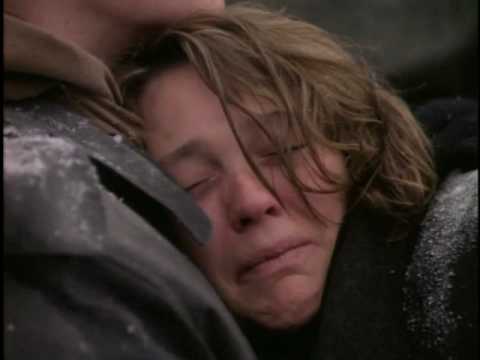
A television movie about the ordeal of Jim and Jennifer Stolpa, a couple lost with their five-month-old baby for eight days in a
blizzard in Nevada in December 1992. Based on a true story. ![]()
Snow White and the Seven Dwarfs***** 1937
http://www.filmsite.org/snow.html
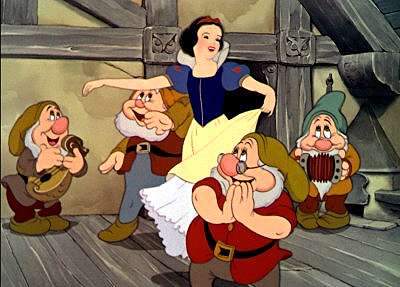
Through a textual prologue the audience is told that Snow White is a princess living with her stepmother, a vain and wicked
witch known only as the Queen. Fearing Snow White's beauty, the Queen forced her to work as a scullery maid and would daily
ask her Magic Mirror "who is the fairest one of all". The mirror would always answer that the Queen was, pleasing her.
At the film's opening, the Magic Mirror informs the Queen that Snow White is now the fairest in the land. The jealous Queen
orders her huntsman to take Snow White into the woods and kill her, demanding that he bring her the dead girl's heart in a
jeweled box as proof of the deed. The huntsman, unwilling to harm Snow White, instead spares her life, and urges her to flee
into the woods and never come back, bringing back a pig's heart instead.
Lost and frightened, the princess is befriended by woodland creatures who lead her to a cottage deep in the woods. Finding
seven small chairs in the cottage's dining room, Snow White assumes the cottage is the untidy home of seven orphaned children.
It soon becomes apparent that the cottage belongs instead to seven adult dwarfs, Doc, Grumpy, Happy, Sleepy, Bashful, Sneezy,
and Dopey, who work in a nearby mine. Returning home, they are alarmed to find their cottage clean and surmise that an
intruder has invaded their home. The dwarfs find Snow White upstairs, asleep across three of their beds. The princess awakens,
introduces herself, and all of the dwarfs except Grumpy (who is suspicious, but eventually warms up to her) welcome her as a
house guest after they learn she can cook. Snow White begins a new life cooking and keeping house for the dwarfs.
The Queen eventually discovers that Snow White is still alive when the mirror again answers that Snow White is the fairest in
the land. Using magic to create a drink that will disguise herself as an old hag, the Queen goes to the cottage while the dwarfs
are away and tricks Snow White into biting into a poisoned (magic wishing) apple that sends her into a deep sleep, which can
only be broken by love's first kiss. As Snow White falls asleep the Queen exclaims "Now I'll be fairest in the land!" The vengeful
dwarfs, alerted by the woodland animals who recognized the Queen, chase the Queen up a cliff and trap her. She tries to roll a
boulder over them but lightning strikes the cliff she is standing on and she falls to her death.
The dwarfs return to their cottage and find Snow White seemingly dead. Unwilling to bury her body out of sight in the ground,
they instead place her in a glass coffin trimmed with gold in a clearing in the forest. Together with the woodland creatures,
they keep watch over her body through the seasons in an "eternal vigil".
After several seasons pass, a Prince who had previously met and fallen in love with Snow White, learns of her plight and visits
her coffin. Captivated by her beauty, he kisses her, which breaks the spell and awakens her. The dwarfs and animals all rejoice
as Snow White and the prince ride off to the Prince's castle. The film ends with a non-animated scene showing the last page of
a book which reads "...and they lived happily ever after.
Some Came Running**** 1958
http://www.tcm.com/tcmdb/title/1607/Some-Came-Running/full-synopsis.html
VIDEO
http://www.tcm.com/mediaroom/video/385944/Some-Came-Running-Movie-Clip-He-Ain-t-In-Love-With-Me.html
This is great copy from Shirley MacLaine...for the complete article see http://www.shirleymaclaine.com/shirley/movies-somecamerun.php
MOVIES
Some Came Running
Metro-Goldwyn-Mayer/1958
Frank Sinatra had seen me do a television special with Gizelle McKensie and Pat Boone and he said, " I want that girl." Frank wanted me,
because they couldn't get Shelly Winters...so, I went up and met Frank at his house on Beaumont Drive. I was nervous when I rang the
bell, terrified, when I heard his recorded message from the gate speaker.
"You better have a goddamned good reason for being here."
His house was decorated all in Japanese and he was a gracious host spending hours talking about this new film, which was based on the
novel by James Jones that would be directed by Vincent Minnelli. They were already in production and I was asked to report on location to
Madison, Indiana as soon as possible.
Upon learning that I had landed the role of Ginny Moorehead, I immediately went to a specialty store and had a stuffed toy dog made,
which I would use as a prop for the role.
I boarded a bus for Madison and arrived on location completely in character. Frank saw me get off the bus and just fell down laughing,
"That's Ginny," he said.
Before long, Frank, Dean and I started hanging out together. It was great to renew my friendship with Dean Martin after Artists and Models. He was more relaxed and in good spirits and fun to be with and, in my opinion, his role as Bama in
Some Came Running was the best acting of his very talented, very lengthy career.
I stayed at a hotel, which was adjacent to the house that had been rented for Dean and Frank. I was the only woman in the cast or crew
which was allowed into that house. I was fortunate to spend considerable time in their private world, tidying up for them, arranging flowers
and making the place livable. All they did is play gin rummy and entertain 'friends'. There was always some guy from the mob there.
That's where I met Sam Giancana. We played gin together and he would always cheat by looking at the reflection of my cards in my
reading glasses to see what cards I held in my hand.
Sinatra as Dave Hirs and Shirley MacLaine in the brilliant portrayal of Ginny Moorehead
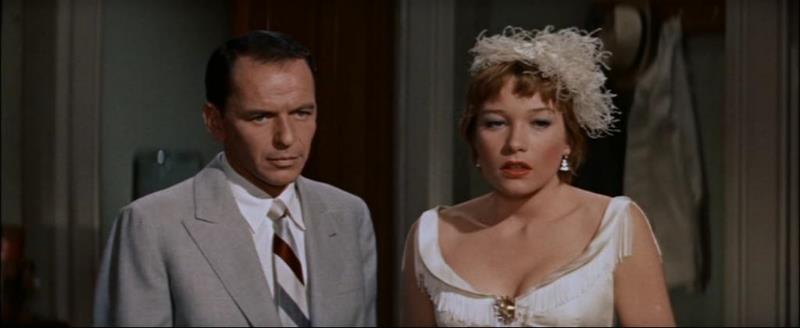
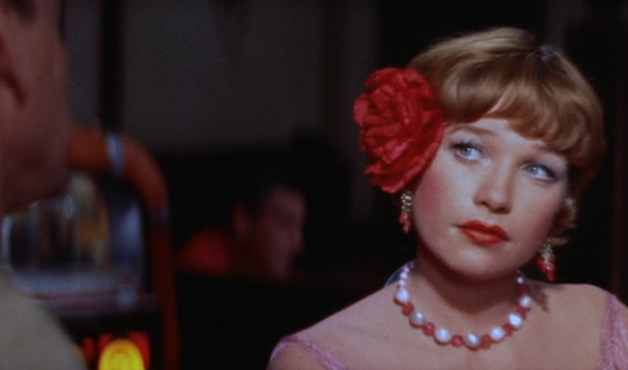
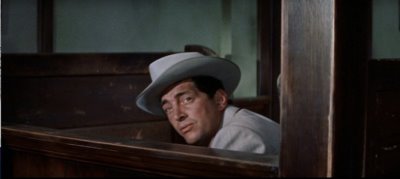
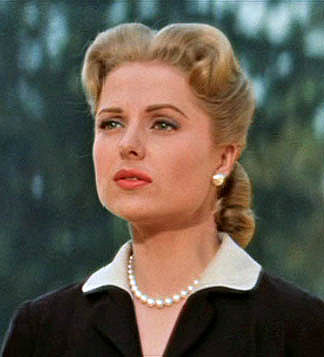
Dean Martin is possibly his greatest performance Martha Hyer
Some Like It Hot***** 1959
This is a classic comedy that breaks a lot of the rules, but it works magnificently. There is very little
flucuation in dynamics, as even the potentially dramatic moments do not create much empathy. The
fact is simply that the funny scenes, which are many, are absolutely hilarious. The most significant and
humorous aspect of the film is based upon the Daphne character played by Jack Lemmon. As Daphne,
who is disguised as a woman strictly for the purpose of getting employed (in an all-girl orchestra) he has
so many misadventures as a female that he begins to forget his true identity. Josephine, played by Tony
Curtis, is the exact opposite, keenly aware that he can use his disguise to gain access to females, in
particular Sugar Kane, played by Marilyn Monroe. There are too many great scenes to mention, but one
I will refer to is the berth scene. Daphne is in her berth, and when Sugar finds out "she" he has a
container of alcohol, the word spreads and suddenly there is a maze of arms and legs in which Daphne
is entangled. "She" starts wiping her brow in a rather aroused excitemnt. Priceless! Everyone of course,
know the classic last line, spoken by Joe E. Brown. The relationship between Daphne and Josephine is
paramount. When Josephine bumps agianst Daphne, he creates a shift in her fake bosoms, instigating
a comment from Daphne,
JOE (grabbing him) Not there - that's the emergency brake. JERRY (clutching bosom) Now you've done it! JOE Done what? JERRY Tore off one of my chests. JOE You'd better go fix it.
http://www.destinationhollywood.com/movies/somelikeithot/famouslines_content.shtml
http://www.imdb.com/title/tt0053291/synopsis
http://www.film.u-net.com/Movies/Reviews/Some_Like.html
The launching pad for Billy Wilder's comedy classic was a rusty old German farce, Fanfares of Love, whose two main characters
were male musicians so desperate to get a job that they disguise themselves as women and play with an all-girl band in gangster-
dominated 1929 Chicago. In this version, musicians Joe (Tony Curtis) and Jerry (Jack Lemmon) lose their jobs when a speakeasy
owned by mob boss Spats Columbo (George Raft) is raided by prohibition agent Mulligan (Pat O'Brien). Several weeks later, on
February 14th, Joe and Jerry get a job perfroming in Urbana and end up witnessing a gangland massacre in a parking garage.
Fearing that they will be next on the mobsters' hit lists, Joe devises an ingenious plan for disguising their identities. Soon they
are all dolled up and performing as Josephine and Daphne in Sweet Sue's all-girl orchestra. En route to Florida by train with
Sweet Sue's band, the boys (girls?) make the acquaintance of Sue's lead singer Sugar Kane (Marilyn Monroe, in what may be her
best performance). Joe and Jerry immediately fall in love, though of course their new feminine identities prevent them from
acting on their desires. Still, they are determined to woo her, and they enact an elaborate series of gender-bending ruses
complicated by the fact that flirtatious millionaire Osgood Fielding (Joe E. Brown) has fallen in love with "Daphne." The plot gets
even thicker when Spats Columbo and his boys show up in Florida. Nominated for several Oscars, Some Like It Hot ended up the
biggest moneymaking comedy up to 1959. Full of hilarious set pieces and movie in-jokes, it has not tarnished with time and in
fact seems to get better with each passing year, as its cross-dressing humor keeps it only more and more up-to-date.
Also Known As:
Que nous reste-t-il?Director: Gail Harvey
Starring: Tatum Knight, Katie Boland, Jack Knight
Synopsis: After years of moving, 15-year-old Tamara is tired of starting over. When her unconventional family relocates to a
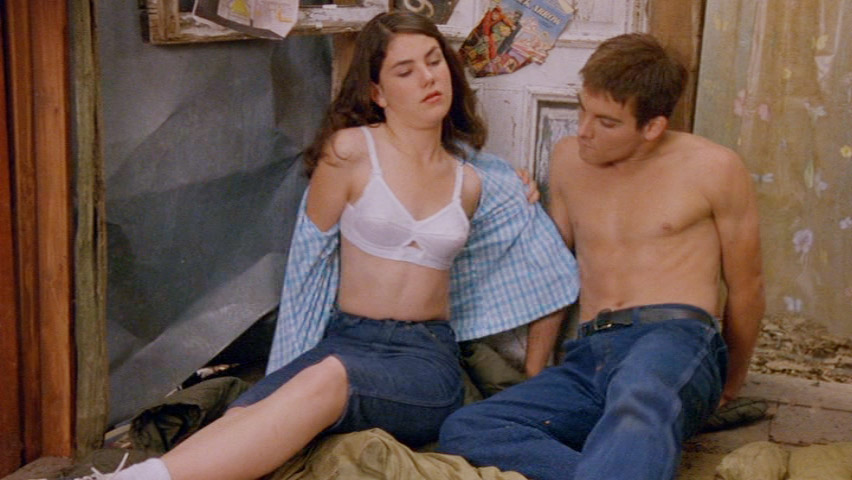
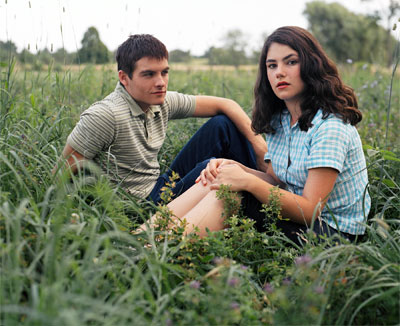
http://en.wikipedia.org/wiki/Song_for_a_Raggy_Boy
VIDEO
http://www.youtube.com/watch?v=sEU1rlwnCV4
http://www.youtube.com/watch?v=bi1CBCDsFiY
A teacher takes on the corrupt leadership of an Irish reform school in this drama based on a true story. William Franklin
(Aidan_Quinn) is a teacher who was born in Ireland and moved to the United States only to repatriate in 1939 after his
leftist political views cause him to lose his job. Franklin becomes the first non-cleric instructor at St. Jude's, a school for
wayward boys run by Brother John Iain_Glen, who is a firm believer in strong discipline. But Franklin comes to believe
the students are being treated with excessive force, with many of the children severely punished for trivial violations of
the rules, and some treated as delinquents for the crime of not having parents. As Franklin campaigns for more humane
treatment of his charges, he makes a powerful enemy in Brother John, who responds to Franklin's reform efforts with
greater vehemence against the students, in particular Mercier (John_Travers), an inquisitive child who has become a
favorite of Franklin. Franklin's distrust of Brother John's regime reaches a high point when a new student informs him
that he was sexually assaulted by one of the clerics. Song for a Raggy Boy was adapted from the memoir by
Patrick_Galvin, who also helped adapt his story for the screen. Mark Deming, Rovi
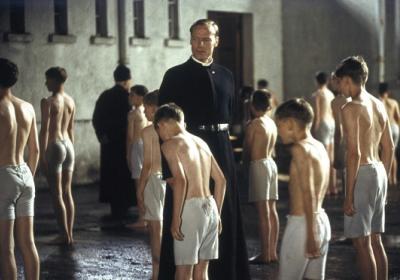
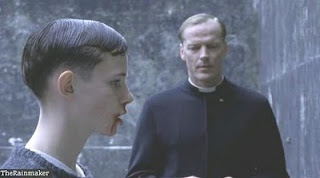
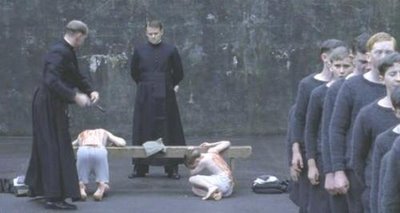
Sophie's Choice**** 1982
http://www.imdb.com/title/tt0084707/synopsis
http://www.homevideos.com/revnclas/65b.htm
In 1947, the movie's narrator, Stingo (Peter MacNicol), relocates to Brooklyn in order to write a novel and is befriended by
Sophie Zawistowski (Meryl Streep), a Polish immigrant, and her lover, Nathan Landau (Kevin Kline).
One evening, Stingo learns from Sophie that she was married but her husband and her father were killed in a German work
camp and that she was interned in the Auschwitz Nazi concentration camp.
Nathan is constantly jealous, and when he is in one of his violent mood swings he convinces himself that Sophie is unfaithful to
him and abuses and harasses her. There is a flashback showing Nathan rescuing Sophie from near death from starvation shortly
after her immigration to the U.S. Sophie eventually reveals that her father was a Nazi sympathizer. Sophie had a lover, Józef
(Neddim Prohic), who lived with his half-sister, Wanda (Katharina Thalbach), a leader in the Resistance. Wanda tried to
convince Sophie to translate some stolen Gestapo documents, but fearing she may endanger her children, she declined. Two
weeks later Józef was murdered by the Gestapo, and Sophie was arrested and sent to Auschwitz with her children. Upon arrival,
Jan (Adrian Kaltika), Sophie's son, was sent to the children's camp, and her daughter, Eva (Jennifer Lawn), was sent to her
death in Crematorium Two.
Nathan tells Sophie and Stingo that the research that he is doing at the pharmaceutical company is so groundbreaking that he
will win the Nobel Prize. At a meeting with Nathan's physician brother, Stingo learns that Nathan is mentally ill (Paranoid
Schizophrenic) and that all of the "research facilities" that Nathan has worked at have been "expensive funny farms." (He has a
job in the library of a pharmaceutical firm, which his brother got for him, and occasionally helps researchers with their research,
but otherwise, is not one at all.) After Nathan discharges a firearm over the telephone in a violent rage, Sophie and Stingo flee
to a hotel, where Sophie describes the incident giving rise to the film's title. While being unloaded in Auschwitz, Sophie was
asked to choose which of her children would live and which would die. When she was unable to choose, a Nazi officer said both
would be sent to die, so she chose Jan to survive. Sophie and Stingo make love, but while Stingo is sleeping, Sophie, tormented
by her memory, returns to Nathan, where both Sophie and Nathan commit suicide by taking cyanide. Stingo moves away from
Brooklyn and into a small farm his father recently inherited in southern Virginia to finish writing his novel.
The Spirit of the Beehives***** 1973
http://en.wikipedia.org/wiki/The_Spirit_of_the_Beehive
http://www.criterion.com/films/367-the-spirit-of-the-beehive
Widely regarded as a masterpiece of Spanish cinema, this allegorical tale is set in a remote village in the 1940s. The life in the village is calm
and uneventful -- an allegory of Spanish life after General Franco's victory in the Spanish Civil War. While their father (Fernando Fernán Gómez)
studies bees in his beehive and their mother (Teresa Gimpera) writes letters to a non-existent correspondent, two young girls, Ana (Ana Torrent) and
Isabel (Isabel Telleria), go to see James Whale's Frankenstein at a local cinema. Though they can hardly understand the concept, both girls are
deeply impressed with the moment when a little girl gives a flower to the monster. Isabel, the older sister, tells Ana that the monster actually exists
as a spirit that you can't see unless you know how to approach him. Ana starts wandering around the countryside in search of the kind creature. The
film received critical accolades for its subtle and masterful use of cinematic language and the expressive performance of the young Ana Torrent.
~ Yuri German, Rovi
.jpg?timestamp=1358529214355)
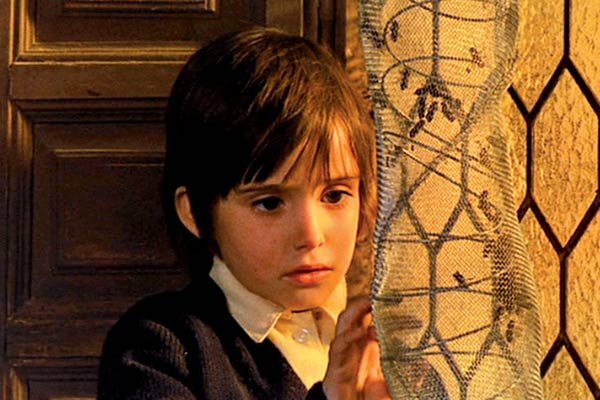
Spitfire Grill***1/2 1996
http://www.mediacircus.net/spitfire.html
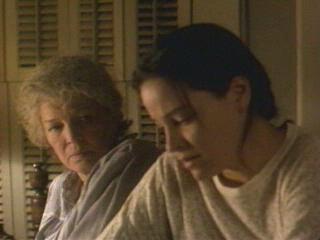
The story centers on a young woman named Percy (Alison Elliott) who served prison time. Upon her release, she arrives in a
small town in Maine with hopes of beginning a new life. She works as a waitress in the Spitfire Grill, owned by Hannah (Ellen
Burstyn), whose gruff exterior conceals a kind heart and precious little tolerance for the grill's regular customers, who cast their
suspicions on Percy's mysterious past. No one is more suspicious than Nahum, Hannah's nephew, although his wife, Shelby, has
a kinder curiosity.
When Hannah becomes bedridden due to a nasty fall, Percy and Shelby pitch in to save the Grill and win the approval of Hannah,
who learns that she does need friends. Joe, an attractive young man in town, becomes smitten with Percy, and brings to town a
scientist who thinks that the town's trees might cure cancer and arthritis. As the plot unfolds, Hannah holds a $100-per-entry
essay contest to find a new owner for the grill. This creates a positive change in the town, but the plans are disrupted by
Nahum's suspicions and the revelation that a local hermit is really Hannah's shell-shocked Vietnam veteran son. Percy sacrifices
her own life to save Hannah's son and prompts a number of characters in the town to consider their own conduct more deeply.
Overall, the film deals with powerful themes of redemption, hatred, compassion, independence, the economic problems of small
towns, the plight of Vietnam War veterans and to some extent female empowerment. A "trick" of the film is that while it may
be expected that the redemption will primarily be of Percy, in fact other characters and relationships, and indeed the town
itself, are powerfully redeemed through the actions of Percy.
Stagecoach**** 1939
http://www.decentfilms.com/reviews/stagecoach.html
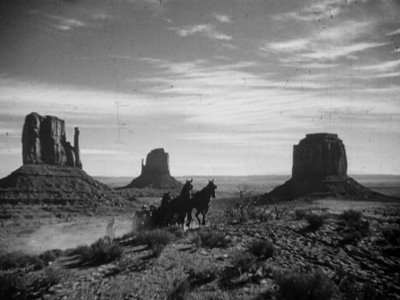
In 1855, the Overland stage from Tonto to Lordsburg leaves town with eight people on board. In the front, sit Buck the driver
and Marshal Curley Wilcox, who is riding shotgun to protect the stage from hostile Indians and from the Plummer brothers, a
vicious band of outlaws. The passengers consist of Doc Josiah Boone, the town drunk; Dallas, a woman of ill repute, who, like
Doc, has been banished from town; the pregnant Lucy Mallory, who is taking the stage to meet her husband, a cavalry officer,
and is treated gallantly by her fellow passenger, Hatfield, a gambler; Gatewood, the town's sanctimonious banker who mouths
respectability while clutching a carpet bag filled with stolen money; and Peacock, a timid whiskey drummer. Because of an
Apache uprising by Geronimo, the cavalry escorts the coach to the first station at Dry Fork. Along the way, Buck stops to pick
up the Ringo Kid, who has escaped from prison to seek revenge on the Plummers, who killed his family and sent him to jail on
false testimony. After Curley arrests Ringo, the stage continues on to Dry Fork, where they discover that there are no troops to
escort them farther. Voting to continue on alone, they reach the next stop, where their journey is delayed when Mrs. Mallory,
learning that her husband has been wounded, goes into premature labor. Doc sobers up to deliver the baby, and as they await
Mrs. Mallory's recovery, Dallas and Ringo fall in love and Dallas urges Ringo to escape. Ringo is on the verge of leaving when he
sees Apache war signals, and the passengers hastily board the stage to make a desperate dash to Lordsburg. Just as they think
the danger has passed, the Apaches attack at a dry lake bed, wounding Peacock and Buck and killing Hatfield. At the last
minute, the cavalry rides to the rescue and escorts the stage to Lordsburg, where Gatewood is arrested for embezzlement.
There, Curley grants Ringo his freedom so that he can avenge the murder of his family, and after gunning down the Plummers,
Ringo and Dallas ride off into the night to begin life anew at his ranch across the border. ![]()
Stage Door****1/2 1937
One of the best "actresses living in a hostel" films ever made. This may be Ginger Rogers best film
(despite her academy award winning performance in Kitty Foyle). She has a sharp and witty script to
work with and her sometimes antagonists reply with a sparkle, especially Katharine Hepburn and Lucille
Ball. Hepburn plays a polished and apparently snobbish character, but beautifully evolves her persona
into a sympathetic friend to the career challenged girls. Ginger Rogers lets her vulnerability filter
through her flippancy. Despite the melodramatic nature of this moviee, it tastes of realism and
dramatically balances triviality with tragedy.
http://www.filmsite.org/stag.html
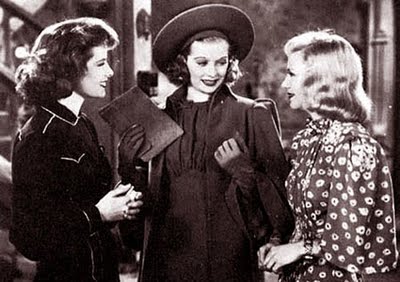
Terry Randall (Katharine Hepburn) moves into the Footlights Club,[1] a theatrical rooming house in New York. Her polished
manners and superior attitude make her no friends among the rest of the aspiring actresses living there, particularly her new
roommate, flippant, cynical dancer Jean Maitland (Ginger Rogers). From Terry's expensive clothing and her photograph of her
elderly grandfather, Jean assumes she has obtained the former from her sugar daddy, just as fellow resident Linda Shaw (Gail
Patrick) has from her relationship with influential theatrical producer Anthony Powell (Adolphe Menjou). In truth however, Terry
comes from a very wealthy, upper class, Midwest family. Over the strong objections of her father, Henry Sims (Samuel S.
Hinds), she is determined to try to fulfill her dreams on her own. In the boarding house, Terry's only supporter is aging actress
Catherine Luther (Constance Collier), who appoints herself Terry's mentor.
When Powell sees Jean dancing, he decides to dump Linda. He arranges for Jean and her partner Annie (Ann Miller) to get hired
for the floor show of a nightclub he partly owns. He then starts dating Jean, who, despite her initial reluctance, starts falling for
the man.
Meanwhile, well-liked Kay Hamilton (Andrea Leeds) had a great success and rave reviews in a play the year before, but has had
no work since, and is running out of money. She clings desperately to the hope of landing the leading role in Powell's new play,
Enchanted April. She finally gets an appointment to see Powell, only to have him cancel at the last minute. She faints in the
reception area, the result of malnutrition and disappointment. Seeing this, Terry barges into Powell's private office and berates
him for his callousness. As a result, the other boarding house residents start to warm to the newcomer.
Terry's father secretly finances Enchanted April on condition that Terry be given the starring role. Powell invites Terry to his
penthouse to break the news. When Jean shows up unannounced, Terry sees the opportunity to save her friend from the
philandering Powell. She pretends that Powell is trying to seduce her. It works. However, it makes things uncomfortable around
the boarding house. In addition to Jean's loathing, Terry's landing of the plum part breaks Kay's heart.
The totally inexperienced Terry is so horribly bad during rehearsals that Powell tries desperately to get out of his contract with
Sims. On opening night, after she learns that the depressed Kay has committed suicide, Terry decides she cannot go on.
Catherine tells her that she must, not just for herself, but also for Kay. She does, and gives a heartfelt performance. The play is
a hit, much to the chagrin of Terry's father. At her curtain call, Terry pays homage to her dead friend, and Terry and Jean are
reconciled.
Stealing Home**** 1988
http://en.wikipedia.org/wiki/Stealing_Home
http://rogerebert.suntimes.com/apps/pbcs.dll/article?AID=/19880826/REVIEWS/808260303/1023
The storytelling device of the flashback gets an intense workout in this tragic coming-of-age drama. Mark Harmon stars as
washed-up baseball player Billy Wyatt, who is shocked when he receives news that his childhood sweetheart and friend Katie
Chandler (Jodie Foster) has committed suicide and left the disposal of her ashes to his judgment. Although Billy and Katie have
not kept in touch through the years, he has always carried a torch for her, his first love. On his way home, Billy recalls his past
associations with the free-spirited Katie: their first meeting, the time they made love, and conversations they had, mostly
during summers at the New Jersey shore. Billy also remembers the adolescent mischief he got into with his best friend, Alan
Appleby (played by Jonathan Silverman in the flashbacks, Harold Ramis in the present-day), like when each of them ended up
sleeping with other's prom date. Billy finally decides to cast Katie's ashes to the wind in the place where they were happiest, by
the seashore. Stealing Home was reportedly based on the real-life experiences of its writers, former Second City troupe
members and WKRP in Cincinnati writers Steven Kampmann and Will Aldis. ~ Karl Williams, All Movie Guide

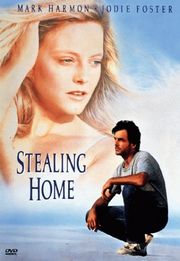
Story of Temple Drake**** 1933
http://www.nytimes.com/movies/movie/111863/The-Story-of-Temple-Drake/overview
VIDEO
http://www.youtube.com/watch?v=OQo-i_e86KY
One possible reason for the scarcity of viewing prints has to do with the rudimentary censorship editing that occurred from town to town, in keeping with the PCA
requirements. Snip a few frames out in Kansas City and some more in Mobile, not to mention the ones removed in Philadelphia, and you have a very compromised
35mm print with splices, handling marks, and other imperfections throughout, easily subject to breaking down and being tossed away. (In 1933 the awareness of film
preservation was minimal to totally nonexistent. The MoMA Film Library was not founded until 1935.) Also, the reviews were ambivalent, with New York Times film critic
Mordaunt Hall writing on May 6, 1933, “There are loopholes in the story as it comes to the screen, but the adroitly sustained suspense atones for such shortcomings.”
And let’s not dwell on the fact that lead actress Miriam Hopkins, at a mature 31 years old, was playing a dewy girl of 19. Wink, wink.
Dr. McHaney concluded his introductory remarks by stating, “The film was further sensationalized by being banned in many cities, so that Paramount pulled it from
circulation and never reissued it in any form...
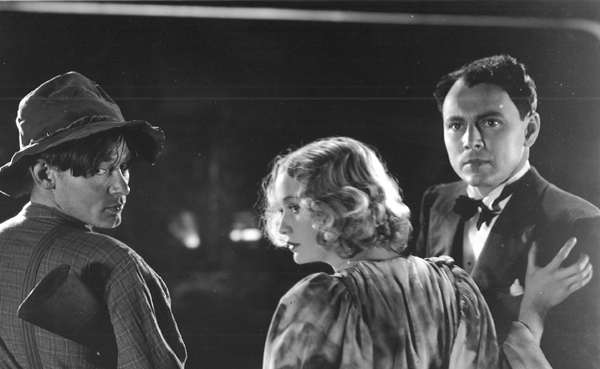
Storm In a Teacup***1/2 1937
http://en.wikipedia.org/wiki/Storm_in_a_Teacup_(film)
http://laurasmiscmusings.blogspot.ca/2010/10/tonights-movie-storm-in-teacup-1937.html
VIDEO
http://www.youtube.com/watch?v=B1Hd4htq2qQ
Victoria Gow and reporter Frank Burden have a brief, chance meeting as they disembark from a ship at Baikie, on the west coast of
Scotland. After Vickie leaves, Frank observes the police enter the cottage of Honoria Hegarty and seize her dog Patsy for non-
payment of fines. Meanwhile, Vickie is reunited with her father, Willie Gow, the Provost, and learns that he now believes himself to
be a man of destiny and has joined the Scottish Nationalist Party, hoping to win its nomination for a seat on the town council. Frank
and Vickie encounter each other again at a town council meeting, where Frank offends her by his comments about her father. Gow
gives Frank an officious interview, which is interrupted by Hegarty's complaints about her treatment. Both Vickie and Frank are
sympathetic, but Gow ignores her, so Frank changes the headline to note the dog incident. Before Gow can see the morning paper,
he addresses a planned rally, where he is jeered with imitation dog barks as the crowd shouts him down. Gow believes that Frank
set up the mob, but Vickie knows he is innocent. Just as Frank is about to help Gow, he learns that Hegarty's ice cream truck has
been seized, which means war between the two men. When the party leaders gather at the Gow home, Frank fills it with dogs to
embarrass Gow and prevent him from receiving the nomination. Meanwhile, Lisbet, the wife of newspaper owner Horace Skirving, is
moved by Gow's humiliation to admit that she loves him. When Horace announces that he plans to divorce Lisbet, Vickie believes
she is no longer wanted at home. Gow orders Frank's arrest, but he and Hegarty are defended by the F.F.F.F., an animal rights
organization. When Frank refuses to cooperate with his attorney at the trial, Frank is left to defend himself, and cross-examines
Gow bitterly. Vickie, about to be called as a prosecution witness, announces that she cannot give testimony because she and Frank
are married. Drawing her aside, Gow learns that this is not true, and therefore he must sabotage the case to prevent his daughter
from being prosecuted for perjury. Claiming to the court that Frank's actions were justified, Gow proclaims he has learned a lesson
in humility, and he gives a similar speech at another rally, thereby resuming his political career.
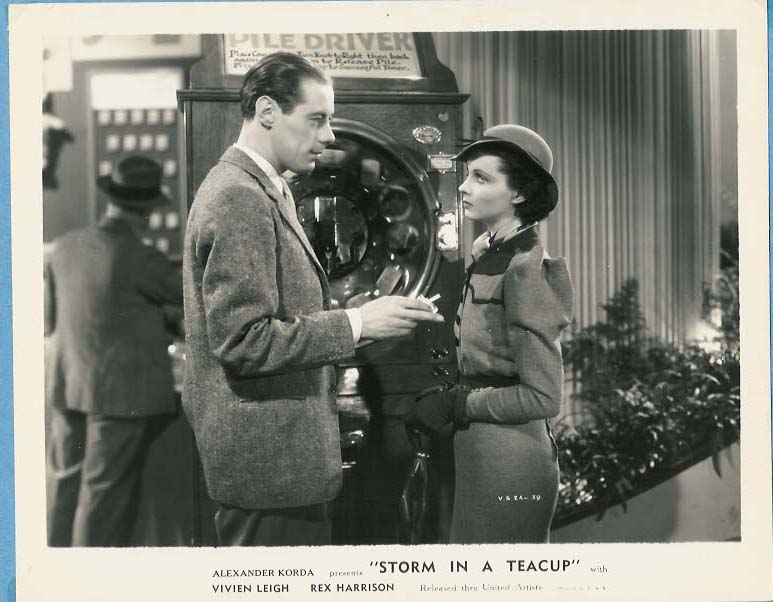

Strait-Jacket*** 1963
http://en.wikipedia.org/wiki/Strait-Jacket
VIDEO
http://www.tcm.com/mediaroom/video/455789/Strait-Jacket-Movie-Clip-Love-Slayer-Insane.html
Lucy Harbin returns unexpectedly to her farm after a trip out of town and discovers her husband in bed with another woman. Crazed, she grabs an ax
and hacks the lovers to death in full view of her 3-year-old daughter, Carol. Lucy is committed to an asylum and her brother and sister-in-law take
Carol and move west to another farm. Twenty years later Lucy is released from the asylum and comes to find her family. Carol, now a talented
sculptress, is in love with wealthy young Michael Fields. The girl is anxious for her dowdy mother to look as she did 20 years earlier and persuades her
to wear makeup, a black wig, youthful clothing, and jangling jewelry. Lucy behaves badly when she meets Michael; and the arrival of Dr. Anderson,
the psychiatrist who treated her at the asylum, upsets her further. The doctor tells Carol that he thinks Lucy should return to the asylum and he is
about to tell Lucy when he is hacked to death in a farm building. Later, Lucy tells Carol that the doctor left, but the girl finds the doctor's car and,
suspecting that Lucy has reverted to violence, she hides the car. A hired hand sees her, and the next day Carol finds him repainting the car, which he
says is his. She fires him but he refuses to leave, threatening to reveal that he discovered Dr. Anderson's body in the meat refrigerator. Lucy
overhears the conversation, and the hired hand is later found axed to death. That night Lucy meets Michael's parents and she nervously reveals the
couple's plan to wed. Mrs. Fields objects and is rude to Lucy, who flies into a rage, vows that nothing will stop the marriage, and rushes from the house.
Later that night, Mr. Fields is chopped to death and, when his wife investigates the noise, a woman who appears to be Lucy attempts to kill her, but
Lucy walks in and stops her. The look-alikes grapple until Lucy strips a mask and wig from the other woman, revealing her own daughter, who had
planned the deaths of her beau's parents even before Lucy's release. Carol has a complete breakdown and is committed to an asylum. Realizing that
her own crime led to Carol's insanity, Lucy goes to care for her at the asylum.
.jpg?timestamp=1354953166118)
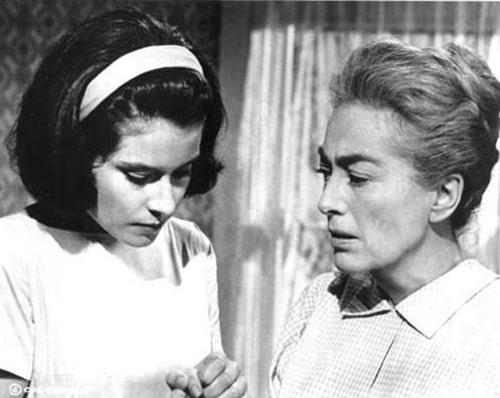
Stranger, The **** 1946
http://en.wikipedia.org/wiki/The_Stranger_(1946_film)
http://www.tcm.com/mediaroom/video/439487/Stranger-The-Movie-Clip-Foreign-Accents.html
http://www.tcm.com/mediaroom/video/439486/Stranger-The-Movie-Clip-Harper-School-For-Boys.html
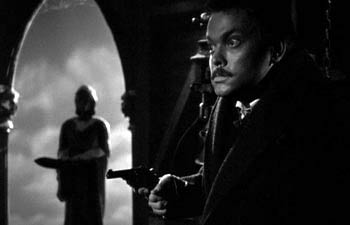
The Stranger was Orson Welles' third film. He set out to prove that he could make a movie that could perform at the box office. His
previous two directorial efforts – the absolute film classics Citizen Kane and The Magnificent Ambersons – were box office failures. His
third was a more traditional film and, like one of it's movie poster predicted, was Welles' first box office successes.
Today the “programmer” is considered Welles' weakest. I don't buy it. The Stranger is an amazing looking film – and Welles first directed
film noir. The most notable and memorable scene in The Stranger is an exciting chase in and on an elaborate clock tower. Foster Hirsch –
in his book Film Noir: The Dark Side of the Screen– writes:
"Places in noir reveal character... Settings are chosen for thematic reinforcement. Cars and trains and boxing arenas figure
prominently in noir stories because they provide visual metaphors of enclosure and entrapment."
The clock tower is a dark cramped place which can only be entered by climbing rickety ladders. The clock is referenced a number of times
throughout the film and you just know the hero of the story is going to end up there. The editing during the clock sequence is just amazing.
Welles and Edward G. Robinson – up until that point just toying with each other by playing cat and mouse – frantically rush through the
giant cuckoo clock. The scene is edited in such a way that it seems like both men – going back and forth - are mimicking each others
actions. All of it taking place in a dangerous enclosed environment.
But that's the end. The setup is excellent as well.
Edward G. Robinson plays Wilson – a Nazi hunter. He convinces authorities holding a former Nazi to release a low-level war criminal
– a Nazi hunter. He convinces authorities holding a former Nazi to release a low-level war criminal
(twitchy Konrad Meinike played by Konstantin Shayne) in hopes that the German will lead them to his Nazi superior. Wilson breaks his
pipe when he passionately pleads for them to release the man. The little man is let go – and it's made to look like a breakout. Robinson
follows him to a small peaceful New England town. Wilson is an intellectual (like Robinson himself) and not a cop. He botches the tail job
and is spotted quickly – thanks to the tape around his repaired pipe. In a handsomely shot scene in a gymnasium (Welles and
photographer Russell Metty are in fine form during the opening scenes) the escapee bops Wilson in the head erasing the trail Wilson was
following. Meinike – losing his tail – now feels free to visit his former superior.
Loretta Young plays Mary Longstreet – the town's prep school headmaster's naive daughter that who's first seen hanging curtains on her
wedding day. Young plays “women teetering on the edge” in a few other good noirs. She's a frantic housewife in Cause for Alarm!and
plays a spinster professor who tries to fulfill her sexual desires in The Accused – only to kill the man making advances on her in self
defense.
In The Stranger, while waiting for her husband-to-be to come home, she is visited by Meinike. The strange man runs off when he finds her
fiance Professor Charles Rankin isn't home. Then we're introduced to Orson Welles as Professor Rankin. Welles – directing himself – is
excellent. Rankin is revealed to be a former Nazi. He's approached walking down the street by Meinike and he quickly hustles him off into
the woods. He kills the man while he prays. Rankin evil streak clearly hasn't stopped since the war ended. The shookup professor throws
the body in a ditch just seconds before some student “paper chase” happens by. Later in the movie he kills his wife's beautiful golden
retriever Red – after the dog uncovers the man Rankin killed in a shallow grave. Welles brilliantly and convincingly plays the part without
a hint of a German accent. After killing his old friend, Rankin returns home and the wedding goes as planned. Wilson suspects there may
be something up with Rankin – who he finds out is new in town. Wilson – posing as an antique dealer - works his way over to the
newlyweds house for dinner. It's only later in the night – popping out of bed - does he realize that Rankin is a Nazi when he remembers
one of the professor's outrageous lines during dinner. Wilson reasons, “Well, who but a Nazi would deny that Karl Marx was a German...
because he was a Jew?” Methodical and intelligent Wilson doggedly investigates Charles Rankin (the alias for Nazi Franz Kindler).
Rankin/Kindler – always one step ahead of Wilson - convinces his wife and the townsfolk that he's innocent. The town's mood collectively
goes from sunny to sullen under the pressure of the murder investigation. Hardest to convince of Rankin's guilt is Rankin/Kindler's loyal
new wife Mary. Finally, she's exposed to the atrocities of war by Wilson (in a daring scene for 1946). Mary confronts her husband and he
goes over the edge. Rankin (Welles goes appropriately over the top) attempts to kill her and then flees to the clock tower – and to a
– and to a thrilling conclusion to The Stranger.
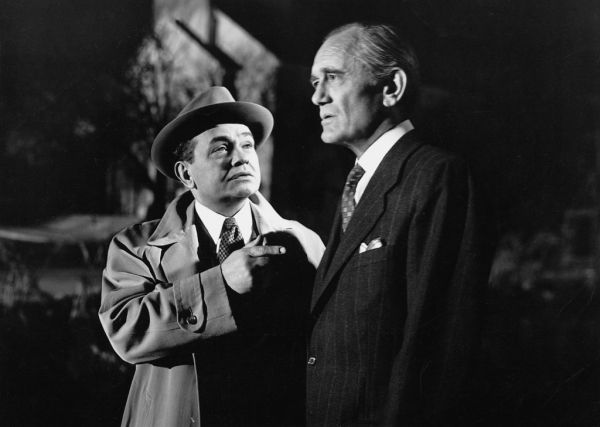
Strange Loves of Martha Ivers, The***1/2 1946
http://en.wikipedia.org/wiki/The_Strange_Love_of_Martha_Ivers
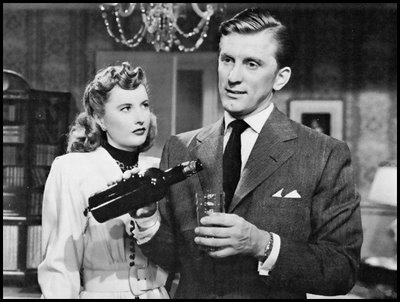
Unquestionably a melodrama, guilty of being overly melodramatic at times. Slander, murder, the love triangle, a crooked and drunkard lawyer, a sultry blonde, a coniving wealthy brunette, blackmail, a runaway...and probably more! The film still manages to be great because the plot is so adventurous and intertwining, and the performances are sensational, particularly by Lizabeth Scott, the ultimate in sultry and Van Heflin as the tough wisecracking rebel. Of course Barbara Stanwyk Kirk and Douglas are their reliable selves. Judith Anderson is short-lived as the protagonists mother and she is at her scene stealing best.
In The Strange Love of Martha Ivers, relationships formed in childhood lead to murder and obsessive love. The wealthy Martha Ivers (Barbara Stanwyck) is the prime mover of the small Pennsylvania town of Iverston. Martha lives in a huge mansion with her DA husband, Walter O'Neil (Kirk Douglas), an alcoholic weakling. No one knows just why Martha and Walter tolerate one another....but Sam Masterson (Van Heflin), an Iverstown boy who returns to town, may just have a clue. At least that's what Martha thinks when Sam asks Walter to intervene in the case of Toni Marachek (Lizabeth Scott), who has been unjustly imprisoned. It seems that, as a young boy, Sam was in the vicinity when Martha's rich aunt (Judith Anderson) met with her untimely demise. What does Sam know? And what dark, horrible secret binds Martha and Walter together? Directed by Lewis Milestone, and based on John Patrick's Oscar-nominated original story, Love Lies Bleeding, The Strange Love of Martha Ivers creates in Martha a unique and interesting, driven, obsessed, and spoiled character, but one not without sympathy. Barbara Stanwyck is outstanding as Martha, with her predatory smile and sharp, manicured nails. Kirk Douglas is surprisingly convincing as a lost, sad, weak man, who loves his wife, but is unable to gain her respect. The Strange Love of Martha Ivers eventually lapsed into public domain and became a ubiquitous presence on cable television. ~ Hal Erickson, All Movie Guide
Strangers On a Train**** 1950
http://www.youtube.com/watch?v=hCEwFC4ngBQ
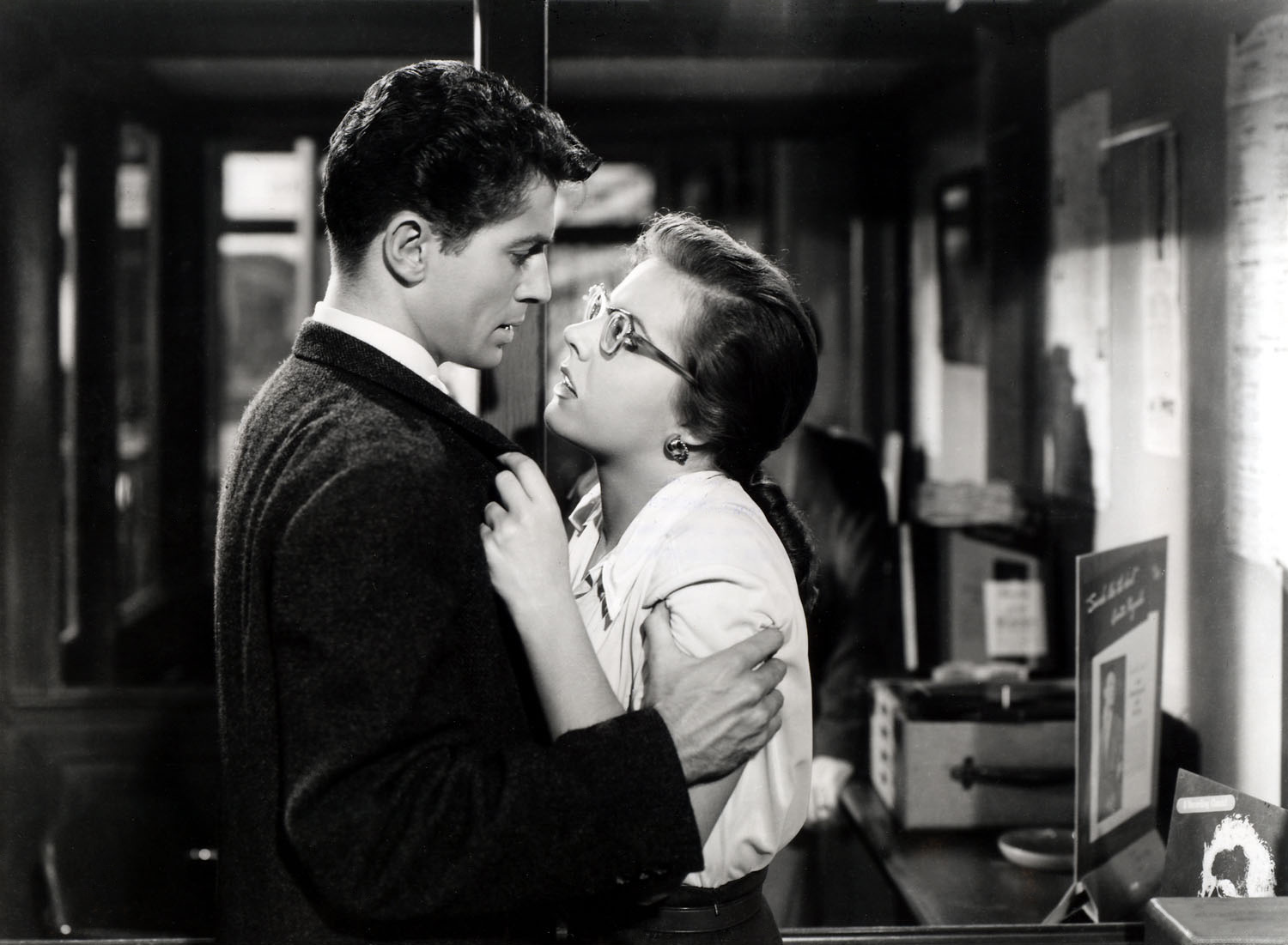
In In one of Alfred Hitchcock's suspense classics, tennis pro Guy Haines (Farley Granger) chances to meet wealthy wastrel Bruno Anthony (Robert Walker) on a train. Having read all about Guy, Bruno is
aware that the tennis player is trapped in an unhappy marriage to to wife Miriam (Laura Elliott) and has been seen in the company of senator's daughter Ann Morton (Ruth Roman). Baiting Guy, Bruno
reveals that he feels trapped by his hated father (Jonathan Hale). As Guy listens with detached amusement, Bruno discusses the theory of "exchange murders." Suppose that Bruno were to murder Guy's
wife, and Guy in exchange were to kill Bruno's father? With no known link between the two men, the police would be none the wiser, would they? When he reaches his destination, Guy bids goodbye to
Bruno, thinking nothing more of the affable but rather curious young man's homicidal theories. And then, Guy's wife turns up strangled to death. Co-adapted by Raymond Chandler from a novel by Patricia
Highsmith, Strangers on a Train perfectly exemplifies Hitchcock's favorite theme of the evil that lurks just below the surface of everyday life and ordinary men. ~ Hal Erickson, Rovi
From the opening shots of two pairs of shoes walking, two train tracks crisscrossing, and those shoes accidentally bumping toes, Alfred Hitchcock's Strangers on a Train (1951) explores one of his signature
concerns: the coexistence of good and evil in one person. In a story adapted from Patricia Highsmith's novel and structured through a series of doublings, Robert Walker's Bruno becomes the flamboyant
homicidal id to Farley Granger's stiff arriviste Guy, obliging Guy's desire to eliminate his wife and expecting Guy to return the favor with Bruno's father. After the murder, dreamily reflected in a pair of
eyeglasses, Bruno haunts Guy, menacingly popping into Guy's life in Washington and on the tennis court. Yet, with Walker's charisma and Granger's weakness, Bruno is the more charming figure, revealing
the appeal of moral chaos even as that chaos must be punished. Hitchcock's persistent pairs -- shoes, train tracks, crossed tennis racquets on Guy's lighter, two fateful carnival trips, two bespectacled
women -- point to the ineffable connection between Bruno and Guy, and the (literally) dark psychosis that lurks beneath everyone's bright, well-ordered surface. A popular success, Strangers on a Train
was Hitchcock's return to form after several failures. ~ Lucia Bozzola, Rovi
Strangers When We Meet**1/2 1960
http://www.nndb.com/films/530/000083281/
http://www.popmatters.com/film/reviews/s/strangers-when-we-meet-dvd.shtml
Kirk Douglas plays Larry Coe, a Los Angeles architect who's married with two kids. He has a very bright wife, Eve. She's ambitious for him, but he wants to do work more imaginative than the commercial buildings he's designing. Maggie Gault (Kim Novak), one of his neighbors whose son is friends with his son, helps him get a commission to build a house for an eccentric writer named Roger Alter (Ernie Kovacs, for comic relief). Both Larry and Maggie are dissatisfied in their marriages. Larry's wife is too hard-headed and practical and Maggie's husband isn't interested in having sex with her (or maybe he can't). So they have an affair that involves lots of walking on the beach and having drinks in oceanside hideaways. They both know what they're doing is wrong, and they each love their spouses in their own way and they're devoted to their children.
Felix Anders (Walter Matthau) is a dirty old man neighbor who snoops around and finds out about their affair. His leering and insinuations to Larry makes Larry realize the risks he's taking and he tells Maggie that they shouldn't see each other for a while. Felix, in the meantime, makes a play for Larry's wife Eve in an unbelievably creepy scene. In a way, Felix is a personification of the tawdriness of Larry and Maggie's affair. After her near-rape by Felix, Eve wises up and realizes that Larry has been unfaithful. She confronts him and they agree to stay together and move to Hawaii, where Larry has been offered a job to design a city.
Roger Alter's house is finished but still empty. Maggie drives up to take a look at it. Larry shows up and they talk about how they can never be together. Larry tells Maggie that he wishes they could live in the house and if they did, he would dig a moat around it and never leave it. Maggie doesn't say anything. Maybe she's thinking it's just as well the affair ended after all. The contractor for the house shows up and thinks Maggie is Larry's wife (which is strange because Eve has been a regular visitor to the building site). They both take a moment to savor the irony of his remark and Maggie drives away. On the way out of the driveway, one of the construction workers leers at her. She's not immune to one night stands, so she's already being put to the test. She drives back into their banal suburban enclave while Larry stands out on the house's balcony savoring the view of Los Angeles and no doubt thinking deep thoughts.
This is a long film that moves along at a leisurely pace that reflects the time when it was made. Larry is a successful architect, yet he still can take his kids to the school bus stop and have time to carry on his affair with Maggie without his wife suspecting (even though he works at home, she doesn't keep much of an eye on him). None of the women in the film work; they don't have to because their husbands have jobs that can support a family on one paycheck. America was a more economically secure country then. The film has nice expansive feel despite the constricted lives the characters lead.
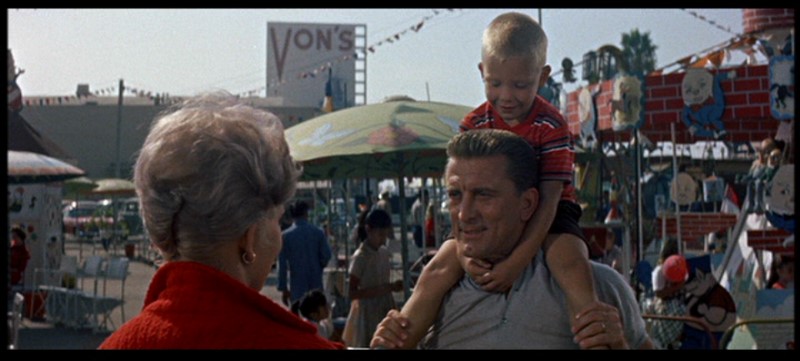
Strawberry Blonde, The****1/2 1941
http://claudia79.tripod.com/strawberry.html
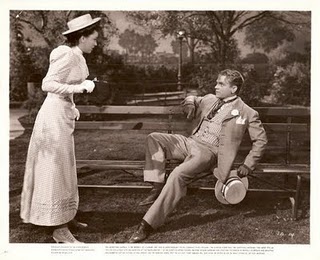
At the turn of the century, New York dentist Biff Grimes is reminiscing about the past when he receives a telephone call asking him to pull alderman Hugo Barnstead's aching tooth. Biff carries a grudge against Hugo, a man he has known from his youth: Their rivalry begins when both men fall in love with Virginia Brush, a strawberry blonde. Hugo arranges to meet Virginia "accidentally" in the park. In order that the meeting appear to be innocent, Virginia brings her friend, Amy Lind, a nurse who is outspokenly in favor of women's rights, and Hugo brings Biff. Hugo lures Biff into accompanying him by promising him that he can be Virginia's date, but when the foursome arrives in the country after a short carriage ride, Hugo pairs off with Virginia, leaving Biff to entertain Amy. To finish off Biff's disappointing evening, he is forced to pay for the carriage rental. The following week, Biff dates Virginia and spends all his money taking her to expensive places. When he tries to make another date with her, she turns him down, but Biff keeps trying and eventually Virginia agrees to meet him in the park. To Biff's surprise, Amy keeps the date in Virginia's place. When Biff learns from a passing friend that Virginia and Hugo eloped earlier that day, Amy does her best to console him. Eventually, Biff asks Amy if he can see her again, and over time, they fall in love and marry. One evening, Virginia invites Biff and Amy to dine with her and Hugo. Hugo spends the evening bragging about his wealth and then offers to bring Biff into his firm. Biff accepts his offer, but is frustrated when he learns that he is not expected to do much except sign his name to various papers. The reason for this becomes clear when the firm is accused of graft. Biff is held responsible for the crimes and Hugo, whose name does not appear on any papers, goes free. Things become even blacker when Biff's father, who is working on one of the firm's projects, is killed when a building collapses due to the use of inferior materials. Biff is held responsible and is sent to jail. By the time he is released, he has completed a correspondence school course in dentistry, and he and Amy move to a new neighborhood. Meanwhile, Hugo has gone on to a successful career in politics. Remembering these events, Biff vows vengeance on Hugo. When Hugo and Virginia arrive, they are surprised to discover that Biff is the dentist. Hugo and Virginia cannot stop quarreling and it is clear that they have a miserable marriage. Biff gets his revenge by pulling Hugo's tooth without gas, and realizes suddenly that he has a good life with Amy and is very glad that he did not marry Virginia, especially when Amy reveals that she is pregnant.
Student Prince of Old Heidelberg, The***1/2 1928
http://en.wikipedia.org/wiki/The_Student_Prince_in_Old_Heidelberg
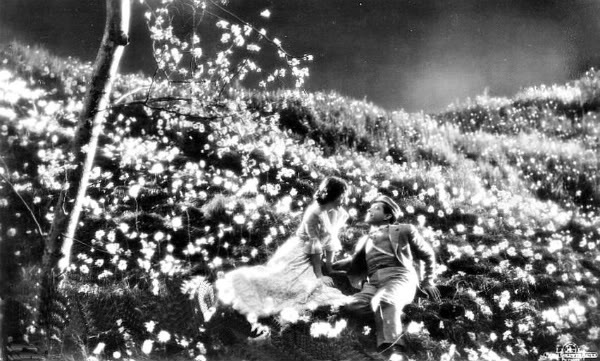
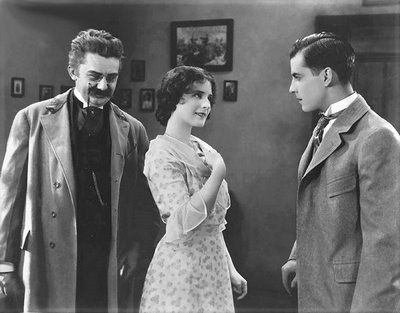
Crown Prince Karl Heinrich, nephew of the king of a small domain, has a joyless existence in the pretentious formalism of the moribund court until
his tutor, Dr. Juttner, arrives. After several years, Juttner takes Karl Heinrich to Heidelberg to study at the university. Here the prince falls in love
with Kathi, the niece of the owner of an inn where the tutor and the prince have taken rooms. Karl Heinrich's happiness is shattered when the king
dies and he must return to take the throne. Lonely and still in love with Kathi, although he is betrothed to an unattractive princess, Karl Heinrich
returns to Heidelberg and finds that everything has changed: the students who were once his comrades salute him stiffly; his tutor has died; and
only Kathi welcomes him as of old. After brief reunion they part again, for the Princess Ilse and he are celebrating their betrothal.
Summer of '42***1/2 1971
http://en.wikipedia.org/wiki/Summer_of_%2742
http://www.jenniferoneill.com/
A surprise success in 1971 ($20 million worth of "surprise"), The Summer of '42 is a coming-of-age piece, drenched in nostalgia. Director Robert Mulligan narrates the film as the grown-up counterpart of Hermie (Gary Grimes), a teenager of the War Years who has a crush on twentyish Jennifer O'Neill. With O'Neill's soldier husband off to war, Grimes convinces himself that he can take hubby's place in every way. O'Neill is amused by Grimes' attentions (confined to doing chores and carrying her groceries), but never thinks of him in sexual terms. And then, O'Neill's husband is killed in battle. Herman Raucher based his intensely nostalgic script on his own experience, going so far as to use the real names of past acquaintances (including the Jennifer O'Neill counterpart) as character names in his screenplay. An Academy Award went to Michel LeGrand's evocative musical score. Summer of '42 was later novelized by Raucher, then followed up on screen by the less effective Class of 44. ~ Hal Erickson, All Movie Guide
Sunday In New York***1/2 1963
http://www.answers.com/topic/sunday-in-new-york-1
This great movie had a real early 60's feel. The film started with a swingin' vocal by Mel Torme, and the jazzy follow-up really set
an upbeat mode. It would be hard to make this kind of film shortly after, with the devastating assassination of JFK. The dialogue
is intelligent, witty, and tasteful. The story questions various outlooks on morality with realistic innocence...if there is such a thing!
Great acting by Rod Taylor, Robert Culp and Cliff Robertson, but Jane Fonda runs away with the show.
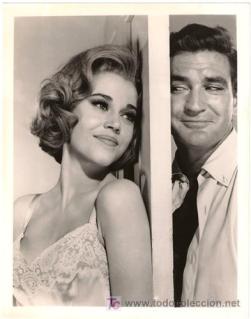
Airline pilot Adam Tyler's plans to spend a romantic weekend in his New York apartment with Mona Harris are interrupted by the unexpected arrival of his sister Eileen, who has just quarreled with her fiancé, Russ Wilson, because she refuses to sleep with him before marriage. After assuring Eileen that she has done the proper thing and advising her to remain a virgin, Adam persuades Mona to accompany him on his next flight. His assignment is changed at the last minute, however, and he is unable to reach Mona, who is stranded in a strange city. Meanwhile, Eileen finds evidence of her brother's double standard, and when she meets Philadelphia newspaperman Mike Mitchell on a Fifth Avenue bus, she becomes determined to seduce him. Mike respects her virtue and is reluctant to comply, even though both of them soon realize they are falling in love. After getting caught in a downpour, they take refuge in Adam's apartment and are surprised by the arrival of a forgiving Russ, who mistakes Mike for Eileen's brother. Upon his return Adam is introduced as his own co-pilot but goes along with the masquerade, even though he suspects the truth. The situation is resolved later that evening: Mike and Eileen admit their love; Russ, believing that Eileen has been unfaithful to him, admits defeat; and Adam decides it will be easier to marry Mona than to arrange illicit meetings with her.
Sunrise****1/2 1927
http://www.filmsite.org/sunr.html
http://www.imdb.com/title/tt0018455/synopsis
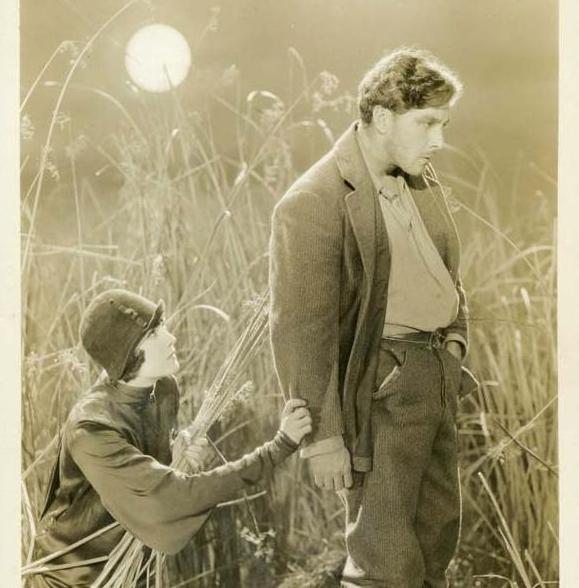
A Woman From The City (Margaret Livingston) travels to the country on a summertime vacation, and lingers in one particular lakeside town for weeks. One night she puts on a slinky black dress and wanders through town to a farmhouse where The Man (George O'Brien) and The Wife (Janet Gaynor) live with their infant child. She whistles from outside to the Man, who is sitting dejectedly at a table his wife is setting for dinner. The Man--with whom she has been having an affair--notices the Woman waiting for him outside and motions her to meet him nearby. He changes his coat, and leaves his wife and child alone in the house. The Wife, seeing her husband has left, leaves the empty dinner table to cry on her childs pillow. The Man walks through the moonlit woods to the shore of the lake where the Woman is waiting for him. The Woman seduces The Man into thinking that he should sell the farm and move with her to The City. Images of the big city, brass bands, and bright lights flash above them as they lie together among the reeds. When she suggests he could drown his wife, he objects violently at first but reluctantly agrees. They decide he will take her on a trip to The City, drown her on their way across the lake in a small boat, then sink the boat to make it look like an accident. The Man would then use bundles of reeds secretly placed in the boat to swim ashore on. The Wife happily agrees to go on the trip, yearning for any bit of time and affection from her emotionally distant husband. The next day, the Man and the Wife set off across the lake, but she soon grows suspicious of his strange behavior. Halfway across, the Man stands up menacingly and prepares to throw the Wife overboard. Looking into her eyes as he stands over her, he realizes he can't do it. He sits back down and begins rowing frantically. When the boat lands on the other shore, the Wife flees and the Man follows, begging her not to be afraid of him.
Eventually, the couple board a trolley that takes them into the City, and once there, the Wife runs from the Man in a state of fear and confusion into the busy street. The Man catches her and pulls her to safety. Together they wander the City, the Wife still fearful and unsure of the Man's intentions toward her. Slowly, she begins to grant forgiveness as he buys her a bouquet of flowers. Soon after, they see a church where a wedding is being performed. They go inside and watch as a young couple exchange their vows. The Man breaks down in terrible guilt and shame, realizing how horrible a husband he has been to her and begs forgiveness. After a tearful reconciliation, they leave the church and wander into the street gazing into each other's eyes, oblivious to the busy traffic around them. As they lose awareness of all but each other, the busy street slowly dissolves into an idyllic wooded meadow, where they kiss in a passionate embrace. When they come to their senses, they suddenly find themselves back in the middle of the city street again with traffic stopped around them. They wander giddily around the City, looking at wedding pictures in a window, visiting a barber shop, and having their picture taken. Making their way to a bustling amusement park, they play games, dance to a country tune, and in a state of marital bliss, dreamily imagine angels floating above their heads. As darkness falls and they leave the amusement park to board the trolley for home, fireworks light up the sky.
Soon they are drifting peacefully back across the lake under the moonlight. They pass a skiff filled with festive people, and the Wife falls asleep in the Man's arms. A storm begins to blow through the city, dispersing the people from the streets and the amusement park. As the storm reaches the lake, the Man tries desperately to keep them afloat, but the wind and waves become so violent that the boat begins to sink. The Man remembers the two bundles of reeds he placed in the boat earlier while planning the Wife's murder, and ties the bundles around her. They cling together as a wall of water hits them and the boat capsizes. The storm passes and the Man awakes on the rocky shore, where he calls repeatedly for his wife in vain. He gathers the townspeople to search the lake in boats for the Wife, but all they find is a broken bundle of reeds floating in the dark water.
The Woman From The City, who has waited patiently in the town to find out if their plan was successful, wakes to the frantic mobilization of the townsfolk and leaves to watch the activity from the shadows. Convinced the Wife has drowned, the grief-stricken Man stumbles home and sobs uncontrollably on the Wife's empty bed. The Woman goes to his house, assuming their nefarious plan has succeeded, but recoils in horror as the Man lunges at her in a murderous rage, chases her down, and begins to choke her. Someone calls to him that his wife is alive, and he releases the Woman. In stunned disbelief, he runs home to find the Wife has survived by clinging to one last bundle of reeds, and having been pulled from the lake by an old fisherman.
The Man kneels by the Wife's bed as she slowly opens her eyes and smiles radiantly at him. As the sun rises over their farmhouse, the Woman From The City leaves town, forlornly and unceremoniously, on the back of a cart, and the Man and Wife kiss as they dissolve into the sunrise itself.
Sunrise at Campobello***1/2 1960
This film was one of the first bio-pics that I watched, and influenced me in my growing interest in politics.
The look of Ralph Bellamy, pipe in mouth, grinning widely, while leaving the station aboard the train was
almost serial to me in it's lifelikeness. I found the depiction of Campobello to be an effective contrast to
the pending relationship Roosevelt would have with Washington. The film had a tenderness and warmth,
which was simply appealing. Hume Cronin and the great Greer Garson were perfect complements, as
Garson (as Eleanor) showed patience and courage, and a tinge of naive humour, while Cronyn as Louis
Howe demonstrated a sincere impatience and dry wit.
http://movies.msn.com/movies/movie-critic-reviews/sunrise-at-campobello/?silentchk=1&wa=wsignin1.0
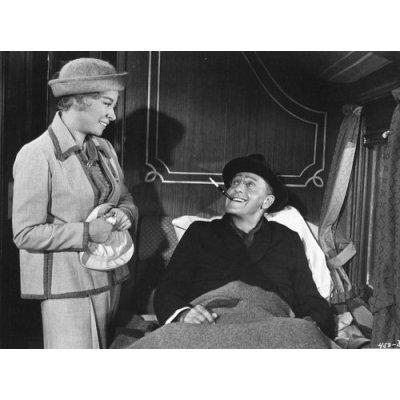
Beginning at the Roosevelt family's vacation home on Campobello Island, New Brunswick (on the Maine–Canada border), in the
summer of 1921, Franklin is depicted in early scenes as vigorously athletic, enjoying games with his children and sailing his boat.
Suddenly stricken with fever and then paralysis, subsequent scenes focus on the ensuing conflict in the following weeks between
the bedridden FDR, his wife Eleanor, his mother Sara, and his close political adviser Louis Howe over FDR's political future. A
later scene portrays FDR literally dragging himself up the stairs as, through grit and determination, he painfully strives to
overcome his physical limitations and not remain an invalid. In the final triumphant scene, FDR is shown re-entering public life
as he walks to the speaker's rostrum at a party convention, aided by heavy leg braces and on the arm of his eldest son James.
Swan, The***1/2
http://www.tcm.com/tcmdb/title/1726/The-Swan/full-synopsis.html
http://en.wikipedia.org/wiki/The_Swan_(film)
VIDEO
http://www.tcm.com/mediaroom/video/279672/Swan-The-Movie-Clip-Fencing-Lessons.html
http://www.tcm.com/mediaroom/video/279673/Swan-The-Movie-Clip-This-Air-Of-Yours.html
Frances Howard starred as Princess Alexandria in the 1925 silent version of Ferenc Molnar's play The Swan; Lillian Gish assumed the role
in the 1930 talkie version. The third and final adaptation starred Grace Kelly, who had one slight advantage over her predecessors; she
would soon become a real princess instead of a make-believe one. And don't think that MGM, knowing full well that Grace would retire from
moviemaking upon ascending the throne of Monaco, didn't carefully select the timeworn Molnar play for the express purpose of extra
publicity. Outside of its mercenary considerations, The Swan is an enjoyable bittersweet tale of a princess who falls in love with her
handsome tutor (Louis Jourdan), only to be required to give him up in favor of an arranged marriage of state. The nicest element of the
story is that the prince to whom Kelly is engaged, as played by Alec Guinness, is a decent sort, who voluntarily asks for the princess' hand
instead of forcing the issue. Of course, the issue has been forced upon him when he realizes the depth of the love Kelly harbors for her
tutor. It may well be that this version of The Swan will be the last; on the other hand, who'd a' thunk that someone would want to make
Sabrina again in 1995
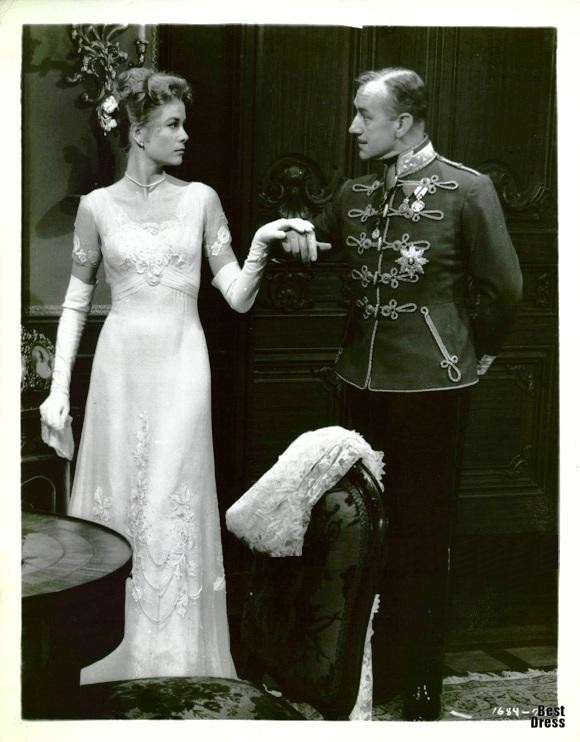
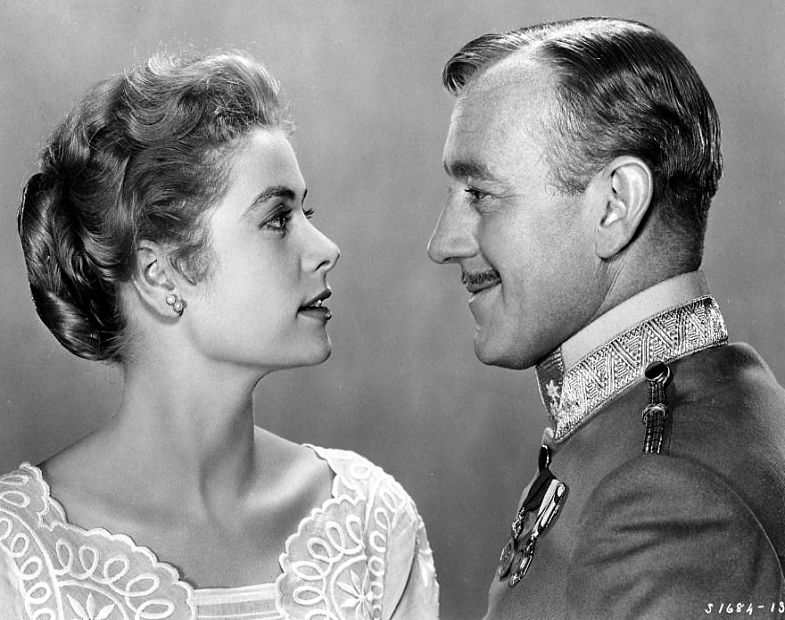
Sweet and Lowdown**** 1999
http://en.wikipedia.org/wiki/Sweet_and_Lowdown
A beautifully crafted film with a powerful historical background. The jazz-musician, played by Sean Penn
is a tormented, confused, and not totally sympathetic character. Penn is perfect, as he moves from gig to gig,
and relationship to relationship with a strangely intense indifference. We also learn that the evolution of jazz
seems to rely on characters like the protagonist Emmet Ray, who are resolute and resilient.
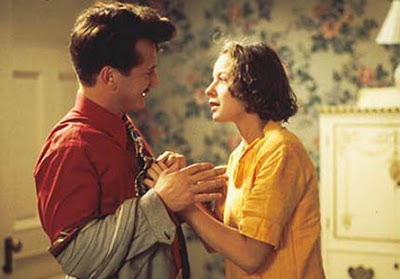
If you are a student of jazz history, you are aware that Emmet Ray, the subject of Woody Allen’s Sweet and Lowdown, really
didn’t exist. But he could have. He resembles many of the jazz musicians I knew in the 1940s, including the tenor who employed
Redi-Whip, soon after its appearance on the market, in a non-dessert application; or the cats in a college combo who camped
out on a Midwestern hill top for six hours until dawn just to jam on "The World Is Waiting For Sunrise."
Emmet Ray is quirky, perhaps, yet true to jazz life. At one point in his career he is living off the money earned by a couple of
prostitutes, a practice not unheard of in jazz circles beginning with Buddy Bolden and Jelly Roll Morton. When I was in Chicago
in the later 1940s, I encountered several local musicians who were "managers," a term Emmet also prefers to the phrase pimp.
Like many jazz legends, Emmet is an anti-hero, but his guitar playing – beautifully ghosted by the highly artistic Howard Alden
– makes up for his multitude of sins.
Emmet is also a traveler who not only tours America but has played extensively in Europe. The fictional guitarist lived at a time
when jazzmen were first traversing the country, spreading consciousness of jazz even to American audiences who were beyond
the modest reach of radio and recordings. This original American art form (notwithstanding historian Arthur Schlesinger’s
comment that the only original American art form was film) not only spread across the country but to Europe in the 20s and 30s.
The way was paved by such men as Louis Armstrong and Duke Ellington who were welcomed enthusiastically when they appeared
on the other side of the Atlantic – Armstrong in 1932 and Ellington in 1933.
The audience for these giant talents included foreign musicians who modeled themselves after the American originators. Many
Europeans played on a high level but only one became a major influence on American jazzmen – the gypsy guitarist, Django
Reinhardt.
Sweet Charity*** 1964
VIDEO
http://www.tcm.com/mediaroom/video/1034288/Sweet-Charity-Original-Trailer-.html
http://www.tcm.com/this-month/article/87919%7C0/Sweet-Charity.html
Charity Hope Valentine (Shirley MacLaine) works as a taxi dancer along with her friends, Nickie (Chita Rivera) and Helene (Paula Kelly). She
longs for love, but has bad luck with men, being robbed and pushed off a bridge in Central Park by one ex-boyfriend. She has another
humiliating encounter with Vittorio Vitale (Ricardo Montalban), a movie star.
After failing to find a new job through an employment agency, Charity meets shy Oscar Lindquist (John McMartin) in a stuck elevator. They
strike up a relationship, but Charity does not reveal what she does for a living. When she finally does tell Oscar, he initially seems to accept
it, but finally tells Charity that he cannot marry her.
The optimistic Charity faces her future, alone for the time being, living hopefully ever after.
Certainly not a flawless film...but it's full of energy, vivid, over the top and most of all, Shirley MacLaine can't help being spell-binding.
And the courtship scene in the restaurant...almost as if Chaplin directed it. Choreography...outrageous and sexy....playful delight.
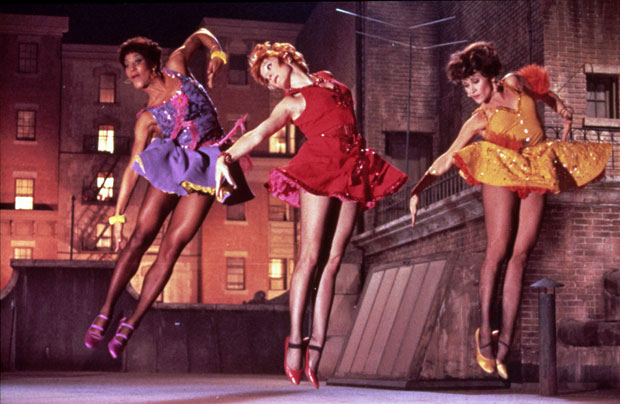
Sweet Hereafter, The **** 1997
http://rogerebert.suntimes.com/apps/pbcs.dll/article?AID=/19971223/REVIEWS/712230301/1023
A terrific documentary style film, that leaves you with the impression that this must have been a true
story to exactness. It was a true story, but only based on a similar accident that took place in Alton Texas
in 1989.
The characters are varied, but all seem mysterious, and suspicious. We are held in suspense, because we
sense there are some great secrets being withheld. It is brilliant the way the direction held back the true
details of the accident until near the end. The relationships seem to skim the surface of distrust, and we
come to realize that lies and greed will win over the truth. Great performance by Sara Polley.
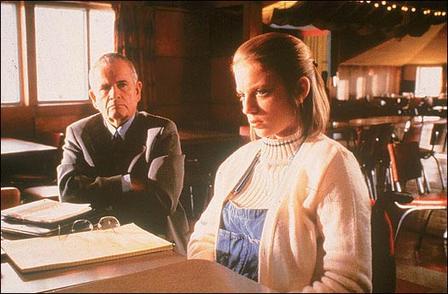
Life is difficult in a small town in British Columbia, Canada in the wake of a terrible school bus accident in which numerous local
children are killed. Hardly able to cope with the loss, their grieving parents are approached by a lawyer (Ian Holm) who wants
them to sue for damages, and who also is haunted by his dysfunctional relationship with his adult daughter. At first the parents
are reluctant to do so, but eventually they are persuaded by the lawyer that filing a class action lawsuit would ease their minds
and also be the right thing to do.
As most of the children are dead, the case now depends on the few surviving witnesses to say the right things in court. In
particular, it is 15 year-old Nicole Burnell (Sarah Polley), who was sitting at the front of the bus and is now paralyzed from the
waist down, whose deposition is all-important. However, she unexpectedly accuses driver Dolores Driscoll (Gabrielle Rose) of
speeding and thus causing the accident. When she does so, all hopes of ever receiving money are thwarted. All the people
involved know that Nicole is lying but cannot do anything about it.
Sweet Smell of Success**** 1957
This great film features crackling dialogue, which is at times poetic. Lancaster is as optimally sinister as J.
J. Hunsecker, and Curtis is perfectly devious as Sidney Falco, the press agent. The jazz club scenes seem
to create an effective setting that portrays a society moving along quickly almost unaware of what is
going on right beside them.
http://www.filmsite.org/sweet2.html
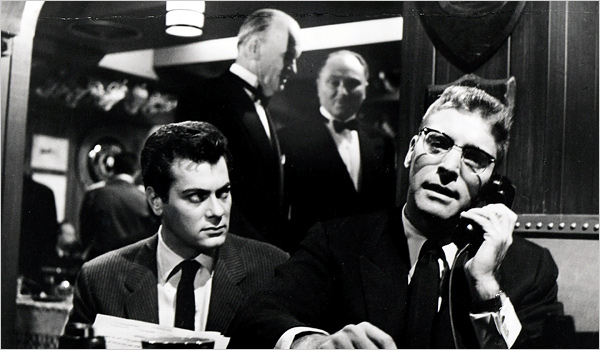
Press agent Sidney Falco (Tony Curtis) has been unable to get his clients mentioned in J. J. Hunsecker's (Burt Lancaster)
influential newspaper column because of Falco's failure to make good on his promise to break up the romance between
Hunsecker's younger sister Susan (Susan Harrison) and Steve Dallas (Martin Milner), an up-and-coming jazz guitarist.[1] Falco
decides to spread false rumors in a rival column that Dallas is a dope-smoking Communist, then to encourage Hunsecker to
rescue Dallas's reputation and make Dallas choose between his integrity and owing something to Hunsecker, for whom he has
no respect. The plan works, in a way - Dallas insults Hunsecker, and Susan breaks up with Dallas in order to protect him from
her brother. Hunsecker, however, deciding to leave nothing to chance (and against Falco's advice), orders Falco to plant reefers
on the musician and have him arrested and roughed up by corrupt police officer Harry Kello (Emile Meyer).[1]
Falco is summoned to Hunsecker's penthouse apartment by a message apparently from Hunsecker, only to find Susan about to
attempt suicide.[1] He saves her just as her brother walks in, but Hunsecker, encouraged by Susan's silence, accuses him of
trying to rape Susan. In a climactic confrontation with Hunsecker, Falco reveals to Susan that her brother had ordered him to
destroy Dallas's reputation. Hunsecker tells Kello to arrest Falco for planting the reefer on Dallas. Susan admits she attempted
to commit suicide and walks out on her brother in order to join Steve. She tells Hunsecker that she does not hate him but just
pities him. Falco is arrested by Kello and Hunsecker loses Susan.[1]
Press agent Sidney Falco (Tony Curtis) has been unable to get his clients mentioned in J. J. Hunsecker's (Burt Lancaster)
influential newspaper column because of Falco's failure to make good on his promise to break up the romance between
Hunsecker's younger sister Susan (Susan Harrison) and Steve Dallas (Martin Milner), an up-and-coming jazz guitarist.[1] Falco
decides to spread false rumors in a rival column that Dallas is a dope-smoking Communist, then to encourage Hunsecker to
rescue Dallas's reputation and make Dallas choose between his integrity and owing something to Hunsecker, for whom he has
no respect. The plan works, in a way - Dallas insults Hunsecker, and Susan breaks up with Dallas in order to protect him from
her brother. Hunsecker, however, deciding to leave nothing to chance (and against Falco's advice), orders Falco to plant reefers
on the musician and have him arrested and roughed up by corrupt police officer Harry Kello (Emile Meyer).[1]
Falco is summoned to Hunsecker's penthouse apartment by a message apparently from Hunsecker, only to find Susan about to
attempt suicide.[1] He saves her just as her brother walks in, but Hunsecker, encouraged by Susan's silence, accuses him of
trying to rape Susan. In a climactic confrontation with Hunsecker, Falco reveals to Susan that her brother had ordered him to
destroy Dallas's reputation. Hunsecker tells Kello to arrest Falco for planting the reefer on Dallas. Susan admits she attempted
to commit suicide and walks out on her brother in order to join Steve. She tells Hunsecker that she does not hate him but just
pities him. Falco is arrested by Kello and Hunsecker loses Susan.[1]
Sweetest Thing, The**1/2 2002
http://www.sonypictures.com/movies/thesweetestthing/
Nothing special really, except for the fact that Christina Applegate and Cameron Diaz had a combined
sense of comic timing between them, that transformed the film into a comedy classic. Parker Posey and
Jason Bateman are perfect in the supporting cast.

Christina Walters and Courtney Rockcliffe, all-around party girls, attempt to ease their roommate Jane Burns'
relationship-induced depression by taking her on a girls' night out. During that evening Christina meets Peter Donahue
(Thomas Jane) and falls for him. Peter is preparing to get married, though she and Courtney mistakenly believe it is Peter's
brother (Jason Bateman) who is going to walk down the aisle. Courtney decides to help her friend re-connect with Peter, and
the two embark on a hazard-prone trip in a Saab 9-5 from San Francisco to Somerset, where the wedding is scheduled.
Christina's hopes are dashed, however, when the girls arrive at the church only to discover that Peter is the groom.
Nevertheless, Peter's wedding soon falls apart when both he and his bride (Parker Posey) confess to each other at the altar
that while they love each other, they're not "in love" and marriage just isn't the right step. A few months go by, and Christina
still laments her missed opportunity with Peter, while both Courtney and Jane have each found new relationships of their own.
After a night of clubbing, the girls come home to find Peter curled-up and asleep on the doorstep. He tells Christina that the
marriage didn't go through, and after an awkward start, the two begin their own relationship that culminates in marriage.
Swing Time***1/2 1936
http://en.wikipedia.org/wiki/Swing_Time
http://www.tcm.com/mediaroom/video/93731/Swing-Time-Movie-Clip-The-Way-You-Look-Tonight.html
The sixth of RKO's Fred Astaire -Ginger Rogers pairings of the 1930s, Swing Time starts off with bandleader Astaire getting cold feet on his wedding day.
Astaire's bride-to-be Betty Furness will give him a second chance, providing he proves himself responsible enough to earn $25,000. Astaire naturally tries to
avoid earning that amount once he falls in love with dance instructor Ginger Rogers. Numerous complications ensue, leading to the "second time's the charm"
climax, with Ginger escaping her own wedding to wealthy Georges Metaxa in order to be reunited with Astaire. The film's most indelible image is that of Fred
Astaire, immaculately attired in top hat and tails, hopping a freight car--a perfect encapsulation of the film's Depression-era cheekiness. The Jerome Kern
-Dorothy Fields score includes such standards-to-be as "Pick Yourself Up," "A Fine Romance," "The Way You Look Tonight," "Never Gonna Dance" and
"Bojangles of Harlem." The peerless supporting cast of Swing Time includes Helen Broderick, Victor Moore, Eric Blore, and Landers Stevens, the actor-father
of the film's director, George Stevens. ~ Hal Erickson, Rovi
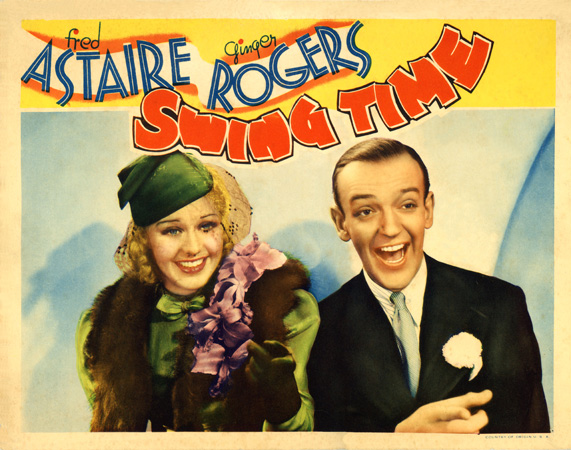
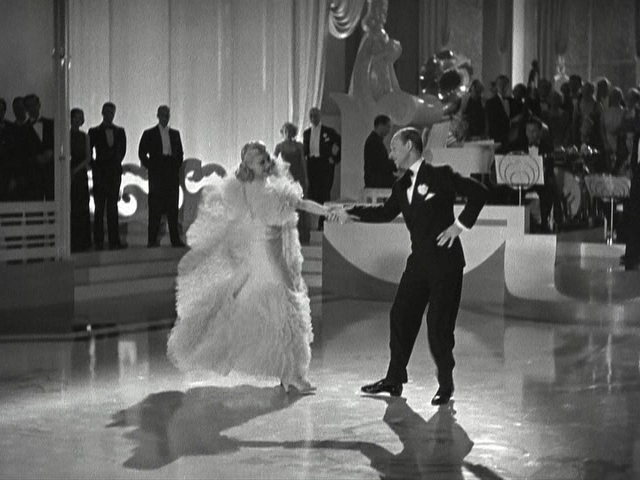
53.
Tail Spin***1/2 1939
http://www.tcm.com/tcmdb/title/92218/Tail-Spin/full-synopsis.html
VIDEO
http://www.youtube.com/watch?v=CpHcn99oXuQ
.jpg?timestamp=1353997148517)
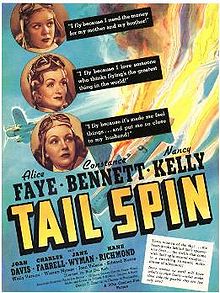
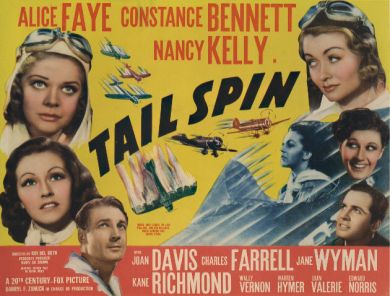
The exploits of female pilots are followed in this high-flying drama. These women are extremely competitive and will stop at nothing to win their cross-country
races. The story centers on one such determined pilot who is forced to leave the race circuit after her plane crashes. To become re-airborne she convinces
several people to sponsor her. One wealthy socialite refuses because she is a pilot too. The two women end up competing in the air and on the ground for the
love of the same fellow. Because the heroine is so well liked by the other racers, they help her win.
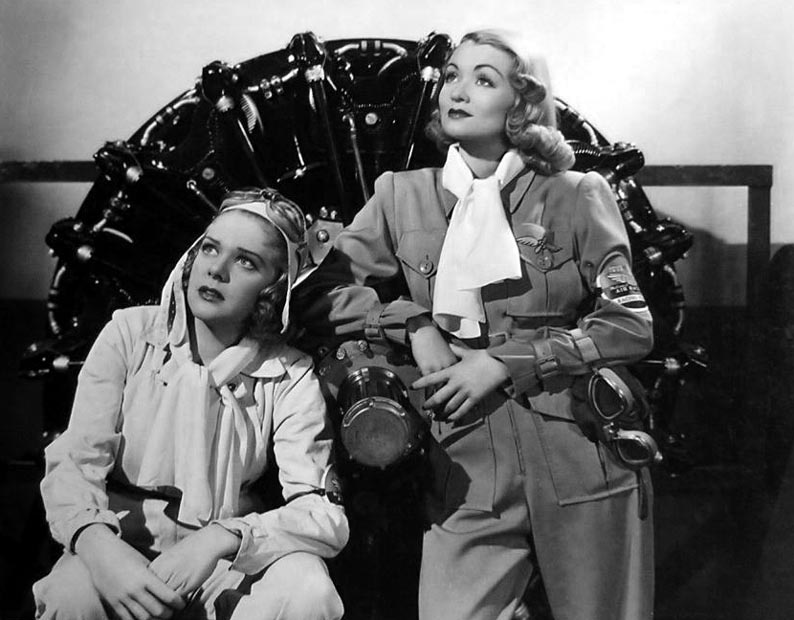
Tale of Two Cities, A**** 1935
http://movies.msn.com/movies/movie-synopsis/a-tale-of-two-cities.2/?silentchk=1&wa=wsignin1.0
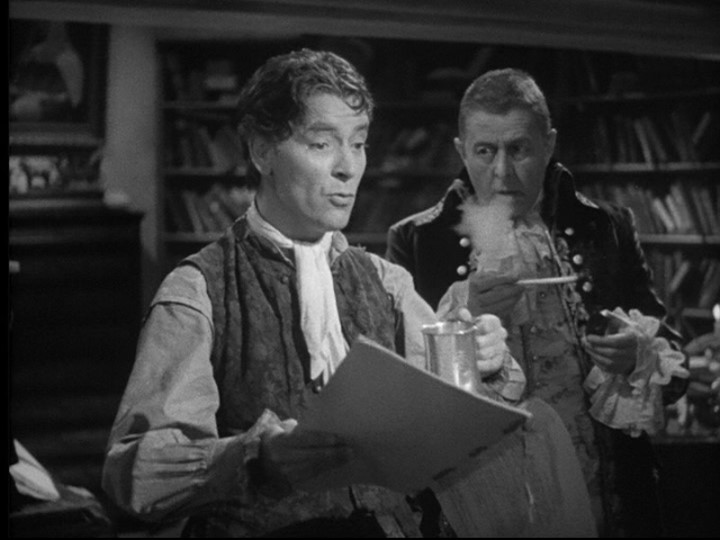
On the eve of the French Revolution, Lucie Manette (Elizabeth Allan) is informed that her father (Henry B. Walthall) is not dead,
but has been a prisoner in the Bastillefor many long years before finally being released. She travels to Paris to take her father
to her home in England. Dr. Manette has been taken care of by a friend, Ernest Defarge (Mitchell Lewis), and his wife (Blanche
Yurka). The old man's mind has given way during his long ordeal, but Lucie's tender care begins to restore his sanity.
On the trip across the English Channel, Lucie meets Charles Darnay (Donald Woods), a French aristocrat who, unlike his unfeeling
uncle, the Marquis de St. Evremonde (Basil Rathbone), is sympathetic to the plight of the downtrodden French masses. Darnay
is framed for treason, but is saved by the cleverness of the dissolute Sydney Carton (Ronald Colman). Carton goes drinking with
Barsad (Walter Catlett), the main prosecution witness, and tricks him into admitting that he lied. When Barsad is called to
testify, he is horrified to discover that Carton is one of the defense attorneys and grudgingly allows that he might have been
mistaken. Darnay is released.
Carton is thanked by Lucie, who has attended the trial of her new friend. He quickly falls in love with her, but realizes it is
hopeless. Lucie eventually marries Darnay, and they have a daughter.
By this time, the Reign of Terror has engulfed France. The long-suffering commoners vent their fury on the aristocrats,
condemning scores daily to Madame Guillotine. Darnay is tricked into returning to Paris and arrested. Dr. Manette pleads
for mercy for his son-in-law, but Madame Defarge, seeking revenge against all the Evremondes, regardless of guilt or innocence,
convinces the tribunal to sentence him to death.
Carton comes up with a desperate rescue plan. He first persuades Lucie and her friends to leave Paris by promising to save
Darnay. Then he blackmails an old acquaintance, Barsad, now an influential man in the French government, to enable Carton
to visit Darnay in jail. There, Carton drugs the prisoner unconscious, switches places with him, and has Darnay carried out to
be reunited with his family.
Madame Defarge, her thirst for vengeance still unsatisfied, goes to have Lucie and her daughter arrested, only to find that they
have fled with Dr. Manette. As she goes to raise the alarm, she is confronted by Miss Pross (Edna May Oliver), Lucie's devoted
servant. In the ensuing struggle, Madame Defarge is killed.
Meanwhile, only a condemned seamstress (Isabel Jewell) notices Carton's substitution, but keeps quiet. She draws comfort in his
heroism as they ride in the same cart to the execution place. As the camera rises just before the blade falls, Carton's voice is
heard, saying, "It's a far, far better thing I do than I have ever done. It's a far, far greater rest I go to than I have ever known."
Temptress, The**** 1926
http://www.dvdbeaver.com/film/dvdreviews17/greta_garbo_silents_dvd_review.htm
http://www.ovguide.com/movies_tv/the_temptress_1926.htm
The story opens in Paris at a masquerade party where the unhappy Elena (Garbo) meets Manuel Robledo (Antonio Moreno), an
Argentine engineer. After removing their masks, they fall in love under the stars. Later when he comes to visit his friend,
Marques De Torre Bianca (Armand Kaliz), Manuel is stunned to learn that his wife happens to be Elena. At the dinner party,
Marquis Fontenoy (Marc MacDermott), a middle-aged banker permitted by Bianca to have Elena be his mistress in order for
them to be financially secure, distracts the guests by making a startling speech on how Elena, the temptress, has ruined his life,
and dropping dead at the table after taking his drink of poison. Disgusted by the ugly truth, Manuel decides to forget Elena by
leaving for the Argentine where he accepts a water dam building project. Just as Manuel is slowly forgetting Elena, she arrive
with her husband, and by doing so, causes frustration and destruction to both men, and others as well, with Manuel, who feels
she to be responsible for the murder of his friend and husband, as well as the near destruction of his dam dynamited by his
enemy, finds he still cannot resist her.
The supporting players include Lionel Barrymore as Canterac, one of the construction workers who falls victim to Elena; Robert
Anderson as Pirovani, the friend Canterac kills because of Elena; and Virginia Browne-Faire as Celinda, the pretty young girl
who silently loves Manuel. Adding to sin and destruction is Roy D'Arcy as Manos Duros, the bandit leader, in a menacing
performance as Manuel's arch enemy who, after forcing his intentions on Elena, is challenged by Manuel to a duel, with the
bandit's method being the use of whips. The bull whip duel is one of the high points in the story, resulting to whip scars on the
bare torsos covered with blood, as well as Manos, who fights dirty, aiming for the eyes, being quite graphic for its time.
murder and sentenced to life in prison.[4]
Tender Trap, The***1/2 1955
This is not quite standard Frank Sinatra fare, although it's close. He persists in playing the same character,
the playboy with little conscience, a lust for sex, a chronic player of the field with an unstable with
career. Somehow he manages to attract empathy, despite getting into romantic jams that are his own
doing. This part was played to the hilt in A Hole Inthe Head, but he managed to be a touch more subtle
in this film. What really makes this film special is the magic created by Celeste Holm and David Wayne.
Wayne (Joe), the loyal friend is not supportive of his casanova friend (Charlie) marrying Sylvia (played
by Holm). She is a sweet, down-to-earth woman, feeling desperate to marry because she is reaching
middle age. Joe and Sylvia meet in the kitchen, and the scene that follows is one of the great romantic
dialogues on film. Joe confesses to her that he loves her, and she convinces him that he is too good a
fellow to forsake his family. It is touching and tastefully moralistic. Kudos to Wayne and Holm!
http://www.tcm.com/tcmdb/title.jsp?stid=444
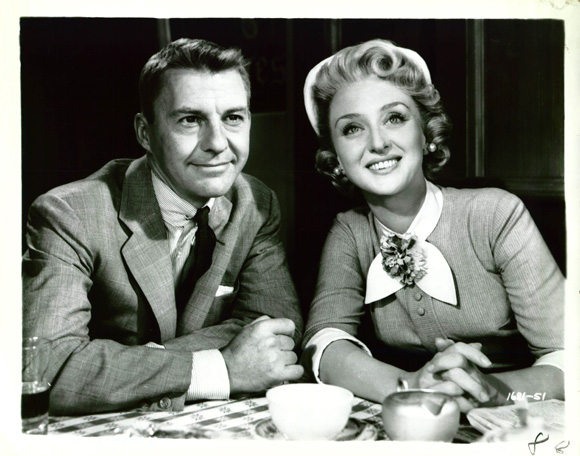
Charlie Y. Reader (Frank Sinatra) is a 35-year-old theatrical agent in New York, living a seemingly idyllic life as a bachelor.
Numerous females (among them Lola Albright, Carolyn Jones and Jarma Lewis) come and go, cleaning and cooking for him.
Charlie's best friend since kindergarten, Joe McCall (David Wayne), who has a wife named Ethel and children in Indianapolis,
comes to New York for a stay at Charlie's apartment, claiming that the excitement is gone from his 11-year marriage and that he
wants to leave his wife. Joe envies and is amazed by Charlie's parade of girlfriends, whilst Charlie professes admiration for Joe's
married life and family.
At an audition, Charlie meets singer-actress Julie Gillis (Debbie Reynolds). She has her life planned to a tight schedule,
determined to marry and retire from performing to a life of child-rearing by 22. Although at first she wards off Charlie's
advances, she comes to see him as the ideal man for her plans. Julie demands that Charlie stop seeing other women. Charlie
balks, but he begins to fall in love with her.
Joe has begun dating Sylvia Crewes (Celeste Holm), a sophisticated classical musician and a typically neglected lover of Charlie's.
Sylvia is approaching 33 and desires marriage as much as the younger Julie does.
One day, annoyed by Julie and possibly jealous of Joe's attentions, Charlie blurts out a proposal of marriage to Sylvia. She is
thrilled, only to discover the morning after their engagement party that he has proposed to Julie as well.
Joe confesses his love to Sylvia and asks her to marry him. She turns him down, knowing that he loves his wife and children.
Sylvia reminds Joe that girls turn into wives when they marry and she wants the same things Ethel does. On her way out, Sylvia
runs into a charming stranger near the elevator who clearly wants to get to know her much better. Joe packs up and returns to
Indiana to his wife. Charlie, his other girlfriends also having moved on with their lives, leaves for Europe for a year.
Charlie returns just in time to see Sylvia marrying the new man in her life. She flips him the bridal bouquet. Julie is also at the
wedding. Charlie tosses the flowers to her, then asks her to marry him. She agrees and they kiss.
Ten North Frederick***1/2 1956
http://garycooperscrapbook.proboards.com/index.cgi?board=moviestills50s60s&action=display&thread=352
A classic soap. This was one of the few great performances by Gary Cooper, who I find generally wooden
and expressionless. The not totally believable romance between Cooper's character (Joe Chapin) and the
young and exceptionally beautiful Kate (Suzy Parker), maintained our interest because of the apparent
blindness of the lovers, and the dark ambiguity of Chapin's wife, played perfectly by Geraldine Fitzgerald.
One of my favourite actresses, Diane Varsi, played Chapin's troubled but sweet and sincere daughter. She
gave the story balance and allowed us to empathize with the Chapin family. The movie, based on John
O'Hara's novel, was typically a melodrama, held together by a series of scenes which used coincidence,
and situational irony to maintain our interest. Pure storytelling...nothing brilliant, but in some way impelling.
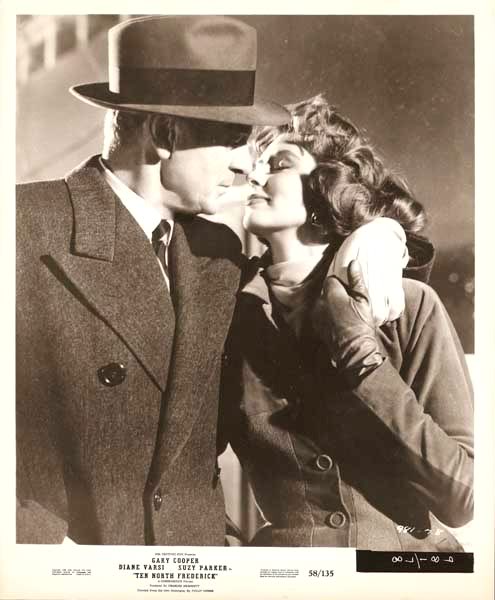
In April 1945, outside the titular address in the fictional town of Gibbsville, Pennsylvania, a radio reporter is describing the
funeral of distinguished attorney Joseph Chapin. While his shrewish wife Edith delivers his eulogy, daughter Ann thinks back to
Joe's fiftieth birthday celebration five years earlier.
Via a flashback, we learn rebellious ne'er-do-well son Joby has been expelled from boarding school and wants to pursue a career
as a jazz musician, a decision Edith feels will harm the family's reputation. The ambitious woman is determined to get Joe
elected lieutenant governor, and she uses her wealth, political connections, and social influence to achieve her goal.
Threatening this ambition is Ann's secret marriage to trumpet player Charley Bongiorno, who seduced and impregnated the naive
girl. Corrupt power broker Mike Slattery and district attorney Lloyd Williams intervene. They threaten to charge Charley with
statutory rape if he refuses to accept their bribe and agree to an annulment. Shortly after, Ann suffers a miscarriage, and when
she learns her father condoned the deal that drove her husband away, she leaves home and moves to New York City.
Fearing repercussions from Ann's situation, party leaders refuse to back Joe in the election. He withdraws from the race, much
to Edith's dismay. Angry with her husband, she reveals she once had an affair with Lloyd and bitterly tells him she wasted her life
ministering to a failure. Deeply depressed by the turn of events, Joe begins to drink heavily. On a business trip, he meets Ann's
roommate, model Kate Drummond. The two fall into a relationship, and during a weekend getaway Joe presents her with a ruby,
a Chapin family heirloom. When the young woman's friends mistake Joe for her father, he realizes that he's unable to handle
their huge age difference and ends the affair. Joe's alcoholism takes its toll on his health but he refuses medical attention.
Learning her father is dying, Ann returns home. Joe asks her about Kate. She tells him her roommate is about to wed, although
she suspects Kate in love with another man. Just before he dies, Joe realizes the man is himself.
At the funeral, Joby angrily accuses Slattery of betrayal and Edith of being responsible for Joe's decline. Later, just prior to
Kate's wedding, Ann is helping her friend pack when she finds the ruby. She realizes her father was Kate's true love and that he
managed to experience a brief period of happiness during his final years.
Terms of Endearment**** 1983
http://www.filmsite.org/terms.html
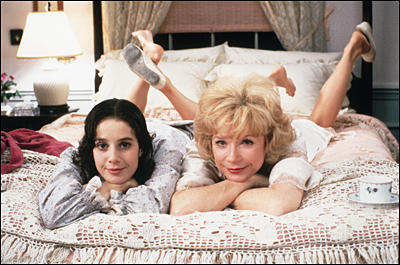
Aurora (Shirley MacLaine) and Emma Greenway Horton (Debra Winger) are mother and daughter searching for love. Beginning
with Emma's early childhood, Aurora reveals how difficult and caring she can be by nearly climbing into Emma's crib in order to
make sure her daughter is breathing—only to be reassured once Emma starts crying.
The film follows both women across several years as each find their reasons for going on living and finding joy. Emma's
marriage to Flap Horton (Jeff Daniels) becomes loveless, thanks mostly to his philandering, and she finds a lover in Sam Burns
(John Lithgow). Aurora cultivates the attention of several gentlemen in the area but is attracted to the ne'er-do-well retired
astronaut Garrett Breedlove (Jack Nicholson), developing a tenuous relationship.
Emma returns home after leaving her husband after overhearing a conversation suggesting he is having an affair with a grad
student. There are consequences for Aurora, however: the brief appearance of Emma and her children spooks Garrett into
reassessing his relationship with Aurora and breaking it off with her. Emma attempts reconciliation with Flap accepting that
they both made mistakes. She ends the relationship with Sam, but discovers that her husband is still cheating on her.
On a scheduled checkup with the doctor, Emma is diagnosed with cancer. After taking a few tests, it is determined to be
terminal and incurable. Flap and Aurora remain by her side in the hospital. After discussions with Flap (while not acknowledging
her infidelity), Emma and Flap reconcile. Emma talks to her children, telling them both she loves them and even if they disagree,
she knows they love her as well.
Aurora maintains a vigil at Emma's side, and is the only person to watch her die—Emma looks at Aurora one last time and passes.
At film's end, Emma and Aurora's friends and family gather at Aurora's home for a wake. Tommy,[who?] remorseful, is
approached by Garrett, who takes his mind off the wake by talking to him about swimming, baseball and being an astronaut.
Flap consoles his younger son. The film closes on Aurora, holding her grandchild Melanie.
Terror on a Train**** 1953
http://www.tcm.com/tcmdb/title/719/Terror-on-a-Train/
VIDEO
http://www.youtube.com/watch?v=uPUCuvZlgB4
Media gallery only
In the English city of Birmingham, police constable Charles Baron (John Horsley) is involved in a confrontation with a man believed to be a local vagrant.
The man gets away, but he is soon found out to have been a saboteur, who has left a suitcase full of detonators and bomb-making components at the
railway yard. Police realise that the man was attempting to sabotage a trainload of sea mines, destined for the Naval Yard atPortsmouth. The train is
stopped as soon as possible in case an explosion is imminent, but a residential area is nearby and the police have to evacuate local residents.
The local authorities get in contact with former Royal Canadian Artillery bomb specialist Peter Lyncort (Glenn Ford), who is living in the city with his
French-Canadian wife Janine (Anne Vernon) and working for Vickers-Armstrongs, Ltd. Lyncort agrees to help, when the city's security chief Jim
Warrilow (Maurice Denham) calls. Lyncort's wife is not there, as she had walked out on him after their tenth fight in just one month.
Lyncort begins opening the trainload of mines one by one. They are hollow and a small explosive charge hidden inside any one could explode the
whole train. The work is slow as well as dangerous, and Warilow joins in as Lyncort's assistant. They find an explosive charge and Lyncort disarms it.
Meanwhile the police plan to catch the saboteur in Portsmouth, in case he goes there to see the fruits of his labours, like an arsonist who stays at the
scene of his crime. Constable Baron is flown by helicopter to the railway station in Portsmouth. He recognizes the suspect, who is apprehended, flown
back to Birmingham, and taken to the stopped train. Lyncort tells him the bomb has been disarmed, but the saboteur becomes agitated. There is a
second bomb and it is due to go off at any moment, killing them all and devastating the neighbourhood. However, it has a chemical fuse, whose timing
may be somewhat inaccurate.
Janine, meanwhile, remains unaware of all this. Coming home at 3 am to make up with Lyncort, she finds their room empty and starts making phone
calls to all the local hospitals, fearing Lyncort has been involved in an accident. Eventually, Janine finds out where her husband is and arrives just in
time to see him find the second bomb. He throws it away from the train and it explodes harmlessly in mid-air.
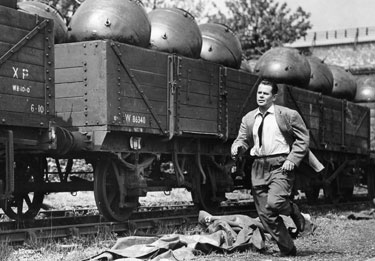
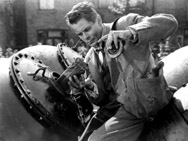
Thank Your Lucky Stars***1/2 1943
VIDEO
http://www.tcm.com/mediaroom/video/122006/Thank-Your-Lucky-Stars-Original-Trailer-.html
http://www.tcm.com/tcmdb/title/1180/Thank-Your-Lucky-Stars/
Most of the "cavalcade of stars" films are pretty unbearable, but this one is the exception. The endless
series on Eddie Cantor one-liners was almost overdone, but the director managed to fit in enough talent
and quality musical numbers to keep him funny. The musical numbers were well above the average
Hollywood fare, possibly because they were not over-produced. the highlight was clearly the tongue-in-
cheek number called "The Dreamer" performed surprisingly well by Olivia de Havilland and Ida Lupino.
Hattie McDaniel performed "Ice Cold Katie", and Bette Davis used her limited talent to perfection in
singing "You're Either Too Young or Too Old". The appearance of Humphrey Bogart in a self parody was
quite amusing. Nothiong but entertaining.
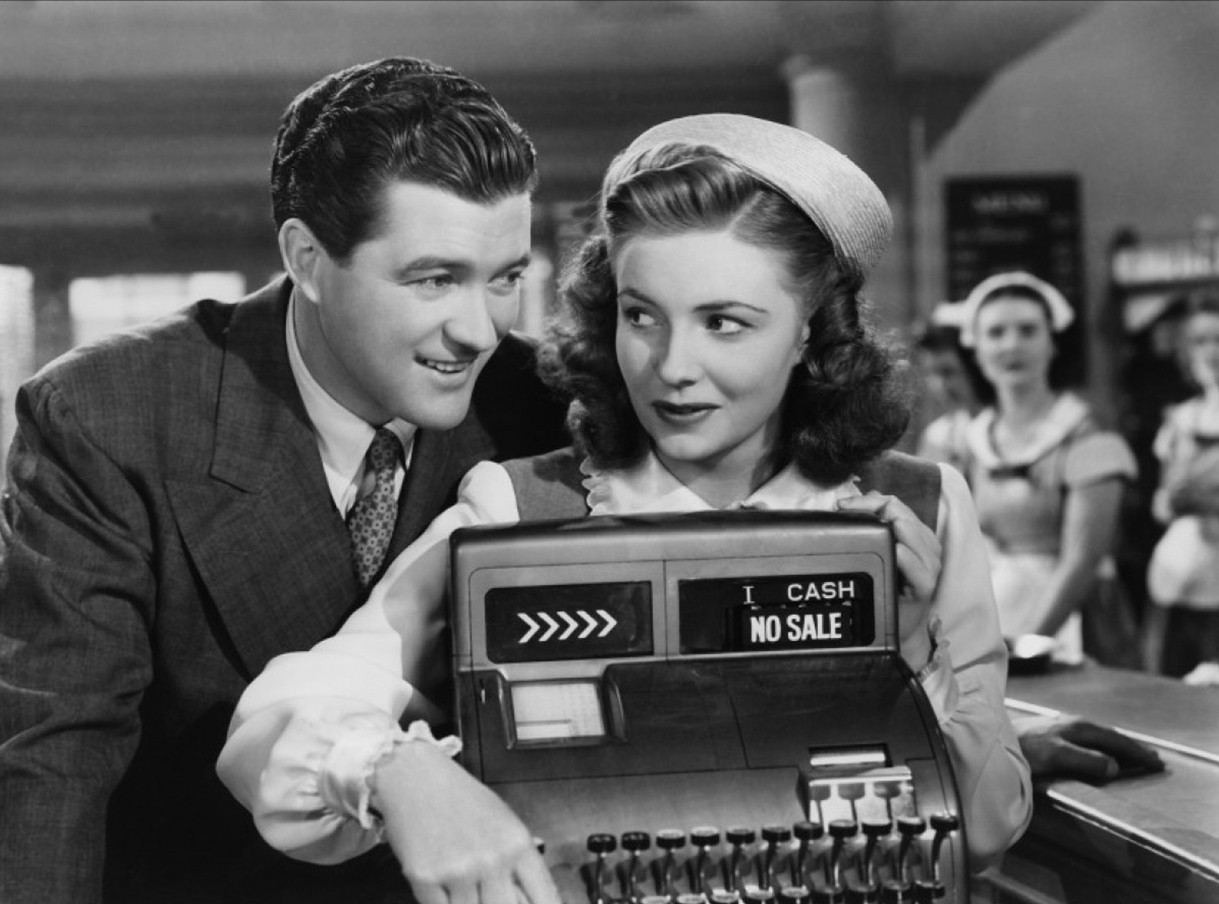
Thank Your Lucky Stars (1943) is a film made by Warner Brothers as a World War II fundraiser. It was directed by David Butler
and starred Eddie Cantor, Dennis Morgan, Joan Leslie, Edward Everett Horton and S. Z. Sakall.[1][2]
The film was a musical with a slim plot, involving theater producers (Horton and Sakall) staging a wartime charity program, only
to have the production taken over by their egotistical star (Eddie Cantor, playing himself). Meanwhile, an aspiring singer
(Morgan) and his songwriter girlfriend (Leslie) conspire to get into the charity program by replacing Cantor with their look-alike
friend, tour bus driver Joe Simpson (also played by Cantor, in a dual role).
Many of Warner Brothers stars performed in musical numbers, including several who were not known as singers. The film
features the only screen musical numbers ever done by Bette Davis, Errol Flynn, Olivia de Havilland, and Ida Lupino. Each of the
cast members was paid a $50,000 fee for their appearance which was then donated to the Hollywood Canteen. [3]
The film was popular with audiences, and the critic James Agee called it "the loudest and most vulgar of the current musicals.
It is also the most fun." [4] Ticket sales combined with the donated salaries of the performers raised more than two million
dollars for the Hollywood Canteen. [5]
That Hamilton Woman**** 1941
VIDEO
http://www.tcm.com/mediaroom/video/185762/That-Hamilton-Woman-Movie-Clip-Have-You-Got-A-Mirror-.html
http://www.criterion.com/films/3559-that-hamilton-woman
http://www.dycks.com/vivienleigh/films/hamilton.htm
http://teaattrianon.blogspot.ca/2009/06/that-hamilton-woman-1941.html
The film tells the story of the rise and fall of Emma Hamilton (Vivien Leigh), dance-hall girl andcourtesan, who became mistress to
Admiral Horatio Nelson (Laurence Olivier). The story begins with a decrepit, now-alcoholic Lady Hamilton thrown into debtor's prison
in the slums ofCalais, and shows her past life by means of a flashback, as she narrates the story to her skeptical fellow inmates. In
one of the early scenes that launches the flashback, Emma, well past her prime, looks into a mirror and remembers "the face I
knew before," the face of the young, lovely girl who captured the imagination of artists - most notably George Romney andJoshua
Her early life as the mistress of the charming but unreliable Charles Francis Greville leads to her meeting with Sir William Hamilton
(Alan Mowbray), British ambassador to Naples. Greville gives Emma to Sir William in exchange for relief on his debts. Despite her
shock at his betrayal, Emma comes to respect Sir William, who marries her and explains the reasons for Britain's war against
Napoleon. When Horatio Nelson arrives in Naples, Emma is soon deeply attracted to him and is impressed by his passionate
insistence on resisting Napoleon's dictatorial rule. She leaves Sir William to live with Nelson. Their idyllic life together is threatened
by the continuing war. Nelson leaves to confront Napoleon's navy in the decisive Battle of Trafalgar. After his death in the battle, she
says that nothing remained in her life.
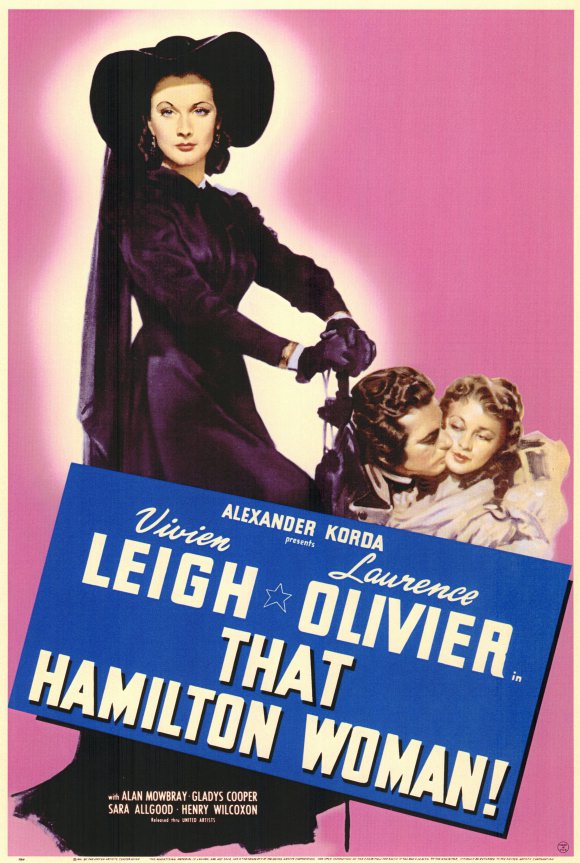
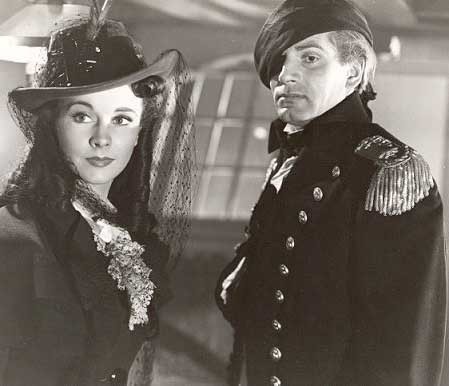
That Thing You Do!*** 2003
Just a super fun film. It was a beautifully paced, nostalgic film, with a great performance by Tom Everett
Scott as Guy Patterson, as well as some great drumming. The Theme song of the film and the fictional
group, The Wonders, captured the spirit of the film. The moment at the Patterson's Appliance store,
when the groups hit record, "That Thing You Do", is first heard on the radio, is contagiously delightfull. A
feel good experience!
http://en.wikipedia.org/wiki/That_Thing_You_Do!
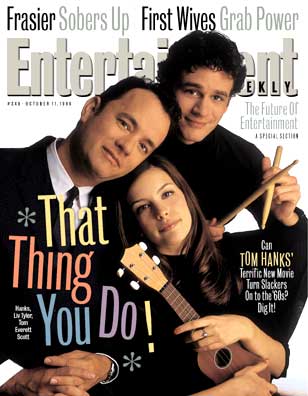
Tom Hanks made his directorial debut in this bright comedy set in the mid-1960's about a rock group and their brief fling with
fame. Guy Patterson (Tom Everett Scott) works as a salesman at his father's appliance store and plays the drums in his spare
time, fancying himself a jazz musician. One day, a buddy of Guy's tells him a local rock band, The One-Ders (it's pronounced
"wonders"), are in need of a drummer -- they have Battle of the Bands coming up and their usual timekeeper has broken his arm.
Guy agrees to sit in, but when it's time to play their best original, a love ballad called "That Thing You Do," Guy lays in a sharp,
driving beat that turns the tune into an uptempo pop-rocker. Lead singer Jimmy (Johnathon Schaech) isn't happy at first, but
guitarist Lenny (Steve Zahn) and the nameless Bass Player (Ethan Embry) think the song sounds better that way -- and they
notice the girls like it just fine. Soon people are actually requesting the song at their shows, and the One-Ders scrape together
some money to press a single of "That Thing You Do" to sell between sets. A DJ puts the song on the radio, and opportunity
knocks in the form of Mr. White (Tom Hanks), who works for the very major Play-Tone Records label. Play-Tone buys the rights
to "That Thing You Do" and puts the band on the road as their song makes it way to the top of the national charts. But what can
The Wonders (as Play-Tone have re-named them) do for an encore? And what should Guy do about his infatuation with Jimmy's
girlfriend, Faye (Liv Tyler)? Real-life 60's obsessed rocker Chris Isaak has a small part as a recording engineer, and fans of real
60's garage bands will appreciate the wealth of small, accurately observed details (for example, halfway through the film, when a
few "That Thing You Do" royalty checks have presumably kicked in, the band's inexpensive Danelectro guitars disappear and the
Wonders are suddenly playing on brand new Fender gear -- the height of rock style in 1965).
Theodora Goes Wild**** 1936
http://www.tcm.com/tcmdb/title/3797/Theodora-Goes-Wild/full-synopsis.html
VIDEO
http://www.tcm.com/mediaroom/video/338729/Theodora-Goes-Wild-Movie-Clip-You-Ought-To-Meet-Me.html
http://www.tcm.com/mediaroom/video/338730/Theodora-Goes-Wild-Movie-Clip-Sexy-Trash.html
Theodora Lynn (Irene Dunne) is a Sunday school teacher and former church organist raised by two spinster aunts, Mary (Elisabeth Risdon) and Elsie
Lynn (Margaret McWade). She also happens to be, under the pen name Caroline Adams, the secret author of a bestselling book that has the
straitlaced Lynnfield Literary Circle in an uproar. When it is serialized in the local newspaper, the Circle, led by outraged busybody Rebecca Perry
(Spring Byington), forces Jed Waterbury (Thomas Mitchell) to stop printing the salacious installments.
Theodora travels to New York City on the pretext of visiting her uncle John (Robert Greig), but actually to see her publisher, Arthur Stevenson (Thurston
Hall). Though Stevenson reassures an anxious Theodora that only he and his secretary know her identity, his wife Ethel (Nana Bryant) pressures him
into an introduction, which the book's illustrator, Michael Grant (Melvyn Douglas), overhears.
Intrigued, Michael invites himself to dinner with the Stevensons and Theodora. Theodora becomes annoyed when Michael smugly assumes that she
is a teetotaler, so she orders a whiskey. As the night goes on, she becomes drunk. So does Ethel, forcing Arthur to take his wife home and leaving
Theodora alone with Michael. When he makes a pass at her, she panics and flees, much to his amusement.
He tracks her down to her hometown and blackmails her into hiring him as a gardener, scandalizing her aunts and providing Rebecca Perry plenty to
gossip about. Michael declares that he is going to break Theodora out of her confining routine, ignoring her protests that she likes her life just the way
it is. Despite herself, she enjoys herself very much when Michael makes her go berrypicking and fishing with him. Finally, she gets up the nerve to tell
the disapproving women of the Literary Circle that she loves him. When she tells Michael what she has done, he is less than thrilled. The next day,
Theodora finds that he has gone away.
She tracks him down to his Park Avenue apartment. He admits he loves her, but then his father (Henry Kolker), the Lieutenant Governor, shows up,
followed by Michael's wife, Agnes (Leona Maricle). The estranged couple are only remaining married to avoid causing a political scandal for Michael's
father.
Theodora determines to free Michael just as he had done for her. He wants her to hold off until his father's term ends, but she is unwilling to wait that
long. To that end, she courts publicity. She finally crashes the Governor's ball and arranges for reporters to photograph her embracing Michael. Agnes
seeks a divorce to avoid looking like a fool.
Theodora returns to Lynnfield and is warmly welcomed as a celebrity, even by her now-supportive aunts. She causes further talk when she brings a
newborn baby with her. When Michael, now divorced, sees the child, he tries to flee, but then Theodora reveals that the baby belongs to Rebecca
Perry's own secretly-married daughter.
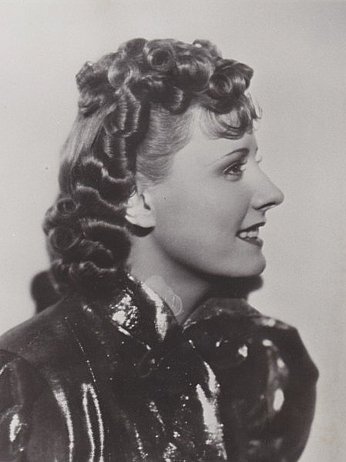
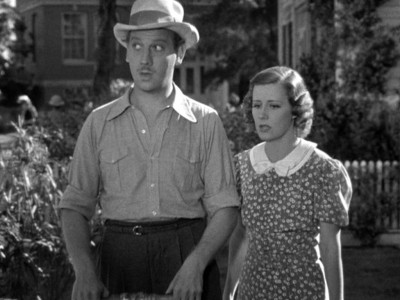
There's No Business Like Show Business***1/2 1954
http://en.wikipedia.org/wiki/There's_No_Business_Like_Show_Business_(film)
VIDEO
Like Alexander's Ragtime Band (1938), 20th Century-Fox's There's No Business Like Show Business is a "catalogue" film, its thinnish plot
held together by an itinerary of Irving Berlin tunes. The story chronicles some twenty years in the lives of a showbiz family, headed by Dan
Dailey and Ethel Merman. Two of the couple's three grown children -- Donald O'Connor and Mitzi Gaynor -- carry on the family tradition,
while the third, Johnny Ray, decides to become a priest. There are a few tense moments when O'Connor falls in love with ambitious
chorine Marilyn Monroe and loses all sense of perspective, but the family reunites during a splashy production-number finale. Highlights
include Dailey and Merman's Play a Simple Melody duet, O'Connor's A Man Chases a Girl solo, and Monroe's tempestuous rendition of
Heat Wave (her delivery and stage presence both compensate for her unflattering bare-midriff costume). Of historical interest, There's No
Business Like Show Business was Fox's first CinemaScope musical; as such, it is best viewed on TV in "letterbox" format. ~ Hal Erickson,
Rovi
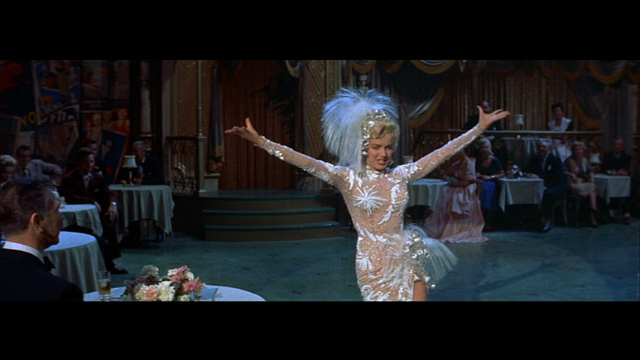
They Drive By Night**** 1940
http://www.noiroftheweek.com/2008/04/they-drive-by-night-1940.html
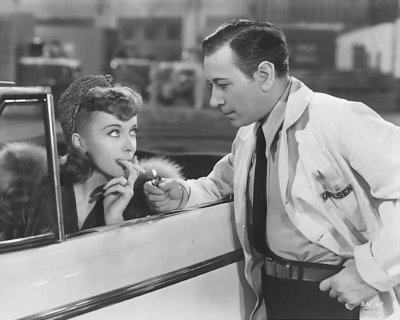
They just don't make 'em like They Drive By Night anymore. This slam-bang Warner Bros. attraction stars George Raft and
Humphrey Bogart as Joe and Paul Fabrini, owners of a small but scrappy trucking firm. The film deftly combines comedy with
thrills for the first half-hour or so, as the Fabrini boys battle crooked distributors and unscrupulous rivals while establishing their
transport company. Things take a potentially tragic turn when the overworked Paul Fabrini falls asleep at the wheel and cracks
up, losing an arm in the accident. He's pretty bitter for a while, but, with the help of his loving wife, Pearl (Gale Page), Paul
eventually snaps out of his self-pity and goes to work as a dispatcher for the Fabrinis' company. Meanwhile, Joe's on-and-off
romance with wisecracking waitress Cassie Hartley (Ann Sheridan) is threatened by the presence of seductive Lana Carlsen
(Ida Lupino), the wife of glad-handing trucking executive Ed Carlsen (Alan Hale). At this point, the film metamorphoses into a
remake of the 1935 Paul Muni-Bette Davis vehicle Bordertown. Desperately in love with Joe, Lana murders her husband, making
it look like an accident, then offers Joe half-interest in Carlsen's organization. Joe accepts the offer, but spurns Lana's romantic
overtures, whereupon the scheming vixen accuses Joe of plotting Carlsen's murder. Thus, the stage is set for a spectacular
courtroom finale, completely dominated by a demented Lana, whose "mad scene" rivals those of Ophelia and Lucia di
Lammermoor. In addition to the full-blooded performances by the stars and the virile direction by Raoul Walsh, They Drive By
Night benefits immeasurably from the nonstop brilliant dialogue by Jerry Wald and Richard Macaulay -- especially in an early
lunch-counter scene between Ann Sheridan and George Raft, generously seasoned with hilarious double- and single-entendres. ~
Hal Erickson, Rovi
They Shoot Horses, Don't They?**** 1969
VIDEO
http://en.wikipedia.org/wiki/They_Shoot_Horses,_Don%27t_They%3F_(film)
http://www.tcm.com/this-month/article/151877%7C0/They-Shoot-Horses-Don-t-They-.html
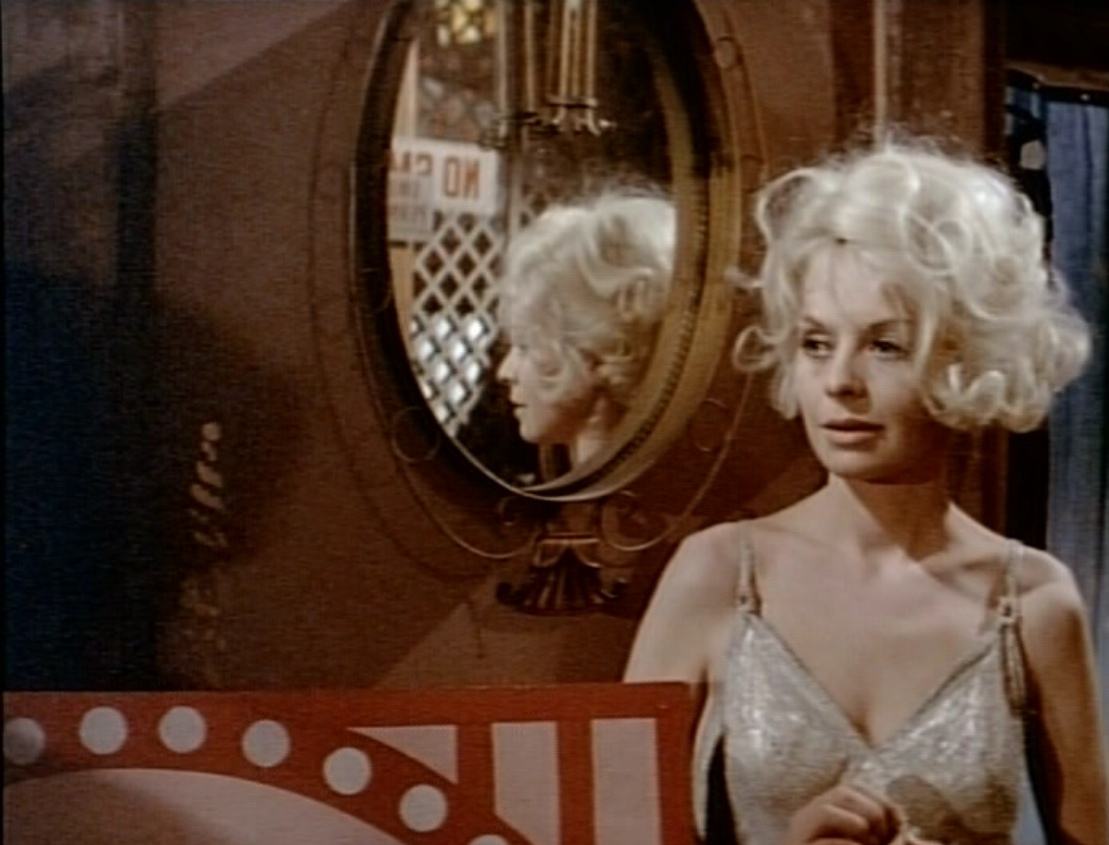
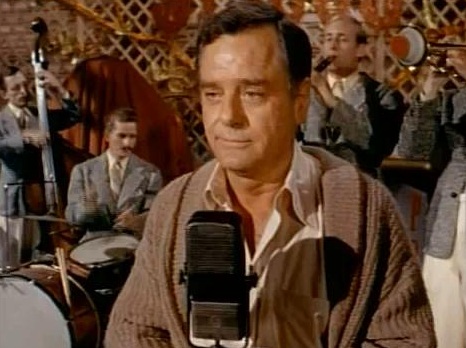
During the Depression, while awaiting execution for the murder of an acquaintance, Robert Syverton recalls the circumstances of
the crime.Wandering on an amusement pier beside the Pacific Ocean, he recalls when, as a child, he witnessed the destruction of a
favourite horse. Robert is then attracted to a dance marathon about to begin in the dilapidated Aragon Ballroom. As he watches, a
contestant is disqualified because of an ominous cough. Pressed by the man's aggressive partner, cynical Gloria Beatty, host Rocky
recruits Robert as a substitute. Among the throngs competing for the prize are a middle-aged sailor suffering from heart trouble; as
pirant actress Alice and her partner, Joel; an impoverished farm worker, James, and his pregnant wife, Ruby; and other destitute
couples. As the marathon continues the weaker pairs are quickly eliminated, while the vulnerabilities of the stronger contestants
are observed and exploited by the master of ceremonies. The theft of Alice's alternate gown stimulates mutual suspicion. After
observing Alice and Robert together, Gloria takes Joel as her partner. Joel, however, receives a job offer and quits the role.
Gloria's next partner is the sailor. To rekindle the spectators' enthusiasm Rocky stages a series of derbies in which the exhausted
contestants, clad in track suits, must circle the floor. In these races the last three couples are eliminated. As Gloria and the sailor
participate, her partner has a heart attack. Undeterred, she lifts the man to her back and crosses the finish line. Horrified, Alice
sequesters herself in the shower, where she suffers a mental breakdown. Robert and Gloria are again partners. Inspired, Rocky
suggests that they marry during the marathon. When Gloria refuses, the host reveals the contest's fraudulent nature. From the
prize will be deducted numerous expenses, leaving the winner with nothing. Rocky boasts that he stole Alice's dress to excite
spectator interest and to stimulate the rivalrous instincts of the contestants. Disgusted with this duplicity, the couple departs.
Outside Gloria attempts to shoot herself, but she cannot pull the trigger. When she requests his help Robert obliges. Questioned
by the police as to the motive for the murder, Robert can only say, "They shoot horses, don't they?"Meanwhile, the marathon
continues.
They Were Expendable**** 1945
http://en.wikipedia.org/wiki/They_Were_Expendable
http://www.tcm.com/this-month/article.html?isPreview=&id=383216%7C21808&name=They-Were-Expendable
VIDEO
http://www.tcm.com/mediaroom/video/475630/They-Were-Expendable-Movie-Clip-Rather-LIke-Back-Home.html
John Brickley (Robert Montgomery) believes in PT boats, and as a lowly U.S. Navy lieutenant stationed in the Philippines, that makes him a radical
thinker. "Your boats maneuver beautifully," an admiral (Charles Trowbridge) tells him, "but if I'm going into combat, I prefer something a little more
substantial." The gently delivered but stinging dismissal stirs the resentment of Lt. "Rusty" Ryan (John Wayne), who tartly tells Brickley that he
wants to be transferred to destroyers. The Pearl Harbor bombing makes transfer impossible, especially with the Japanese preparing to invade the
islands. So Brickley and Ryan go to work, first as message carriers between the Philippines and Corregidor, then, finally, as ship hunters. They
record some successes, but it's a doomed effort: The Americans are hopelessly outnumbered by the Japanese, and with almost all of the Pacific Fleet
destroyed at Pearl Harbor, they know help won't arrive to save them. As the Japanese push the U.S. forces back, Brickley and Ryan and their crews
hop from island to island, scrounging supplies and taking casualties but keeping up the fight. Just as it appears that they will be forced to fight on
Corregidor against the Japanese, they get rescued; they're ordered home to promote their PT-boat successes, and they take the last plane out, hoping
to return and avenge their defeats. ~ Nick Sambides, Jr., Rovi
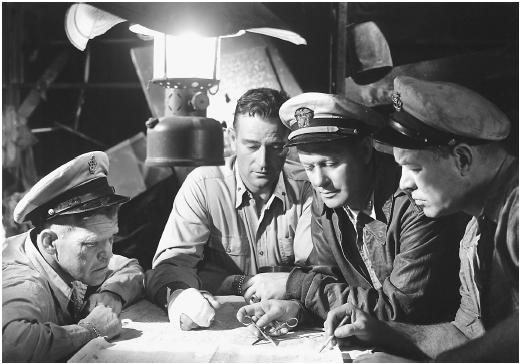
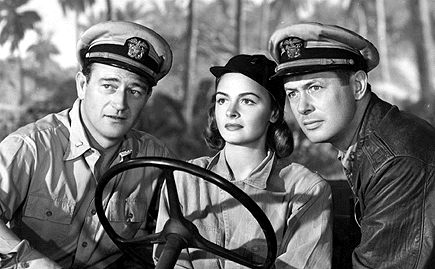
They Won't Forget****1/2 1934
http://piddleville.com/reviews/they-wont-forget-1937/
On Memorial Day, in a small Southern town, Mary Clay and her friend, Imogene Mayfield, go for a soda after they are dismissed for
the holiday from class at the local business school. Mary discovers she has left her vanity case in her desk, and when she returns to
the empty building, she is brutally murdered. Andy Griffin, the ambitious district attorney who has his eye on a Senate seat, seizes
the opportunity to create a sensational case against Robert Hale, the mild-mannered Northerner who was Mary's teacher. The trial
attracts Michael Gleason, a famous Northern attorney, to defend Hale, but he is unable to convince the jury of Hale's innocence
despite the uncertain testimonies of the president of the business school, Carlisle P. Buxton, the school janitor, Tump Redwine,
Mary's boyfriend, Joe Turner, and the barber, Jim Timberlake. Although the media accuses Griffin of fighting the Civil War in the
courtroom, his tactics are successful, and Hale is sentenced to death. Gleason appeals to the governor, who knows his professional
future hinges on his decision to commute Hale's sentence. The governor sacrifices his career and changes the penalty to life
imprisonment, but before Hale can be safely taken out of town, he is lynched by Mary's vengeful brothers. As Griffin embarks on
his race for Senator, Hale's wife Sybil demands that he accept responsiblity for her innocent husband's death, but he denies her
accusations, and only briefly wonders if justice was served.
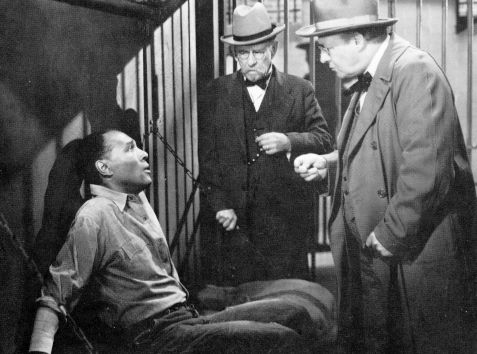
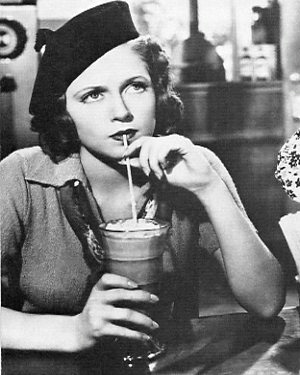
A very young Lana Turner
Thin Man Series, The
After the Thin Man**** 1936
http://obviousmag.org/en/archives/2009/06/the_thin_man_series.html
http://www.imdb.com/title/tt0027260/fullcredits
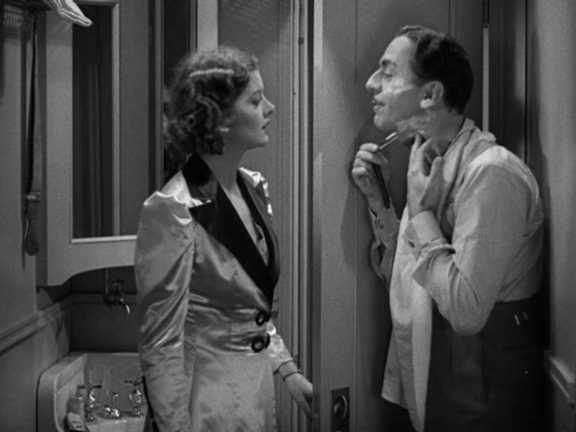
On New Year's Eve, Nick and Nora Charles arrive back home in San Francisco after Nick successfully solved the "Thin Man"
murder case in New York. Exhausted from their trip, Nick and Nora want a quiet evening at home, but discover that their house
has been taken over by a group of revelers they don't even know. When Nora's Great Aunt Katherine Forrest invites them to
dinner, Nick doesn't want to go, but agrees when Nora's cousin, Selma Landis, pleads with Nora. At Katherine's house, they
discover that Selma's husband Robert has been missing for three days. Katherine asks Nick to quietly find Robert, and, although
he is reluctant, he takes Nora to the Lichee, a Chinese nightclub that Robert frequents. Robert has been at the Lichee, drinking
and waiting for the club's entertainer, Polly Byrnes. Polly and "Dancer," one of the club's owners, are expecting to get money
from Robert and Dancer tells Polly to take Robert home. A few days previously, Robert had approached David Graham, Selma's
former fiancée, for $25,000 to leave for good. David meets Robert a short time later to give him negotiable bonds, then, after
cruelly bidding Selma goodbye, Robert walks out into the fog and is shot. When David's car drives up to Robert's body, Selma is
standing over it with a gun. Dazed, Selma gives David the weapon and he tells her not to say anything. Despite their efforts to
protect Selma, Nick and Nora are unable to prevent her arrest by Lieutenant Abrams. Though Selma says that she had not fired
her gun, David reveals that he threw it into the bay, thinking that Selma actually had killed her husband. The next day, Nick
goes to the hotel room of Phil Byrnes, a man posing as Polly's brother, but actually her husband. Upon his arrival, Nick discovers
Phil's dead body. Later, he also discovers that someone had been listening to Polly's apartment through a device in the
apartment above. Suspicious when he hears Dancer enter Polly's apartment, Nick follows him to the basement and finds the body
of the janitor. When Nora arrives at the apartment building and hears the janitor's name, Pedro, she reveals that Pedro used to
be her father's gardener. Nick then asks Abrams to have all of the suspects congregate at Polly's. Though Dancer and Polly admit
their plan to use a check forged with Robert's name, each claims to be innocent of the murders. During questioning, David says
that he remembers Pedro, a man with a long white moustache, but hasn't seen him recently. When Nick looks at a picture of
Pedro taken years before and sees that Pedro then had a small black moustache, he knows that David must be lying. Nick then
says that the murderer has finally made a slip and reconstructs the evidence to reveal that David killed Robert out of revenge,
then killed Phil when Phil tried to blackmail him. Finally, when Pedro recognized him, David was forced to kill him as well. Now
cornered, David reveals that he had been planning to frame Selma for her husbands murder. He draws a gun and threatens to
shoot Selma and then himself, but Lum Kee, Dancer's partner in the club, knocks the gun out of David's hand and David is
overpowered. A short time later, Nick and Nora leave San Francisco on the train, accompanied by Selma, who plans to start a
new life. Finally, when he is alone with Nora, Nick sees that she is crocheting a baby's sock and is shocked when she says
"And you call yourself a detective." ![]()
Thin Man, The**** 1934
http://www.filmsite.org/thin.html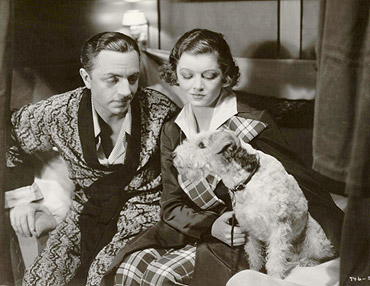
Soon after Dorothy Wynant announces to her inventor father that she plans to marry, he goes on a mysterious business trip,
promising to return in time for Dorothy's wedding. As the day approaches and Wynant fails to return, Dorothy worries, while her
mother, Mimi, is frantic that her ex-husband is unavailable to give her and her new husband, Chris Jorgenson, more money.
When Mimi goes to see Julia Wolf, Wynant's mistress, to ask for money, she finds her dead body clutching Wynant's watch chain.
Meanwhile, sophisticated former detective Nick Charles and his wealthy wife Nora have come to New York for the Christmas
holidays and become enmeshed in the case, despite Nick's protests that he is no longer a detective. Nora enthusiastically
encourages Nick, and one evening he and Asta, their terrier, discover the skeletal remains of a body in Wynant's laboratory. The
police suspect that Wynant has committed another murder, but Nick realizes that the body must be Wynant's because of a trace
of shrapnel found in the leg. Nick and Nora give a dinner party, to which they invite all of the suspects as guests. There it is
revealed that Mimi had been aiding MacCaulay, Wynant's lawyer, in exchange for cash. When Nick exposes Chris as a bigamist,
thus making Mimi realize that she will now be free to inherit Wynant's money, she incriminates MacCaulay, who had been
embezzling from Wynant with Julia's compliance. Finally, Nick and Nora and Dorothy and her new husband Tommy are on a train,
happily bound for California.
39 Steps, The ***1/2 1935
http://www.criterion.com/films/234-the-39-steps
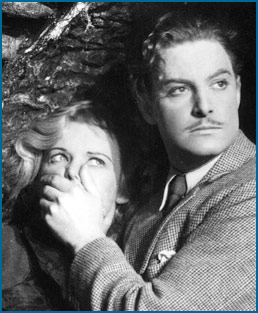
On vacation in London, Canadian Richard Hannay becomes embroiled in a spy hunt when a German double-agent, Miss Smith, is
murdered in his apartment. He is suspected of the murder, and in his search for the real murderer, he abducts an attractive
blonde named Pamela. As the two travel through Britain, Pamela comes to trust Richard, and they slowly fall in love. In the end,
Richard uncovers the spy ring and finally proves his innocence. ![]()
This Happy Breed***1/2 1944
http://en.wikipedia.org/wiki/This_Happy_Breed
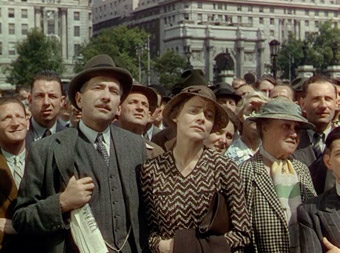
With This Happy Breed, playwright Noel Coward hoped to glorify the British working class in the same manner that he'd
celebrated the "higher orders" in Cavalcade. The film begins just after World War I. Middle-class Londoner Robert Newton
hopes to improve his family's lot by moving them into a comparatively posh house in the suburbs. The house is large enough for
each family member to claim a corner or room as his or her own, allowing Coward to spotlight the characters' highly individual
strengths, shortcomings and emotions. Twenty years go by, filled with the sorts of triumphs and tragedies with which British
audiences of the 1940s could readily identify. Finally, left alone after their children and relatives have moved on, Newton and his
wife (Celia Johnson) leave the house behind for a smaller, more practical apartment. This was the second of four collaborations
between author Noel Coward and director David Lean. While Coward can't completely disguise his patronizing attitude towards
"regular folks," Lean is successful in conveying the essential warmth, humanity and value of the film's characters. ~
Hal Erickson, Rovi
Three Smart Girls
http://en.wikipedia.org/wiki/Deanna_Durbin
Three Smart Girls***1/2 1938
http://www.tcm.com/tcmdb/title.jsp?stid=93159
Deanna Durbin, the teenaged soprano who literally saved Universal Pictures from bankruptcy, made her feature-film debut in
Three Smart Girls. Durbin, Nan Grey and Barbara Read play three wealthy young sisters, living with their divorced mother
(Nella Walker) in Europe. The girls learn that their father (Charles Winninger) has made plans to remarry. Correctly sensing that
the bride-to-be (Binnie Barnes) is a fortune hunter, the sisters head to Manhattan to save Daddy from himself. Durbin is the
primary architect in reuniting her parents, but not before satisfying her fans with several arias. Three Smart Girls not only
spawned a sequel (Three Smart Girls Grow Up), but even a 2-reel Three Stooges parody titled Three Dumb Clucks!
Three Smart Girls Grow Up***1/2 1939
http://www.deannadurbindevotees.com/t53-three-smart-girls-grow-up
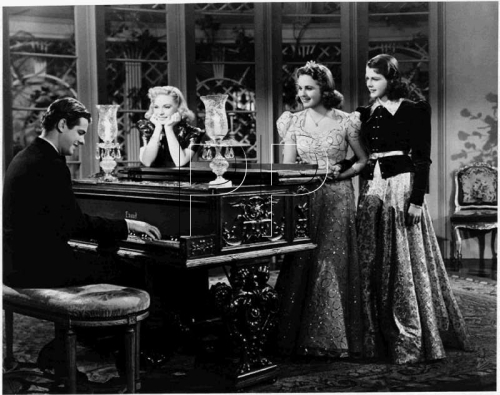
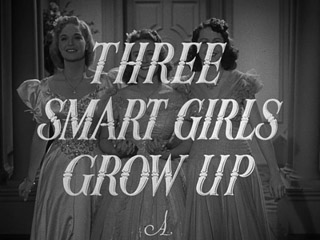
When Penelope "Penny" Craig sees that her sister Kay is in love with Richard Watkins, to whom their sister Joan has become
Through the Back Door***** 1921
http://home.comcast.net/~flickhead/Pickford.html
http://thepiratebay.org/torrent/5061266/Alfred_E._Green_-_Through_the_Back_Door_%281921%29
The movie starts in Belgium in the early 1900s. Jeanne (Mary Pickford) is the 10-year-old daughter of Louise (Gertrude Astor).
Troubles start when Louise remarries a selfish but rich man named Elton Reeves (Wilfred Lucas). He convinces her to move to
America and leave Jeanne behind in Belgium to live with the maid Marie (Helen Raymond). At first Louise refuses to, but
eventually gives in and leaves Jeanne in the care of Marie.
Five years pass and Jeanne and Marie bonded. Meanwhile, Louise hated living in America and feels guilty having left her kid
behind. She returns to Belgium to reunite with Jeanne, but Marie doesn't want to give her up. When Louise finally arrives, Marie
lies to her Jeanne drowned in a river nearby. Louise is devastated and collapses, before returning to America. This results in
estranging from Elton.
World War I broke out. Marie fears for Jeanne's safety and brings her to America to live with her mother. After an emotional
goodbye, Jeanne sets out for America to find her mother. Along the way she meets two orphan boys and decides to take care of
them. When she finally arrives in America, she travels to Louise's big mansion.
Too afraid to tell her she is her daughter, Jeanne applies to serve as her maid. While pretending to be someone else, she gets
to know her mother. However, she has trouble keeping up the lie and wants nothing more but have a reconciliation. Waiting for
the right time to tell the truth, Jeanne hopes everything will come to a right end. When guests of the mansion plot to fleece
Elton, Jeanne is forced to reveal her true identity to save the day. A happy reunion follows.
Time to Kill, A***1/2 1996
VIDEO
http://en.wikipedia.org/wiki/A_Time_to_Kill_(film)
Carl Lee Hailey (Samuel L. Jackson) takes the law into his own hands after the legal system fails to adequately punish the men who
brutally raped and beat his daughter, leaving her for dead. Normally, a distraught father could count on some judicial sympathy in those
circumstances. Unfortunately, Carl and his daughter are black, and the assailants are white, and all the events take place in the South.
Indeed, so inflammatory is the situation, that the local KKK (led by Kiefer Sutherland) becomes popular again. When Hailey chooses novice
lawyer Jake Brigance (Matthew McConaughey) to handle his defense, it begins to look like a certainty that Carl will hang, and Jake's career
(and perhaps his life) will come to a premature end. Despite the efforts of the NAACP and local black leaders to persuade Carl to choose
some of their high-powered legal help, he remains loyal to Jake, who had helped his brother with a legal problem before the story begins.
Jake eventually takes this case seriously enough to seek help from his old law-school professor (Donald Sutherland). When death threats
force his family to leave town, Jake even accepts the help of pushy young know-it-all lawyer Ellen Roark (Sandra Bullock).
~ Clarke Fountain, Rovi
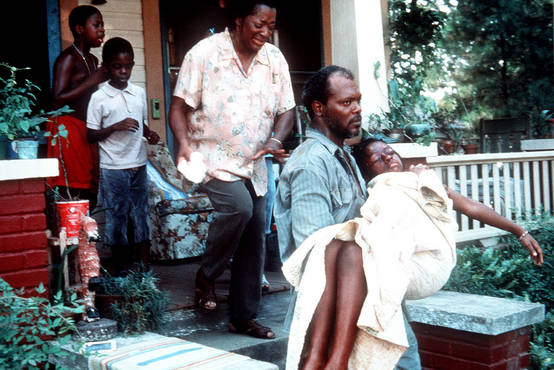
To Gillian on Her 37th Birthday**** 1996
http://rogerebert.suntimes.com/apps/pbcs.dll/article?AID=/19961018/REVIEWS/610180304/1023
http://www.scoopy.com/togillian.htm
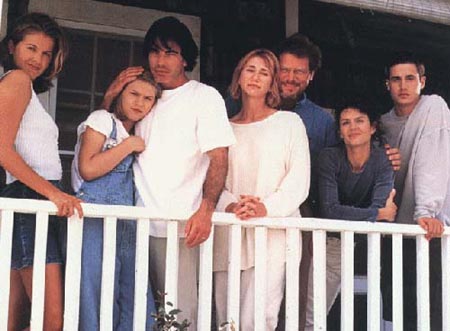
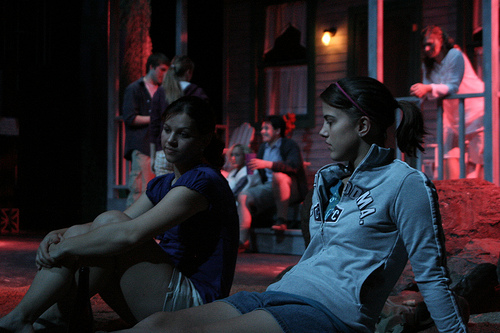

David Lewis (Peter Gallagher) is so affected by the death of his beautiful wife Gillian (Michelle Pfeiffer), who fell from the mast
pole of their boat on a sailing trip, that he turns their summer cottage in Nantucket, Massachusetts into a permanent home and
spends most of his time on the beach there, communicating with his dead wife's spirit and unwittingly neglecting his teenage
daughter Rachel (Claire Danes).
On the second anniversary of Gillian's death, David invites Gillian's sister Esther Wheeler (Kathy Baker) and her husband Paul
(Bruce Altman) to stay for the weekend. Esther insists on bringing a female friend named Kevin Dollof (Wendy Crewson) whom
she hopes David will become romantically interested in. David, however, ignores her in proceeding with a ritualistic celebration
of Gillian's birthday.
The events of the weekend cause the adults to re-examine their relationships; Esther and Paul have to deal with the problem
posed to their marriage by Rachel's provocative young teenage friend, while, most importantly, David comes to realize that he
can be a loving and attentive father to Rachel without betraying the memory of Gillian.
Tootsie**** 1982
http://www.allmovie.com/work/50420
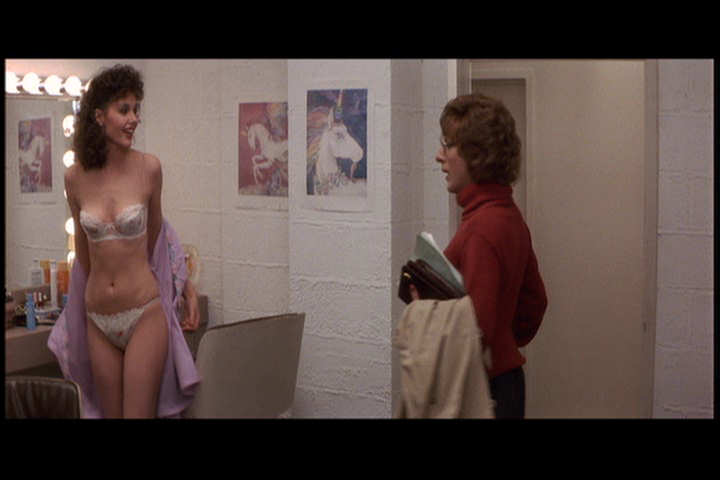
Michael Dorsey (Dustin Hoffman) is a respected but perfectionist actor on the verge of turning forty. Nobody in New York wants
to hire him anymore because he is so difficult to work with. According to his long-suffering agent George Fields (Sydney Pollack),
his attention to detail and difficult reputation got him fired from playing a tomato in a television commercial, because the idea
of a tomato sitting down was "illogical" to him. After four months without a job, he hears of an opening on the soap opera
Southwest General from his friend Sandy Lester (Teri Garr), who tries out for a role but doesn't get it. In desperation, he cross-
dresses, auditions as "Dorothy Michaels" and wins the part.
Michael thinks it is just a temporary job to pay the bills, but he proves to be so popular as a feisty hospital administrator that,
to his dismay, the producers sign him to a long-term contract. Dorothy is such a hit that she is even featured on the covers of a
number of magazines with such celebrities as Andy Warhol.
When Sandy catches Michael in her bedroom half undressed to try on her clothes in order to get more ideas for Dorothy's outfits,
he covers up by professing desire and they sleep together despite his better judgment about her self-esteem issues. Michael
believes Sandy is too emotionally fragile to handle the truth about him winning the part of Dorothy. Their romantic relationship
combined with his deception complicates his now busy schedule.
Exacerbating matters further, he is strongly attracted to one of his co-stars, Julie Nichols (Jessica Lange), a single mother in an
unhealthy relationship with the show's amoral, sexist director, Ron Carlisle (Dabney Coleman). At a party, when Michael (as
himself) approaches Julie with a line that she had previously told Dorothy she would be receptive to, she instead throws a drink
in his face. Yet when he makes tentative advances (as Dorothy), Julie is shocked and later tells "her" that she likes her, but not
in a romantic way.
Meanwhile, Dorothy has her own admirers to contend with: older cast member John Van Horn (George Gaynes) and Julie's
widowed father Les (Charles Durning). Les even proposes marriage. Michael's roommate, writer Jeff Slater (Bill Murray), and
George Fields are in on the masquerade and watch in amazement as the situation escalates out of control.
Michael finds a clever way to extricate himself. When the cast is forced to perform the show live, he improvises and reveals
that he is actually the character's twin brother who took her place to avenge her. The revelation allows everybody a more-or-less
graceful way out. Julie is so outraged she slugs him in the stomach off-camera. Some weeks later, Michael waits for Julie
outside the studio and touchingly confesses that "I was a better man with you as a woman than I ever was with a woman as a
man," and she forgives him.
Top Hat***1/2 1935
http://www.filmsite.org/toph.html
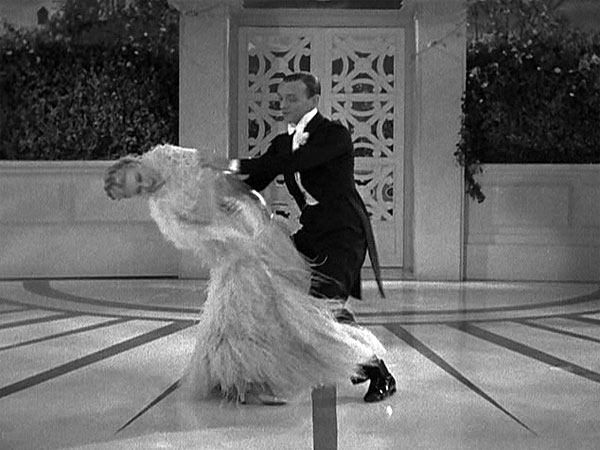
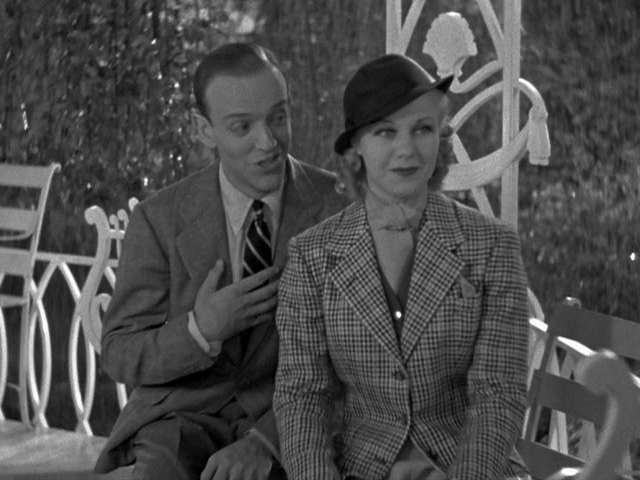
An American dancer, Jerry Travers comes to London to star in a show produced by the bumbling Horace Hardwick. While
practicing a tap dance routine in his hotel bedroom, he awakens Dale Tremont on the floor below. She storms upstairs to
complain, whereupon Jerry falls hopelessly in love with her and proceeds to pursue her all over London.
Dale mistakes Jerry for Horace, who is married to her friend Madge. Following the success of Jerry's opening night in London,
Jerry follows Dale to Venice, where she is visiting Madge and modelling/promoting the gowns created by Alberto Beddini, a
dandified Italian fashion designer with a penchant for malapropisms.
Jerry proposes to Dale, who is disgusted that her friend's husband could behave in such a manner and agrees instead to marry
Alberto. Fortunately, Bates, Horace's meddling English valet, disguises himself as a priest and conducts the ceremony;
apparently, Horace had sent Bates to keep tabs on Dale.
On a trip in a gondola, Jerry manages to convince Dale and they return to the hotel where the previous confusion is rapidly
cleared up. The reconciled couple dance off into the Venetian sunset, to the tune of "The Piccolino".[5]
Torchy Blane Series
http://en.wikipedia.org/wiki/Torchy_Blane
Smart Blonde***1/2 1937
http://en.wikipedia.org/wiki/Smart_Blonde
http://www.tcm.com/mediaroom/video/142098/Smart-Blonde-Original-Trailer-.html

This 1937 "Torchy Blane" film, "Smart Blonde" has Torchy Blane (Glenda Farrell) trying to find out who killed
an entrepreneur who just purchased a night club and some gambling establishments. Torchy is a witness to the
murder. Later on, one of the suspects, the dead man's bodyguard, is also found dead. Torchy and her some time
boyfriend, Lt. McBride (Barton MacLane), as usual, are at odds as far as who the killer is.
Fly-Away Baby***1/2 1937
http://en.wikipedia.org/wiki/Fly-Away_Baby
http://www.tcm.com/mediaroom/video/142089/Fly-Away-Baby-Original-Trailer-.html
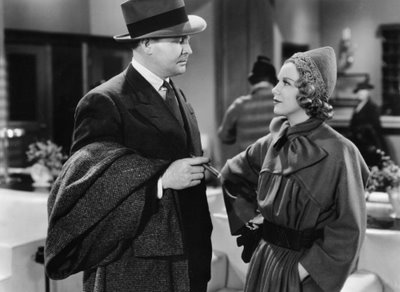
Torchy and Steve are investigating a murder/jewel theft with roots in Germany. She lobbies her publisher to underwrite her
participation in an around-the-world airplane race because arrogant businessman 'Sonny' Croy will be a participant. He is a
prime suspect in the case and the international itinerary includes Frankfort, Germany.
Torchy Gets Her Man***1/2 1938
http://www.answers.com/topic/torchy-gets-her-man
http://www.tcm.com/mediaroom/video/76626/Torchy-Gets-Her-Man-Original-Trailer-.html
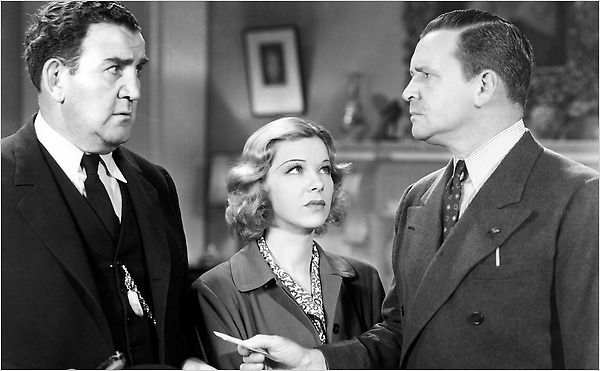
Reporter Torchy Blane is in the police station when Gilbert, a secret service agent, asks the police for help in catching a counterfeiter
known as $100 Bailey, who is passing hundred dollar bills. He tells police detective Steve McBride that the man he suspects will pass the
money at the racetrack and convinces Steve to let him watch the $100 betting window. Captain McTavish dispatches Sergeant Gahagan
with a letter to confirm Gilbert's identity, but, unknown to the police, Gilbert is actually Bailey and he intends to use his position at the
racetrack to pass counterfeit money under the eyes of the police. Gilbert switches McTavish's letter with one written by a member of his
gang, and his cover is maintained. McTavish forbids Steve to tell Torchy about the investigation, but determined to get her story, Torchy
follows Gilbert from the racetrack. Gilbert notices her on his tail, however, and loses her. By questioning Gahagan, Torchy figures out
what the investigation is about, but when she writes the story, her editor explains that they have been asked not to publish anything on the
subject in order to keep the operation secret. Torchy is still suspicious, so she marks Gilbert's automobile tire with creosote and borrows a
dog to track the scent. With Gahagan's help, Torchy discovers Gilbert's hideout, but they are spotted by Gilbert's men and kidnapped. Torchy
sends the dog to get help. Meanwhile, Steve has begun to worry about Torchy. Gilbert's response makes him suspicious and when the dog
shows up without Torchy, Steve sets off in search of her. They arrive just before a bomb is set to go off, and Bailey panics, revealing Torchy's
hiding place.
Touch of Evil****1/2 1958
http://www.filmsite.org/touc.html
http://www.noiroftheweek.com/2010/05/touch-of-evil-1958.html
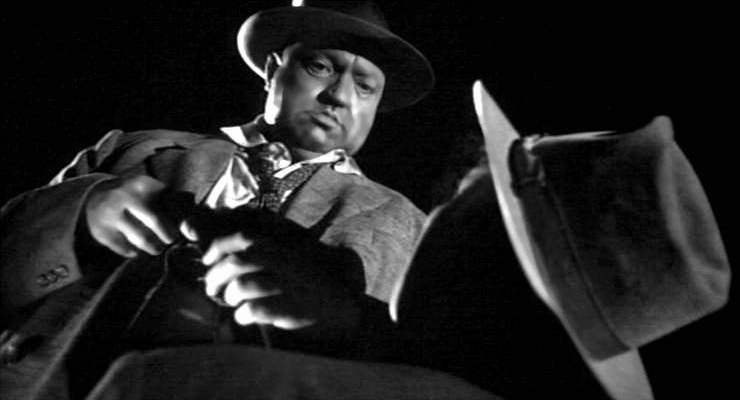
A stunning portrait of corruption and abuse of power, Touch of Evil gives Orson Welles a broad remit to flourish his directorial
genius. Opening with an unseen man setting the timer on an explosive device, the clock starts ticking down as soon as he
stashes it in the boot of a fancy-looking car. Immediately afterwards, a well-heeled businessman motors off with his
cheap-looking girlfriend. Through the tawdry streets they roll, until the camera smoothly picks up their passing by Mexican
lawman Ramon "Mike" Vargas (Charlton Heston) and his new wife Susan (Janet Leigh). As the newly-weds cross over the border,
into the US, they catch up and overtake the automobile. Just a few steps more and the car explodes in a ball of flame, casting
harsh shadows. Unfortunately this is an international incident since the bomb was set in Mexico and detonated in America.
Forced to deviate from his honeymoon plans, Vargas decides to hang around for the local cops and send Susan back to their
hotel (now that their romantic stroll is ruined). In the flickering light the DA and a few officers turn up, but they're all waiting
for the renowned detective Hank Quinlan (Orson Welles). When he finally arrives from his ranch, with his side-kick Pete
Menzies (Joseph Calleia), he rolls heavily from his seat and lumbers towards the wreck. Casting a jaundiced eye over the
wreckage, Quinlan he knows, by intuition, that this is the result of dynamite. Marcia Linnekar (Joanna Moore) arrives to
identify the remains of her father but Quinlan seems disinterested, dismissing her (with a tail). Finally turning to his fellow
officers, after appraising and disregarding Vargas, Quinlan's twitching nose takes them onto the Mexican side.
Meanwhile, Susan has been waylaid on the way to the hotel by smooth-looking Pancho (Valentin De Vargas), one of the Grandi
boys. Allowing herself to be led to greasy crime-boss "Uncle Joe" Grandi (Akim Tamiroff), puts on a brave face. Since his
brother is being investigated by Vargas, he wants him to lay off - a request which cuts no ice with Susan. Her husband hasn't
got much time to think about this development though because Quinlan is hot on the trail of a suspect and Vargas wants to be
present. The hunch concerns Manelo Sanchez (Victor Millan), a poor Mexican worker who became involved with Marcia, severely
upsetting her father. Thus Sanchez had the motive, which is enough for Quinlan. However the discovery of some damning
evidence by Pete seals the case, but disturbs Vargas. He is certain that Quinlan is framing Sanchez, though he'll have to gather
some solid proof if he is to prove this (which means leaving Susan alone).
The aspect of Touch of Evil which immediately grabs the attention is the virtuoso and deservedly famous opening tracking shot.
This unbroken sequence, stretching for several breath-taking minutes, both sets the scene and introduces the main characters.
The tension is finally eased by cutting away just after the explosion, establishing a fluidity of motion which remains for the
entire film. This technical brilliance, flaunted so early, is a driving force, opening the door to extensive range of camera angles
and superb editing. Links between separate scenes are established with connecting motifs, such as doors opening or a shared
musical theme. When combined with the advanced level of spatial choreography (so that every position and movement latches
together into a cogent whole), the result is an extraordinary piece of film-making.
Since the underlying story is also strong, dealing with a number of double-edged themes, it never feels as though Welles is
showing off. The idea of conflict between good and evil is central but this is expanded to cover the US-Mexico divide, the
moralist-pragmatist conundrum and more. Quinlan exudes the stench of corruption from every pore of his distended, heaving
carcass, yet his fellow officers are in awe of him and his reputation. He drags evil-doers to justice and, frankly, they don't care
how he does it; the ends justify the means. The twist is that his outlook has been poisoned since the brutal murder of his wife,
decades ago. The constant pain fuels a personal vendetta. This is, of course, no excuse, but it does partly explain the prejudice
of Quinlan. Besides, both Vargas and Quinlan have reputations to protect and when it comes down to a one-on-one duel, both
are willing to get their hands dirty.
Lastly, the bizarre casting choices made for Touch of Evil show, in retrospect, a certain genius. Welles is perfect, dominating
and beyond reproach, sometimes looming over the screen and sometimes shrunken like a doll. In opposition, Heston and Leigh
are excellent as the disturbed newly-weds. However, special mentions must be made of Marlene Dietrich, the slewed gypsy
fortune-teller Tanya, Dennis Weaver, the loopy motel clerk, Mercedes McCambridge, a butch gang member, and Zsa Zsa Gabor.
This eclectic group of performers form the broad-sweep of this frontier town, a setting where the weird is commonplace and
disparate cultures clash. All of this gives Touch of Evil a deliciously tangy flavour, a movie which is as much about cinema as it
is a film noir. Given the unexpected opportunity to direct, Welles grabbed the opportunity and created a masterpiece (foxing
the studio executives). As usual he messed up during the editing stage, by letting the film out of his hands, but now we have
the chance to see his vision in all of its electrifying glory. Take it.
Trader Horn**** 1931
VIDEO
http://www.tcm.com/mediaroom/video/496390/Trader-Horn-Movie-Clip-Baboons-Lad.html
http://www.tcm.com/mediaroom/video/496387/Trader-Horn-Movie-Clip-We-re-White-Like-Her-.html
http://www.tcm.com/tcmdb/title/13517/Trader-Horn/full-synopsis.html
http://www.1000misspenthours.com/reviews/reviewsn-z/traderhorn1931.htm
Thoughts: My feelings on this film are a bit mixed. As an adventure, many parts of this film are quite exciting and have you
Based on the ivory trader's 1927 memoirs, Trader Horn's production was rather sordid. The sound recorded in Africa was of
The film is not available on DVD. It was released on VHS on 1994, but not on laserdisc. Possibly due to the objectionable
Trader Horn was only nominated for Best Motion Picture, but it, and the rest of the nominees, lost to the epic western
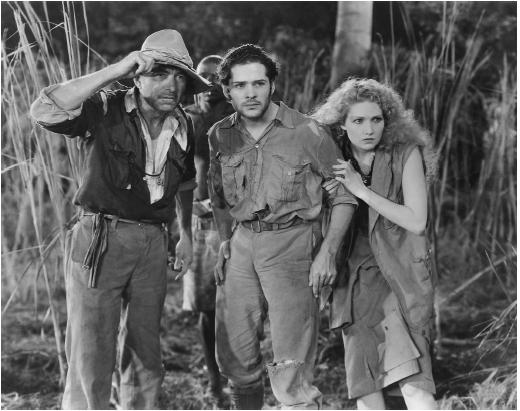
Treasure of the Sierra Madre, The***** 1944
http://www.filmsite.org/trea.html
This is the context in which the three gringos band together in a small Mexican town and set out to strike it rich in the remote
Sierra Madre mountains. They ride a train into the hinterlands, surviving a bandit attack en route. Once out in the desert,
Howard, the old-timer of the group, quickly proves to be by far the toughest and most knowledgeable; he is the one to discover
the gold they are seeking. A mine is dug, and much gold is extracted. Greed soon sets in and Dobbs (Humphrey Bogart) begins
to lose both his trust and his sanity, lusting to possess the entire treasure. Dobbs is also paranoid that he will be killed by his
partners. At this time a fourth American shows up, which sets up a moral debate about what to do with the new stranger. The
bandits then reappear, pretending, very crudely, to be Federales, which leads to the now-iconic line about not needing to show
any "stinking badges." After a gunfight in which the fourth American is killed, a real troop of Federales appears and drives the
bandits away.
But when Howard is called away to assist some local villagers, Dobbs and third partner Curtin have a final confrontation, which
Dobbs wins, leaving Curtin lying shot and presumed dead. However, Curtin crawls to safety. Later, Dobbs is murdered (via
decapitation) by some surviving bandits, who, in their ignorance, believe the bags of unrefined gold to be just bags of sand
and scatter them to the winds. Curtin is discovered and taken to Howard's village, where he recovers. He and Howard miss
witnessing the bandits' execution by Federales by only a few minutes as they arrive back in town, and learn that the gold is
gone. While checking the areas that the bandits dropped the gold, Howard realizes that the winds must have carried the gold
away. They accept the loss with equanimity, and then part ways, Howard returning to his village, and Curtin returning home to
America.
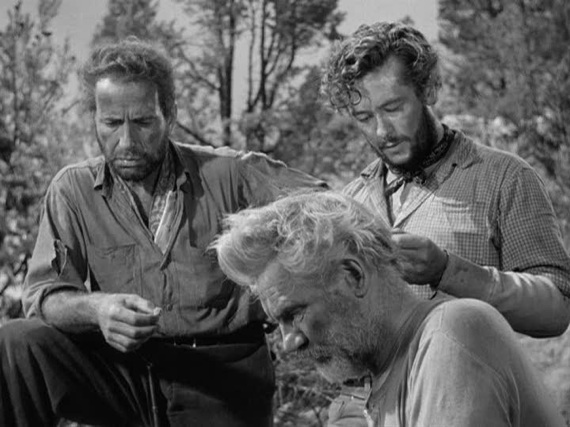
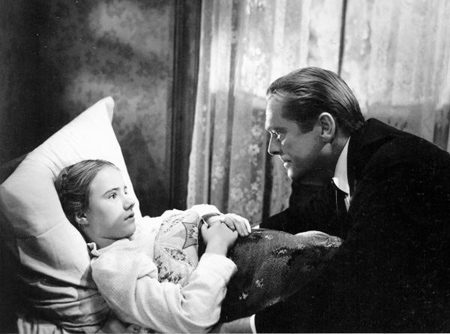

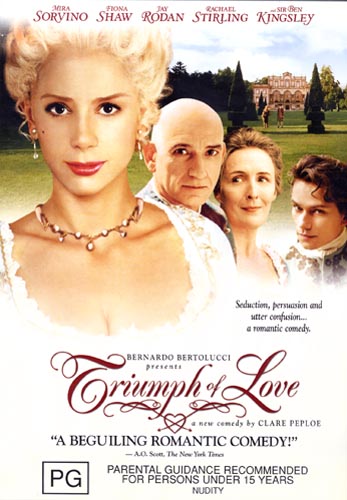
A legendary propaganda/documentary of the Third Reich's 1934 Nuremberg Party Rally. Featuring a cast of thousands as well as,
of course, Hitler, Himmler, Goebbels, Hess, Goering and other top party officials. Written by Dawn M. Barclift
Triumph of the Will was commissioned by Hitler in 1934 and directed by Leni Riefenstahl, and covers the events of the Sixth
Nuremberg Party Congress. The original intention was to document the early days of the NSDAP, so future generations could
look back and see how the Third Reich began. In reality, Triumph of the Will shows historians how the Nazi state drew in the
masses through propaganda and also how Adolf Hitler had a unique and terrifying ability to entice crowds to his beliefs by the
very power of his words. Written byAnthony Hughes <husnock31@hotmail.com>
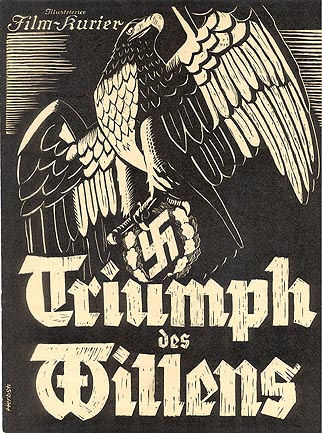
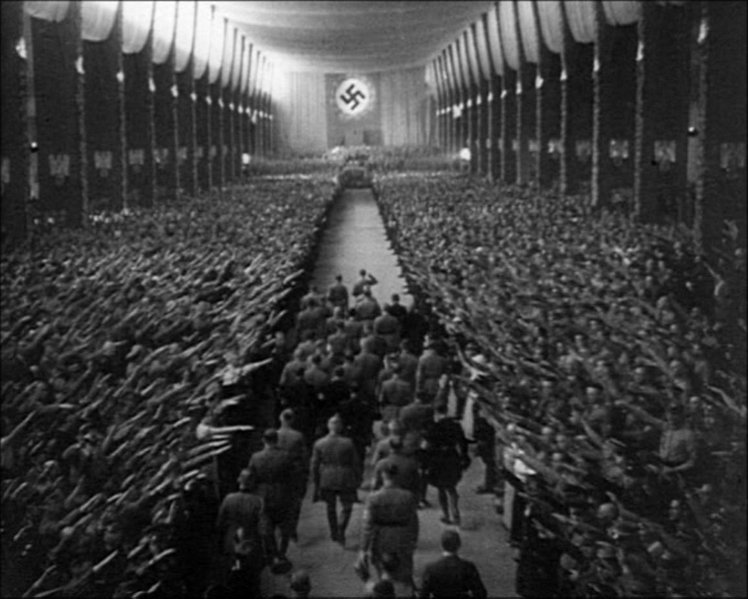
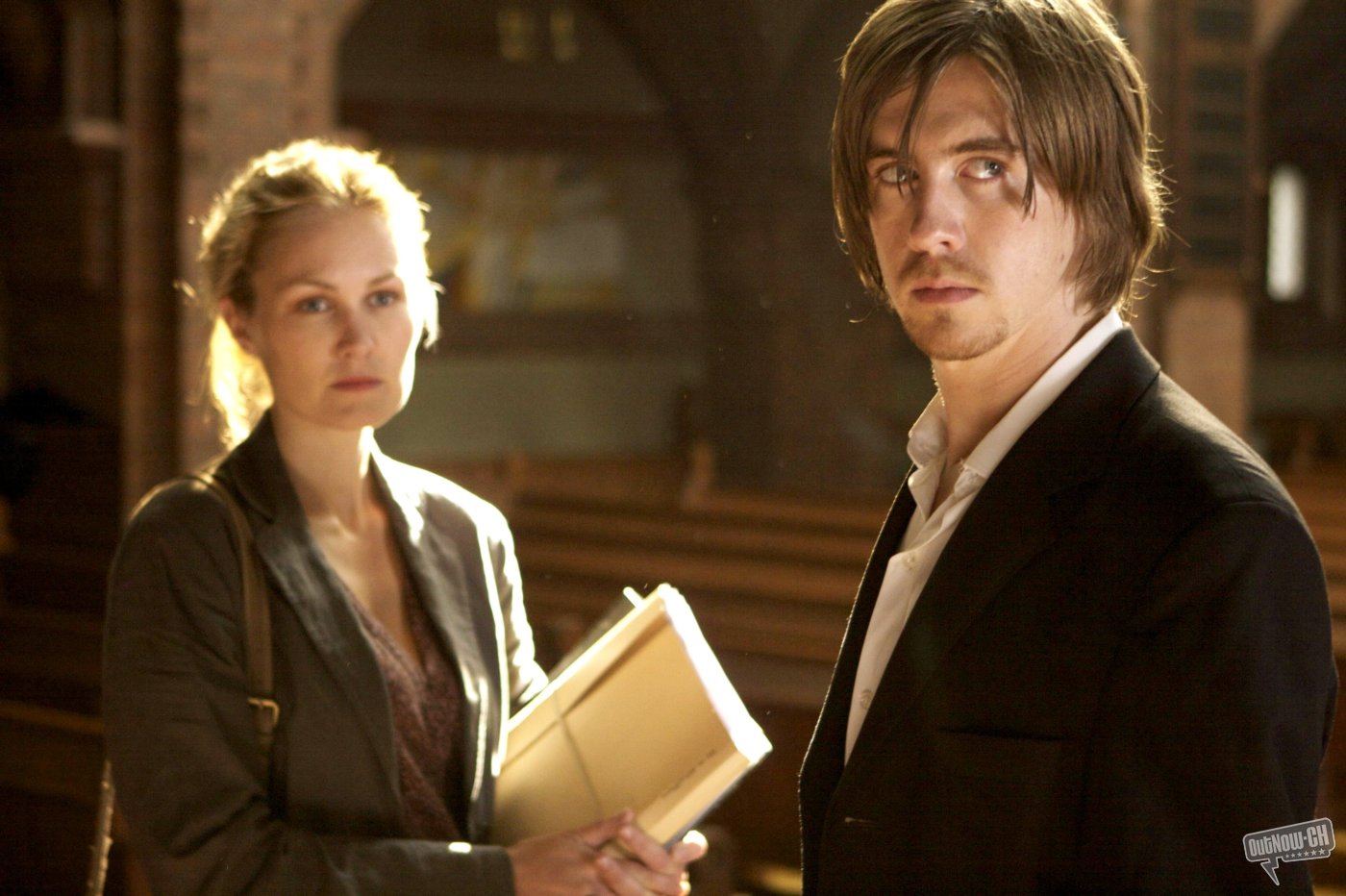
As a teenager Jan Thomas (Pål Sverre Valheim Hagen) runs off with young boy Isak in a stroller left outside a cafe by the
mother. The boy runs away, slips, and falls on a rock, suffering an apparently fatal head injury. Jan Thomas, afraid of the
consequences, carries him into a nearby river with a strong current, where he sets him adrift. Jan Thomas testifies that the
boy was killed by the fall, but he is convicted of murder.
As a young adult he is released from prison and befriends single mother Anna (Ellen Dorrit Petersen) (the pastor of the church
where he plays the organ) and her young son Jens. Agnes (Trine Dyrholm), Isak's mother, sees that Jan Thomas has been
released and is concerned for the safety or her two adopted daughters. Her panicking reaction causes strain in her relationship
with the two girls.
Agnes sees Jan Thomas together with Jens, and is also concerned that Jens may not be safe. When Jan Thomas lets Jens wait
a few minutes outside Jens' school while Jan Thomas picks something up in the school, he returns to find Jens missing. Jan
Thomas is very concerned when Jens is missing. Scared by ensuing events, Jens flees into the river and almost drowns. With
great danger for himself Jan Thomas catches him, and holds on to a branch, after which another person, in a surprise twist of
plot, helps them reach the shore. Jan Thomas confesses to Agnes what really happened earlier to her son Isak.
The movie was released in the USA by filmmovement.com.
True Confession***1/2 1937
http://en.wikipedia.org/wiki/True_Confession
VIDEO
http://www.youtube.com/watch?v=WzXWdG-kxHs
Helen Bartlett, fiction writer and chronic teller of fibs, is happily married to honest lawyer Ken, but they are broke. Helen secretly
gets a job as a secretary, but quits her first morning when her boss, Otto Krayler, proves to be a lecherous wolf. When she returns
later for her hat and coat, Helen is charged with murder. The apparent motive for the crime is $12,000, which strangely was left in
Krayler's desk. When Helen is cross-examined, she paints a vivid scenario of her guilt, then says she is innocent. Ken visits Helen
in her jail cell and, fearing there is no way to prove her innocence, decides to plead self-defense, hoping to win the jury's sympathy
for a woman protecting her honor. Throughout the trial, all assume Helen is guilty except a mysterious man named Charley Jasper,
who calls himself a criminologist and "student of life." The Bartletts win the case after much publicity, and Helen publishes her life
story, becoming a wealthy novelist. At their new home on Martha's Lake, Ken feels guilty that crime catapulted them to success,
and Helen is ready to confess her innocence when Ken states categorically perjury is a travesty of justice worse than murder.
Charley visits the Bartletts carrying Krayler's wallet, and hopes to blackmail them with knowledge of Helen's perjury by confessing
to the murder himself. Helen finally tells Ken the truth, and he threatens to turn Charley in until he confesses the real murderer
was his brother-in-law, who panicked after killing Krayler and abandoned the money, then was himself killed during an attempted
bank robbery. Ken, disillusioned by Helen's constant lying, leaves, but she runs after him, lying that she's pregnant, then insisting
it could be true. Ken then carries Helen into the house in order to make one last attempt to teach her not to lie, and she assures
him she has uttered her last fib.
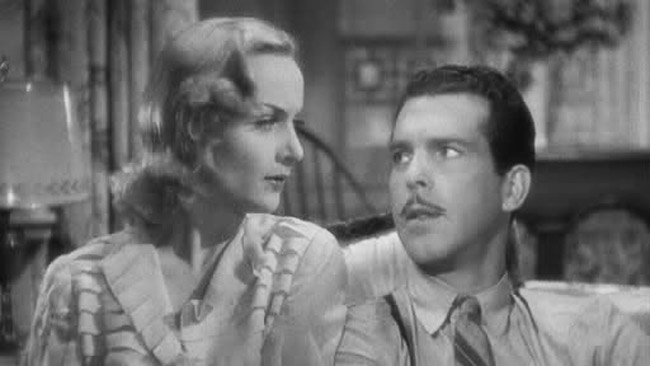
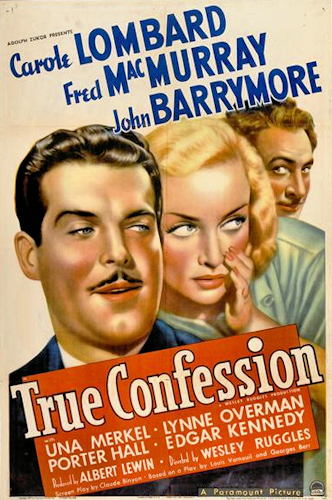
Twelve Angry Men**** 1957
http://www.filmsite.org/twelve.html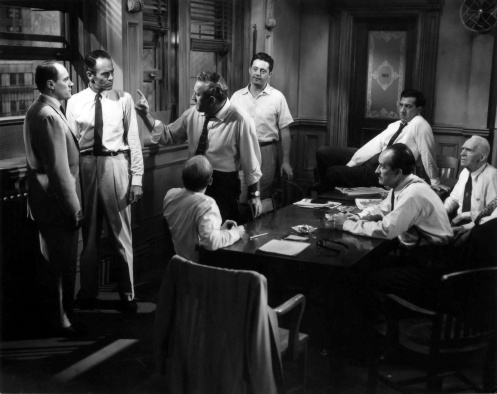
Less is more. We’ve all heard this bit of banality at one point or another, but these days it might be hard to actually experience
it. There are camp sights with Internet access and most people find their way there using a GPS, probably built into their car.
We just don’t take the road to minimalism often enough. That’s especially true in today’s film industry. We’re now transported
in 3D to entire planets created by computers with a twelve dollar ticket stub and extra buttered popcorn. But in 12 Angry Men,
all we have is a dozen men in a small room trying to come to a verdict.
On trial is an eighteen year old Hispanic boy, raised in the slums with a criminal record already. He’s accused of murdering his
father. Now the jury must decide whether or not to send the boy to the electric chair. As they assemble in the cramped 16 by
24 foot room, it sounds like they’ll be out soon. Most men have made up their minds, one even has tickets for a ball game that
evening. But Juror #8 (Henry Fonda) looks out the window thoughtfully before they assemble to vote. He becomes the only man
to vote not guilty.
Fonda proceeds to lead the men back through the evidence and one step at a time they find inconsistencies. This quickly
becomes one of those films where you are just glued to the screen. As the men discuss the evidence, certain men bring their
own experiences and prejudices into both helping and hindering the progress. An older man is able to help us understand how
an elderly witness may have unknowingly mislead the trial. Another is able to offer knowledge from his own experiences from
the slums. But it seems that some men just want to watch the young man suffer.
Director Sidney Lumet had an ingenious camera trick to give the film a more claustrophobic feel as it progressed. In the
beginning of the film, he positioned the cameras higher than usual and used wide-angled lenses to make the space within the
room feel more spread out and distant. As the film goes on, the cameras move lower, there are more close-up shots and
telephoto lenses are used to make the space feel more cramped. The trick is so subtle and blended with the heated plot line
that you’re not likely to notice unless you are looking for it. Nonetheless, I do believe this technique does an effective job of
pulling the viewer closer and engaging them within the film.
There needed to be an award for best acting ensemble. The twelve men here move the film all on their own. Together they
drive the plot along at perfect pace and toss the dialogue back and forth, not just to shed more light on the trial, but to reveal
hidden characteristics and motives within each other. Fonda does control a lot as the leader, but it is the eleven men around
him that make this film such a compelling uphill battle depicting the importance and power of a jury.
I don’t know if much of our younger minded generation would enjoy 12 Angry Men. The biggest special effect, is when we see
it start to rain out the window. The greatest action is held in the most compelling of arguments. The characters don’t even
have names, just faces and opinions that form and mold around their own sense of duty or vengence. But I’d applaud any
youngster who would try this simply powerful film over today’s typical sensory overload blockbusters.
“It’s always difficult to keep personal prejudice out of a thing like this. And wherever you run into it, prejudice always
obscures the truth.”
Twentieth Century**** 1934
http://www.popmatters.com/film/reviews/t/twentieth-century-dvd.shtml
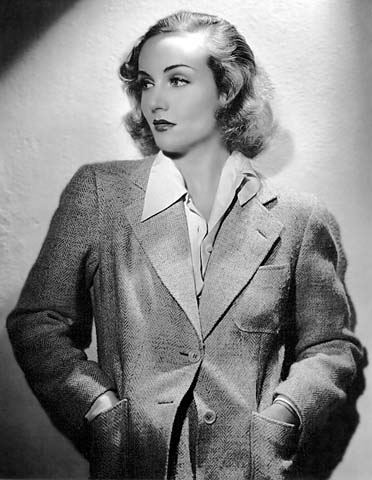
Larger-than-life Broadway impresario Oscar Jaffe (John Barrymore) takes an unknown lingerie model named Mildred Plotka
(Carole Lombard) and makes her the star of his latest play, despite the grave misgivings of everyone else, including his two
long-suffering assistants, accountant Oliver Webb (Walter Connolly) and the consistently tipsy Owen O'Malley (Roscoe Karns).
Through intensive training, Oscar transforms his protegée into the actress "Lily Garland", and both she and the play are
resounding successes. Over the next three years, their partnership spawns three more smash hits, and Lily is recognized as a
transcendent talent.
Then Lily tries to break off their professional and personal relationship, fed up with Oscar's overpossesiveness and control of
every aspect of her life. Oscar talks her out of it, promising to be more trusting and less controlling in future. Instead, he
secretly hires a private detective agency run by McGonigle (Edgar Kennedy) to watch her every move, even to the point of
tapping her telephone. When she finds out, it is the last straw; she leaves for Hollywood and becomes a great movie star.
Without Lily, Oscar produces flop after flop. After the latest one, he is forced to disguise himself to board the luxurious
Twentieth Century Limited train travelling from Chicago to New York City's Grand Central Terminal without being thrown in jail
by his creditors. By chance, Lily Garland boards the train at a later stop with her boyfriend George Smith (Ralph Forbes). Oscar
sees a chance to restore his fortunes and salvage his relationship with Lily. He schemes to get her to sign a contract with him.
However, Lily wants nothing more to do with him. She is on her way to see Oscar's rival (and former employee), Max Jacobs
(Charles Lane), to star in his play. However, Oscar manages to get George to break up with her. Knowing that Lily offers him
one last chance at professional success he tells her of his wish for her to play Mary Magdalene in his new play; " sensual,
heartless, but beautiful - running the gamut from the gutter, to glory - can you see it Lily? - the little wanton ending up in tears
at the foot of the cross. I'm going to have Judas strangle himself with her hair." Then Oliver thinks he has found somebody to
finance Oscar's project, fellow passenger Mathew J. Clark (Etienne Girardot), not realizing that Clark is a harmless escapee
from a mental asylum. When Oscar is slightly wounded in a scuffle with Clark, he pretends to be dying and gets a distraught
Lily to sign his contract. The film ends with their first rehearsal, where Oscar reverts to his usual domineering self.
20,000 Years In Sing Sing***1/2 1932
http://www.tcm.com/thismonth/article.jsp?cid=99385&mainArticleId=133164
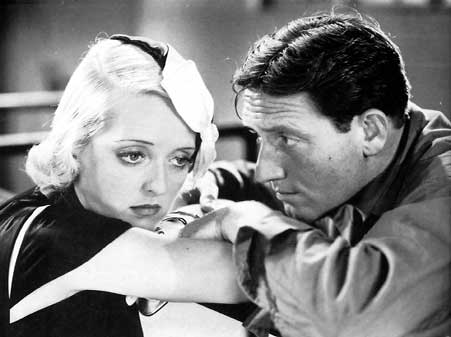
Sent to Sing Sing prison, influential crook Spencer Tracy is unregenerate and refuses to adhere to the rules. While in solitary
confinement, Tracy reconsiders his attitude. Thanks to the correctional facility's compassionate warden (Arthur Byron), Tracy
becomes a model prisoner, even refusing to participate in a jailbreak. The warden sets up a special program permitting
selected prisoners a degree of freedom and even suggests allowing an occasional furlough. When Tracy's girl friend (Bette
Davis) is hurt in an auto accident, he is given a 24 hour pass to visit her. It's a test case--if Tracy doesn't return, the warden
will be discredited and replaced. While on the "outside," Tracy learns that his old rival (Louis Calhern) was responsible for
his girl's injuries. Davis shoots the rival, who in turn fingers Tracy as the one responsible; the convict thus risks execution
upon returning to the arms of the law. Based on the book by real-life Sing Sing warden Lewis E. Lawes, 20,000 Years in Sing
Sing was remade in 1940 as Castle on the Hudson. ~ Hal Erickson, All Movie Guide
23 Paces to Baker Street***1/2 1956
http://www.rottentomatoes.com/m/23-paces-to-baker-street/
VIDEO
http://www.youtube.com/watch?v=PG9swT3KK44
Phillip Hannon, a successful playwright whose recent blindness has driven him to move from New York to London, is paid a surprise visit one day by
Jean Lennox, the woman to whom he was once engaged. Phil, bitter and self-pitying since losing his sight, abruptly dismisses Jean and then leaves
the apartment. In Phil's absence, Jean tells his secretary, the devoted Bob Matthews, that Phil broke their engagement after becoming blind. Phil walks
to the Eagles Bar, and while slumped in a booth there, overhears a muffled conversation between a man named Evans and a whimpering woman, in
which Evans browbeats the woman to agree to do a disagreeable task on the 10th of the month. Obsessed by the encounter, Phil returns home,
dictates the couple's dialogue into his tape recorder, and then summons the police. With the 10th just a week away, Phil speculates that kidnap or
robbery may be involved, to which Inspector Grovening responds that Phil is suffering from an overactive imagination. Afterward, Phil recalls the scent
of perfume worn by the woman and ascertains its name. To humor Phil, Bob and Jean join his search for the reluctant woman. When Phil recalls her
stating that she took the #73 bus and that she worked for nobility, they spend the night pouring over the peerage books for names of Lords with small
children who live in the Knightsbridge area. The next morning, Bob narrows the list to Lady Syrett. Upon discovering that Lady Syrett's nurse is named
Janet Murch and that she works for the Unity Domestic Bureau, Phil sends Jean to the bureau posing as a prospective employer. When Jean asks about
Janet, the bureau's head, Mr. Pilling, becomes suspicious and asks for Jean's address. Rattled, Jean provides him with Phil's address, and soon after, a
woman identifying herself as Miss MacDonald comes to apply for a job. After a brief interview, the woman leaves, and Phil, recognizing the scent of her
perfume, sends Bob after her to take her picture. Trailing the woman to a department store, Bob buys a camera, and then returns home hours later,
tired and wet, with the news that although he snapped her picture, he lost her once she entered a deserted house. When Lady Syrett states that the
woman in Bob's photo is not Janet, Phil, frustrated, lashes out at Bob and Jean and then decides to place a classified ad in the paper asking Janet to
call his phone number. Soon after, a shadowy figure at a bar pays a drunken woman to impersonate Janet and ascertain Phil's name. Meanwhile, the
real Janet, in a quandary, decides to call Phil from a phone booth near the river. As Phil answers the phone, Evans appears at the booth and forces
Janet to arrange a meeting with "her father" in one hour at the Eagles Bar. After Janet hangs up, Evans stabs her and tosses her body into the river.
One hour later, a man enters the Eagles Bar and introduces himself to Phil as Murch. Although Phil pretends that he can see, the man realizes that he
is blind and offers to take him to Janet. After Murch escorts Phil out of the bar, Bob arrives and tries to follow them. Leading Phil into a partially
demolished building, the man locks him in a room that has no back walls. When a portion of the floor collapses, Phil senses that he is in danger and
calls for help. Hearing his cries, Bob locates Phil and comes to his rescue. Back in the safety of his apartment, Phil tells Jean that his brush with death
made him recognize that he still cares about living. After Janet's body is found in the river, Inspector Grovening begins to seriously consider Phil's
story. As the morning of the 10th arrives, Phil, feeling responsible for Janet's death, becomes consumed with preventing the planned crime. While
replaying the tape once more, Phil realizes that the name Mary really refers to the ocean liner the Queen Mary , which docked that morning in London.
With the help of the police, Phil checks the passenger list for wealthy couples traveling with children. When the De Mesters, a wealthy Argentine couple
with a seventeen-year-old daughter, appear to be the only candidate, the police hurry to their hotel and learn that their retarded daughter has
disappeared with her nursemaid. After a search of the area turns up the girl's wheelchair and her doll, Phil smells perfume on the doll and, associating
it with MacDonald, insists that the police search the empty house to which she led Bob. Later, the police phone Phil with the news that they have found
the child and two of her kidnappers, but that MacDonald was not among them. When the phone line goes dead, Phil senses that danger is near and
deliberately insults Jean to drive her from his apartment. Hearing noises outside his doorway, Phil hurriedly records several greetings to Evans and
then smashes all the light bulbs, throwing the apartment into darkness. When Evans slips in through the back door, Phil plays the recordings, thus
disorienting his attacker. Catching Evans off guard, Phil wrestles him onto the stairway, where he loses his balance and falls to his death. The police
and Bob arrive soon after, and when they turn over the body, they find that it is MacDonald, dressed in men's clothes. The next day, Phil tenderly
caresses Jean's face and then kisses her.
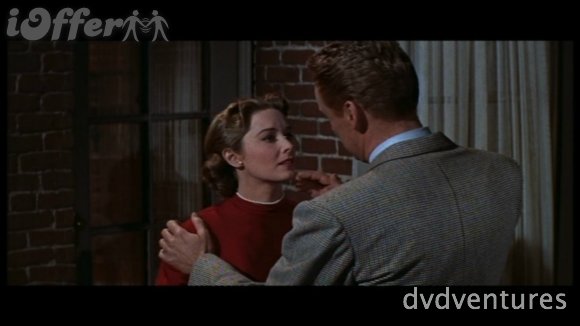
Two Against the World**** 1932
VIDEO
http://www.tcm.com/mediaroom/video/551770/Two-Against-The-World-Movie-Clip-It-Isn-t-An-It.html
http://www.tcm.com/this-month/article.html?isPreview=&id=504374%7C508307&name=Two-Against-The-World
A meeting of the Hamilton family is called in response to a lawsuit brought by Mrs. Polansky, the widow of a man killed while working for the family.
Although the family refuses to pay, Adell Hamilton, the youngest daughter, is attracted to the opposing lawyer, David Norton. When Adell hits David's
car, they decide to have lunch together. Even though both are from good families, Adell is a pleasure loving, spoiled woman, while David is a man of
principle. Adell is capable of generosity, however, and she impulsively offers to send Mrs. Polansky money every month until her case is settled. One
evening, after Adell, her married sister, Corinne Walton, her brother Bob and family friend, Victor Linley, return from the opera, Bob and Victor argue
about Bob's gambling debts. Bob finds a vanity case on Victor's bed that he assumes belongs to Adell. She is just about to deny ownership when
Corinne signals her to say nothing. Bob thinks Victor is forcing Adell to have an affair with him in return for canceling his gambling debts. Drunkenly,
he runs off to shoot Victor. Adell runs after him, but she is too late to prevent the murder. The doorman identifies Adell as the mysterious woman seen
the night of the murder, and Bob confesses to murder but neither Bob nor Adell will involve Corinne. David is assigned as prosecutor of the case and
when Adell is caught in a lie, she says that her brother was defending her honor. After Bob's acquittal, Adell is about to leave town, when David finds
her and tells her that he knew she was lying on the stand because he overheard Victor tell Corinne their affair was over.
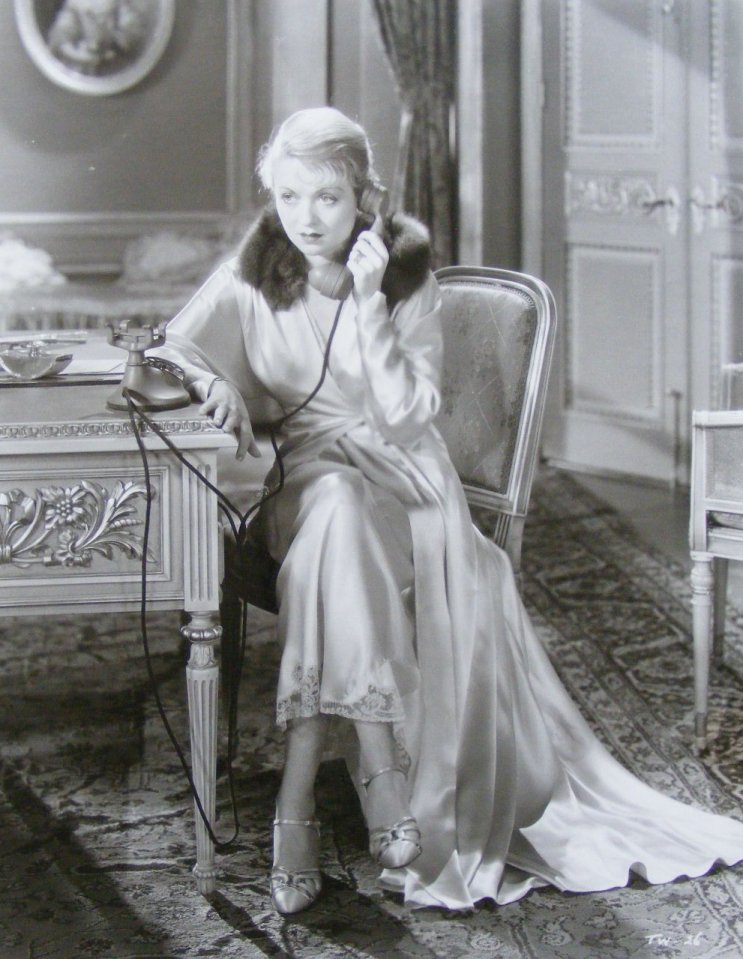
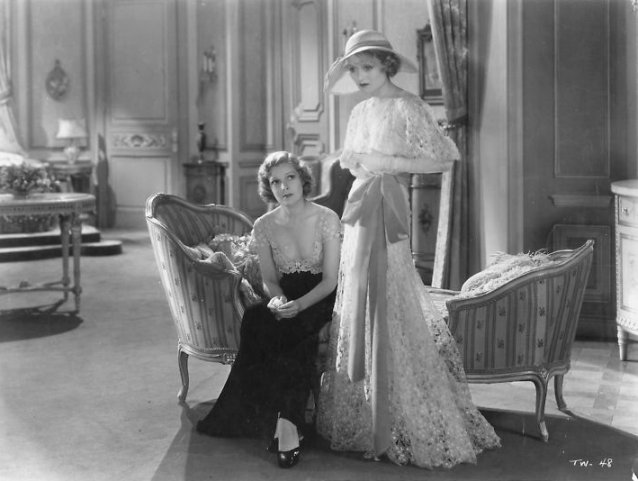
Two Alone****1/2 1934
http://www.san.beck.org/MM/1934/TwoAlone.html
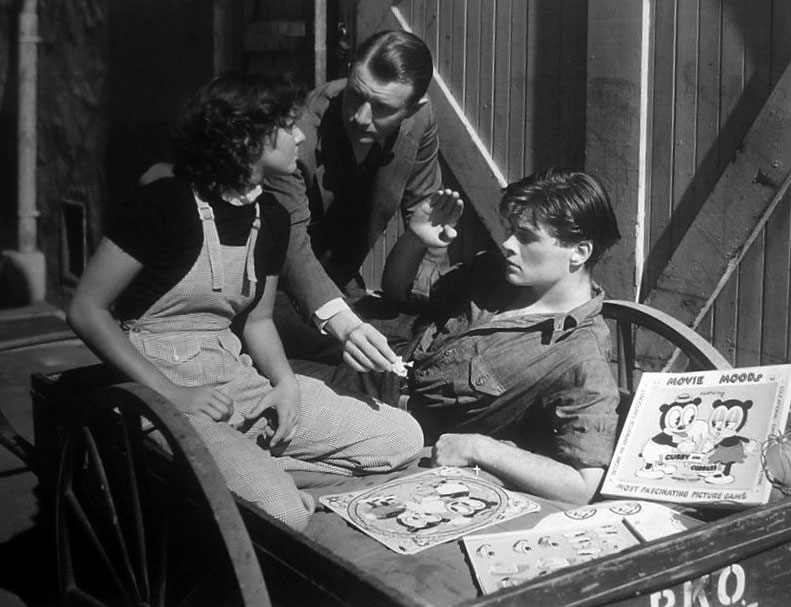
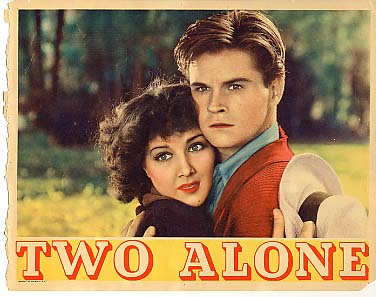
After her only friend, farm hand George Marshall, quits his job because Slag, her foster father, is a brutal, stingy employer, Mazie aides Adam Larson,
an escapee from a reform school. When Slag catches Mazie with Adam, he threatens to turn the teenager over to the sheriff, but then decides to make
him work on the farm for no pay. A few months later, Adam, who was convicted for the attempted murder of his abusive father, has fallen in love with
Mazie and asks Slag for her hand in marriage. Because he desires the pretty Mazie for himself, Slag angrily refuses Adam's request, stating that he is
too young to marry, and forbids him from further involvement with his foster daughter. Terrified by Slag's sexual interest in her, however, Mazie
agrees to run away with Adam that night. On their way to find refuge with George, the couple stops at a carnival, unaware that George, who has found
out that he is Mazie's real father, is headed for the Slag farm. After Mazie and Adam learn that George has left, they camp out in an open field and
pledge their undying love. The next morning, Slag finds them on the road and forces them back to hard labor on the farm. A few months later, Mazie
sneaks into Adam's room to tell him that she is pregnant, and is caught by Slag, who then fights with Adam. During the melee, Adam throws Slag
down a set of stairs, and Slag telephones the sheriff. When Mazie begs for Adam's freedom, he deduces her condition and, furious with jealousy, tells
her that a baby will only condemn Adam to greater punishment. Filled with guilt, Mazie throws herself into a well, just as George, who had received a
letter from Adam, arrives at the farm. George rescues Mazie from drowning, then tells the sheriff and Slag that Mazie is his daughter. Sympathetic to
Adam's situation, the sheriff allows him to marry Mazie before arresting him and assures the bride that her groom will be returning soon.
Two Seconds*** 1932
VIDEO
http://www.tcm.com/mediaroom/video/30365/Two-Seconds-Original-Trailer-.html
http://en.wikipedia.org/wiki/Two_Seconds
Or… not. In Two Seconds, the hardship of the Depression doesn't bring out the nobility of the characters. It brings out fear,
greed, lust, despair, and ultimately madness. Two Seconds also features a hero who’s on his way to the Chair — John Allen.
A crowd of reporters and jail officials has gathered to watch the execution, and one of them comments that after they flip
the switch, Allen will have two seconds of consciousness left. Gosh, says one, in those two seconds he’ll remember everything
about what brought him to this moment. They flip the switch. And the rest of the movie is those two seconds.
The hum of the electric chair blends into the noise of a riveter. Two men are standing on the girders of an unfinished skyscraper.
It’s John and his best friend Bud, played by Edward G. Robinson and Preston Foster. They’re a couple of young guys who are
making good money in the Depression, but only because they’re doing this frightening and dangerous work. Bud is a hedonist
who blows the money on gambling and women, but John is an idealist. He has big dreams for himself, and he’s picky about
women. The truth is he’s the runt who gets stuck with his studly friend’s castoffs, and as the movie proceeds like dirty water
swirling down a drain, his aspirations and airs of superiority get thrown back in his face in breathtakingly and increasingly cruel
ways.
At first, Preston Foster is slightly hard to take as Bud. He had recently played the role on stage, and he’s still a bit “big” for
the movie. I always thought Foster was a lousy actor until I found out that he was also a guitarist and composer; he wrote the
Muddy Waters classic “Got My Mojo Working,” which makes him a hero in my book. Essentially he was a proto-beatnik, and maybe too hip to take seriously the cardboard roles that usually came his way. Despite his overemphasis, he’s intensely likeable as Bud. His love for John is the motor of the movie and one of its few grace notes.
The other grace note is Edward G. Robinson. You wouldn’t think he could play John Allen, who is a muscular, working class,
somewhat stupid young guy who gets in way over his head. But Robinson was one of the most skillful of all performers, and
he does much more than play the character. He takes you on a journey. I can’t improve on Mick LaSalle’s description, in his
book Dangerous Men, of Robinson’s final speech as he’s being sentenced to die. “This is Robinson, great American actor, in
the most intense minutes of his film career. He endows the speech with the shape and size of melodrama but maintains the
precision of a ballet dancer. Remaining true to his core and so in control, he goes to a deep place, without fear, hesitation,
or bluffing, using himself unflinchingly. No movie star ever looked like Robinson, and he’s beautiful.”
I don’t want to say any more about the plot. We know from the beginning that Robinson is going to fry. The drama is seeing
the steps by which his ordinary life, and ultimately his mind, comes completely unraveled. As with One Way Passage, the
sense of fate closing like a trap is clearly a metaphor for the Depression, and the feeling that ordinary hard times were
deepening into something more existentially threatening and terrifying. The movie itself changes from stark realism to
near-abstract expressionism. And the ending hits you with the force of a brick hurled in your face. This nightmare offers no
salvation, except the sweetness and humanity of Robinson’s art. That’s more than enough.
Robinson pulls out all the stops as a half crazed, frustrated, angry man, whose pride and self-respect has been orn from him.
And his final statement, from a man who has shown self awareness and rehabilitation, defies the premise of capital punishment
under the cirmstances. Profound and empathy provoking.
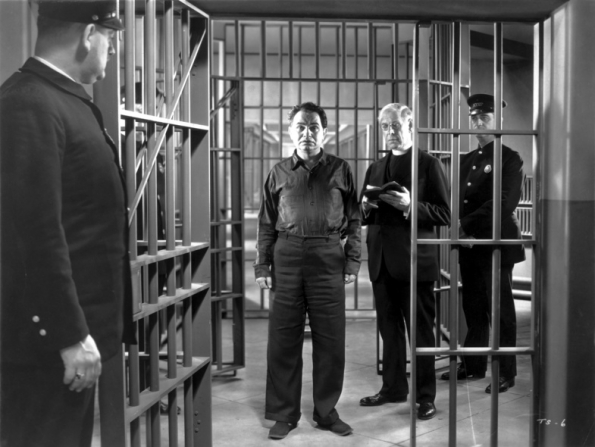
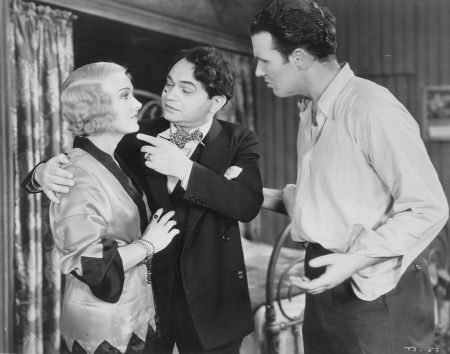
50.
Under Capricorn***1/2 1947
VIDEO
http://www.youtube.com/watch?v=suNURRbjwiQ
http://www.theguardian.com/film/filmblog/2012/aug/14/my-favourite-hitchcock-under-capricorn
In 1831, a new governor is sent to the prison colony in Sydney, the capital of New South Wales, Australia. Irishman Charles Adare accompanies the
governor, who is his second cousin, and plans to make his fortune there. Soon after Charles' arrival, banker Cedric Potter introduces him to Sam
Flusky, an emancipated prisoner who has become a wealthy landowner. Although Flusky's name is familiar to Charles, he cannot place it and questions
Potter, who reminds him that in Australia, no one talks about the past. Flusky, who does recognize Charles, offers him a business deal. After explaining
that he has bought all the land he is allowed, Flusky asks Charles to purchase a plot of land, which he will then buy from him at a profit. Charles
accepts Flusky's dinner invitation, even though Potter has warned him against it. Later, the governor also asks Charles to turn down the invitation, as
it could cause an awkward situation. Flusky has invited several other couples to dinner to meet Charles, but as the appointed hour approaches, only
the men arrive. After all make excuses for their wives, Flusky states that his wife, Lady Henrietta, is also ill, but as the dinner begins, the beautiful,
but drunken Hattie joins the men unexpectedly. When Charles sees her, he realizes that she is an old childhood friend from Ireland. Hattie is too ill to
stay at the table, but when she returns to her room, she screams hysterically, claiming to see a rat. The other men believe that she is suffering from
hallucinations, but Charles takes her seriously and shoots into the fireplace, after which, Hattie is calmer. Later, Flusky reminds Charles that he was
the groom on Hattie's family estate, but after they were married, her family had him transported. She sold her things and followed him. Flusky admits
that he invited Charles in the hope that his presence would entice society women to the house. Later, learning of Charles's involvement with Flusky,
the governor insists that he renege on their deal and reveals that Flusky murdered Hattie's brother. Charles refuses to follow the governor's orders
and moves into the Flusky house. He then tries to help Hattie recover. Milly, the housekeeper, watches him suspiciously and attempts to undermine
his efforts. Later, Milly complains to Flusky, who tells her to leave if she is unhappy. At first Hattie is devastated by Milly's departure, but with Charles's
encouragement, she stops drinking and begins to take charge of the house. One evening, while Charles and Hattie are at a ball, Milly returns to the
house and plants jealous suspicions in Flusky's mind. Flusky appears at the ball and creates a disturbance. Later, when Charles suggests that Hattie
return to Ireland, she responds by recalling her early love for Flusky. Her story makes it clear that she killed her brother and allowed Flusky to take
the blame. Later, Flusky accuses Hattie of having an affair and orders Charles to leave. Charles, who is not a horseman, causes an injury to Flusky's
favorite horse. Flusky is forced to shoot the horse and then accidentally shoots Charles. While Charles hovers between life and death, the governor
threatens to send Flusky back to prison. To save him, Hattie confesses that she shot her brother, and the governor replies that if this is true, he will
have to send her to Ireland to stand trial. Flusky misunderstands her motivation and believes that she wants to return to Ireland with Charles, and
when Charles recovers from his injuries, he is astounded to learn of Hattie's confession. Later, Milly, who is in love with Flusky, tries to drive Hattie
insane and then slips a fatal dose of sleeping potion in her wine. Hattie sees her do it and calls for Flusky, who finally realizes Milly's true nature. When
the governor's men arrive at the Flusky house and ask Flusky to corroborate Hattie's statement, he refuses, having finally realized that Hattie loves
him. In the morning, Flusky is brought to Sydney to be returned to prison, and Hattie begs Charles to explain that the shooting was an accident. After
he does so, Flusky is released. Together, Flusky and Hattie bid farewell to Charles, who, because he loves Hattie, is returning to Ireland.
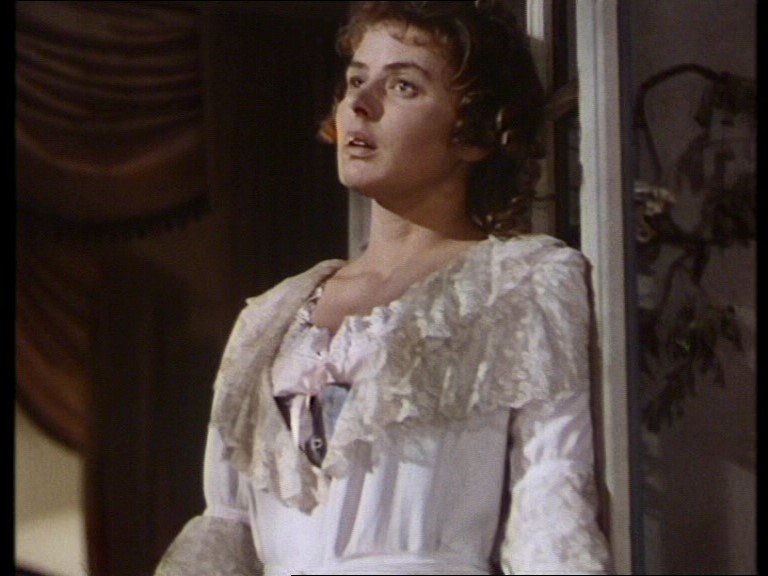
Untouchables, The**** 1987
http://en.wikipedia.org/wiki/The_Untouchables_%28film%29
A gangster film that is not a gangster film. This film has a handful of standout scenes, but these great
moments do not upset the rhythm of a motion picture that hovers over various themes. One is the
theme of brotherhood between Ness and his four hand-picked lawmen; each one unique but not
outrageous. We are often led to believe that gangsters only kill themselves off, so there is no need to
worry about "wacking". This film warns us about very much the opposite, brilliantly and suspensefully
portrayed by the great staircase scene, which uses repetition to create tension and symbolism.
The riveting scene in which Jim Malone (Sean Connery) is brutally ambushed at his home, is also one of
the most dramatic and strangely touching murder scenes put on film.
Ness is also humanly portrayed (Kevin Costner), as he moves his family about, under the constant threat
of being murdered by Capone's henchmen.
Crossing genres and boundaries, Brian De Palma's classic Eighties film has all the style and quality that audiences have come to
expect from films about gangsters. This time, however, the focus is on the men who brought them down, not the bad guys, as
was the case in The Godfather and GoodFellas.
Based on a poor Fifties TV show that had all the grace of Dude, Where's My Car?, The Untouchables comes from a subtle script
by David Mamet. De Palma's previous two films had deflated quickly at the box office and he needed a hit, which doesn't mean
he was willing to remove the harsh reality. He deals with death, that of children and heroes, as comfortably as he does
with Eliot Ness's (Kevin Costner) brush with lawlessness. Throughout the moral trials of our central characters, he handles his
camera like a master, combining zooms and split focus amongst other techniques to communicate his message as attractively
as possible, yet never trigger-happy with special effects.
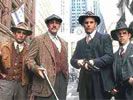
De Palma's skill in drifting in and out of Western and gangster movie styles is commendable, especially with Costner
(previously of Silverado) in the lead. The casting is perfect and when viewed in context, a brave move, as Costner was far
from the star then that he became in the Nineties. Sean Connery is also an interesting choice, playing the beat cop Malone,
who remains a mythical figure throughout. Andy Garcia, as the hot shot George Stone, is a joy to behold and Charles Martin
Smith, although the least successful of the four, brings the weight of the film's comedy to his role as Oscar Wallace.
The visuals are textually dense to a Spielbergian extreme, the appearance of the glamorous and nameless young woman before
each of the film's deaths juxtaposing the ugly reality of upholding the law. Contrast is also used to underline this same truth in
the scenes with Robert De Niro, as Al Capone, where his Champagne-quaffing glamour offsets Ness's rigorous simplicity .
The descent of Ness into moral ambiguity is a level of character development I long to see executed with such patient skill in
today's cinematic offerings. The band of brothers in The Untouchables is one soldered with iron. Not only are we involved in
their bond, but have our anxiety pushed to the fullest extreme in the breathtaking and seemingly endless staircase
scene that tips its hat to Battleship Potemkin.
There is little possibility that The Untouchables could be improved, from camerawork to the wonderfully powerful and uplifting
Ennio Morricone score that inspires a feeling of awe. It is De Palma's best film and one of the decade's greatest.
Almost untouchable.
Usual Suspects, The**** 1995
http://en.wikipedia.org/wiki/The_Usual_Suspects
VIDEO
http://www.youtube.com/watch?v=oiXdPolca5w
Near the end of The Usual Suspects, Kevin Spacey, in his Oscar-winning performance as crippled con man Roger "Verbal" Kint, says, "The greatest trick the
Devil ever pulled was convincing the world he didn't exist." This may be the key line in this story; the farther along the movie goes, the more one realizes that
not everything is quite what it seems, and what began as a conventional whodunit turns into something quite different. A massive explosion rips through a
ship in a San Pedro, CA, harbor, leaving 27 men dead, the lone survivor horribly burned, and 91 million dollars' worth of cocaine, believed to be on board,
mysteriously missing. Police detective Dave Kujan (Chazz Palminteri) soon brings in the only witness and key suspect, "Verbal" Kint. Kint's nickname stems
from his inability to keep his mouth shut, and he recounts the events that led to the disaster. Five days earlier, a truckload of gun parts was hijacked in Queens,
NY, and five men were brought in as suspects: Kint, hot-headed hipster thief McManus (Stephen Baldwin), ill-tempered thug Hockney (Kevin Pollak), flashy wise
guy Fenster (Benicio Del Toro), and Keaton (Gabriel Byrne), a cop gone bad now trying to go straight in the restaurant business. While in stir, someone
suggests that they should pull a job together, and Kint hatches a plan for a simple and lucrative jewel heist. Despite Keaton's misgivings, the five men pull off
the robbery without a hitch and fly to Los Angeles to fence the loot. Their customer asks if they'd be interested in pulling a quick job while out West; the men
agree, but the robbery goes horribly wrong and they soon find themselves visited by Kobayashi (Pete Postlethwaite), who represents a criminal mastermind
named Keyser Soze. Soze's violent reputation is so infamous that he's said to have responded to a threat to murder his family by killing them himself, just to
prove that he feared no one. When Kobayashi passes along a heist proposed by Soze that sounds like suicide, the men feel that they have little choice
but to agree. ~ Mark Deming, Rovi

3.
